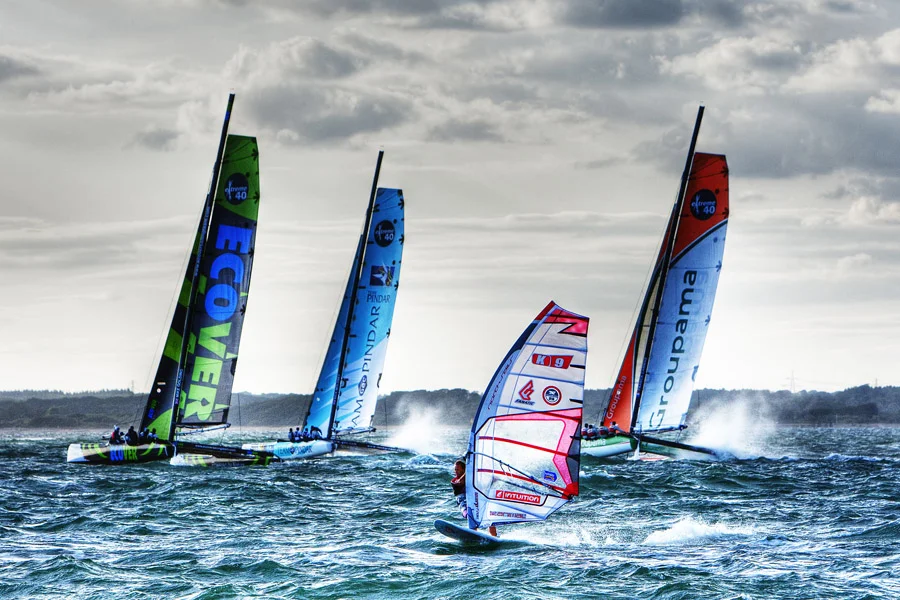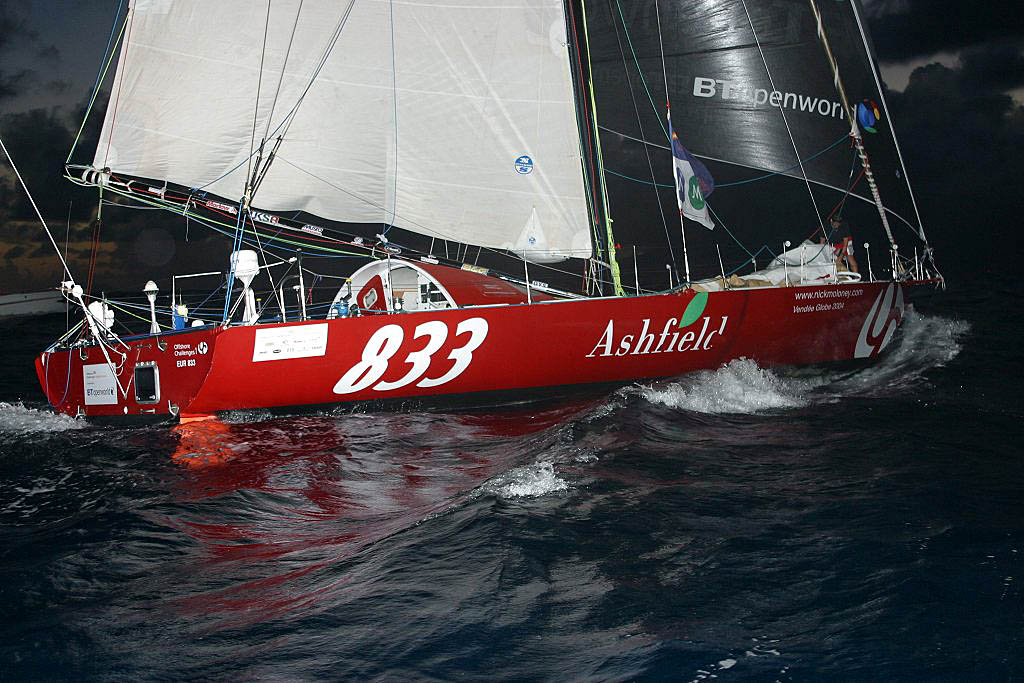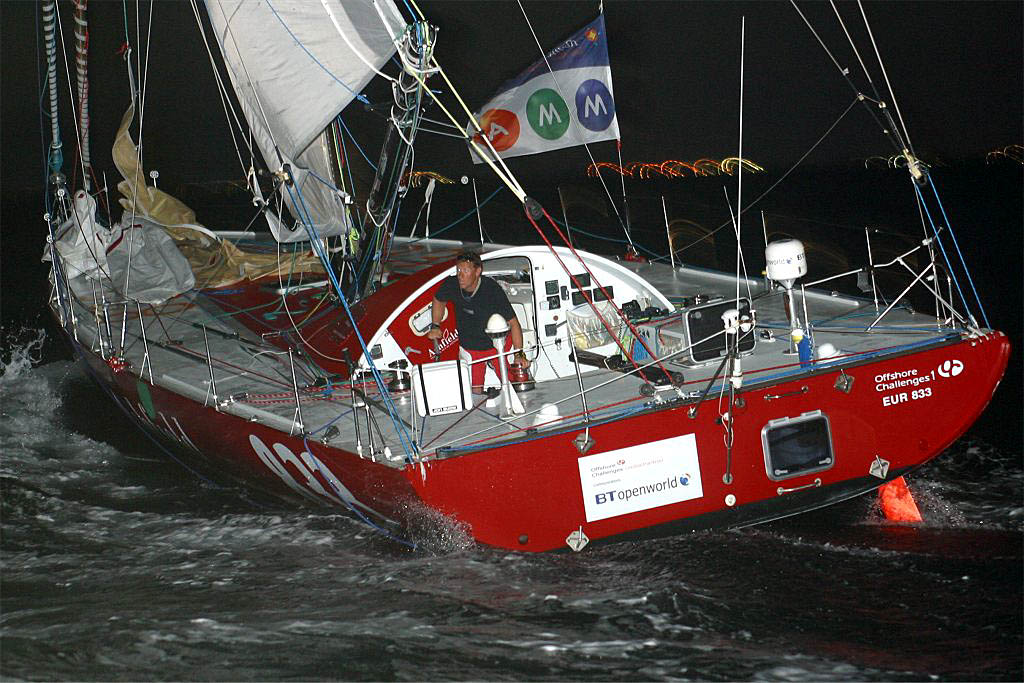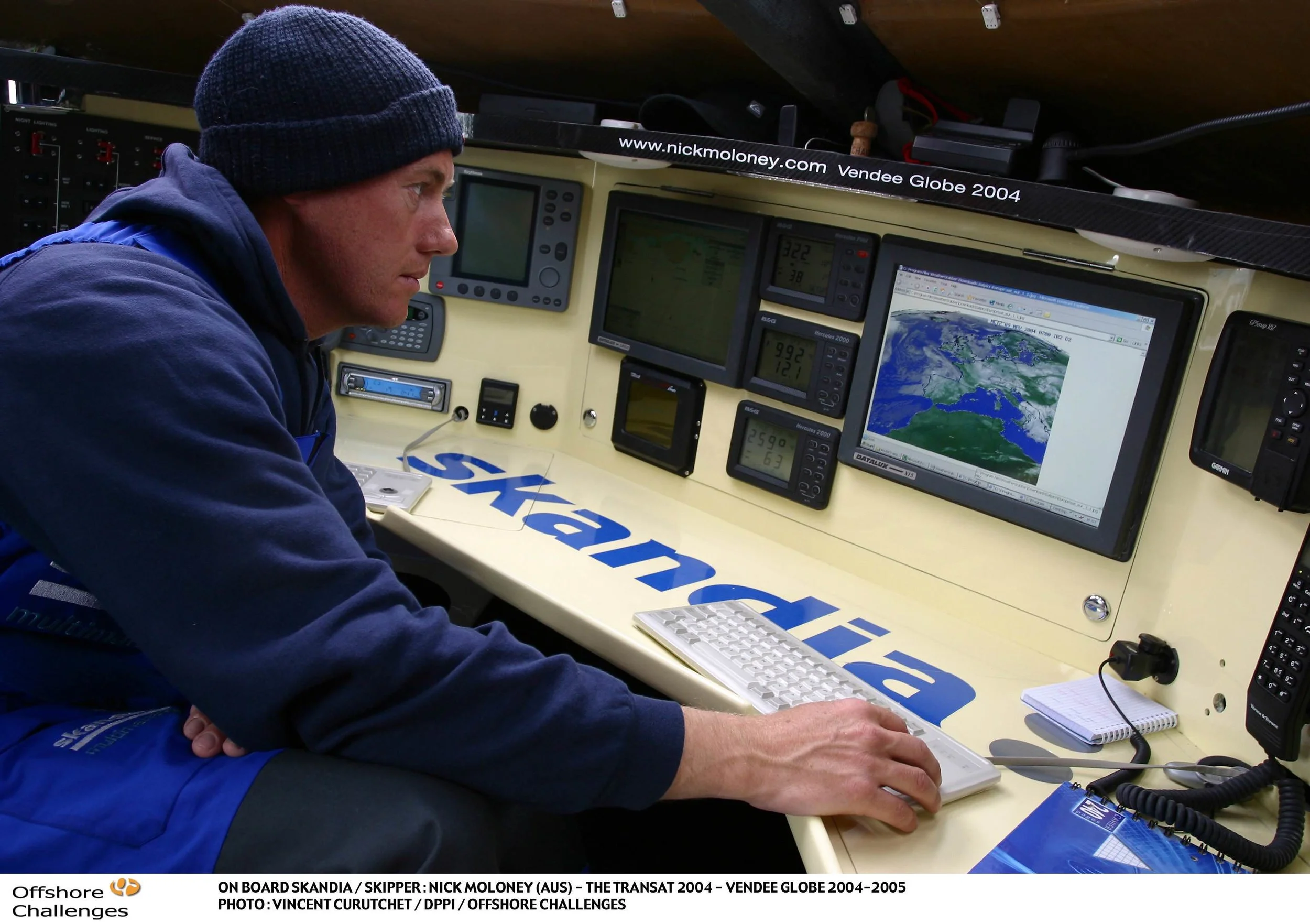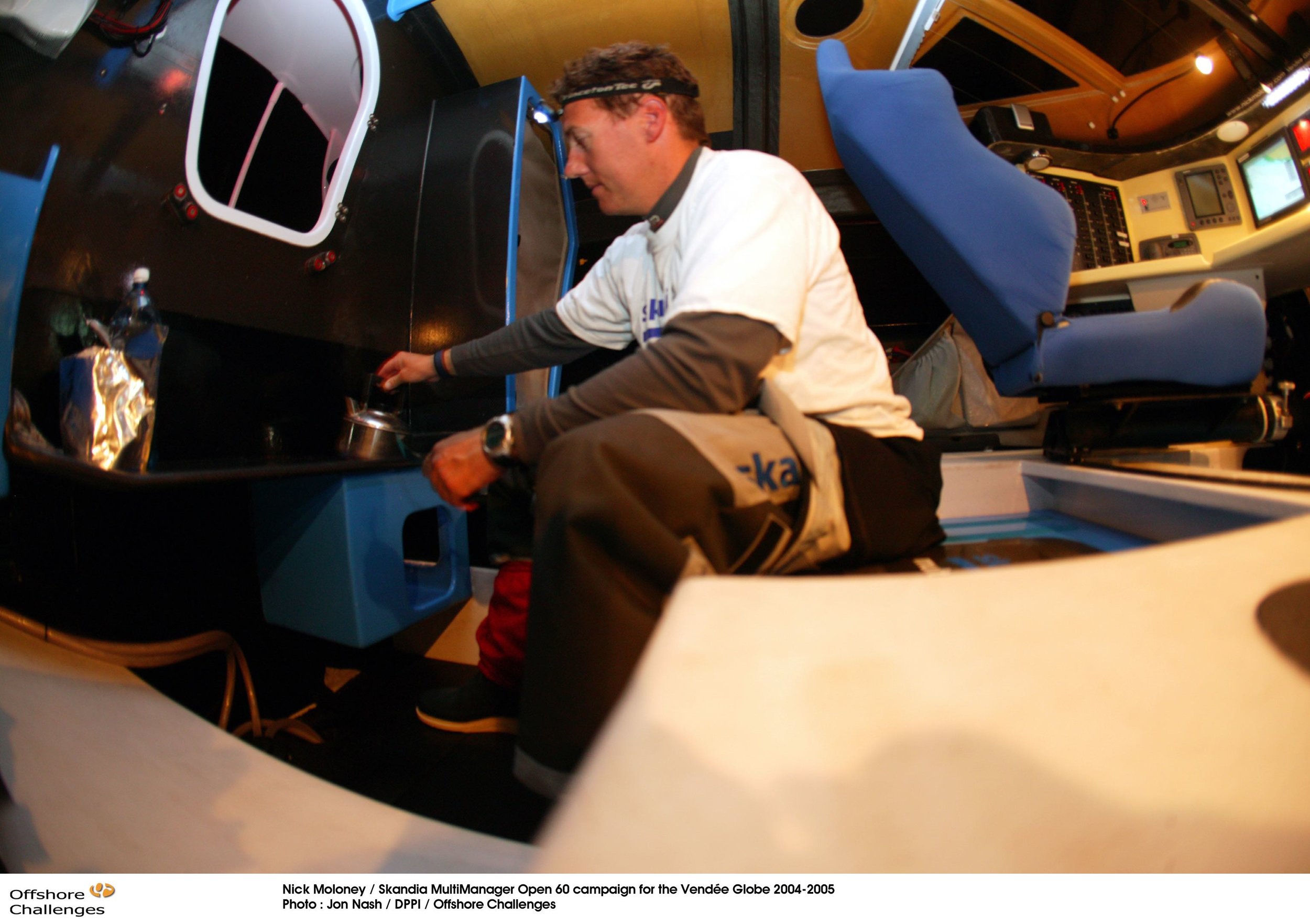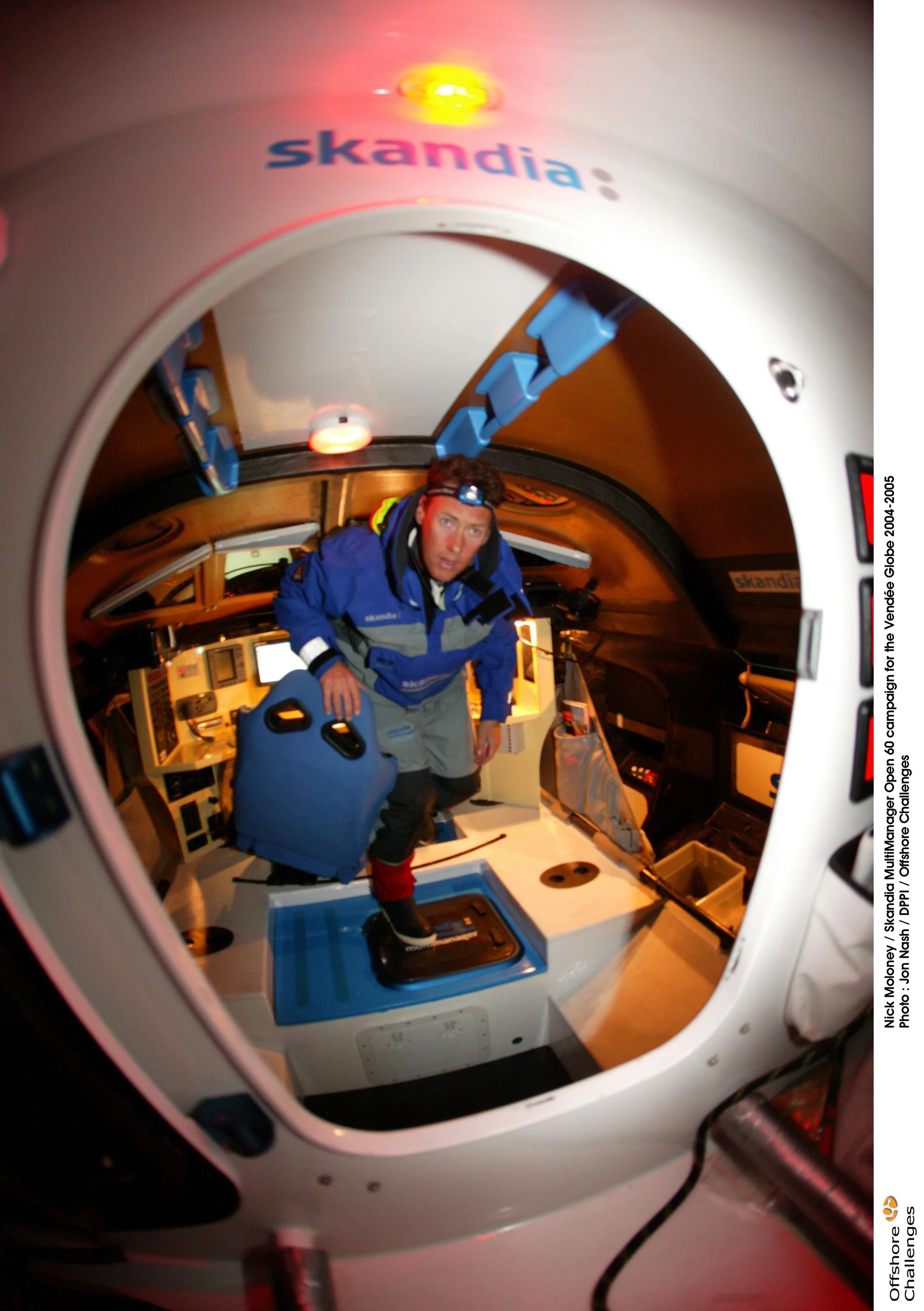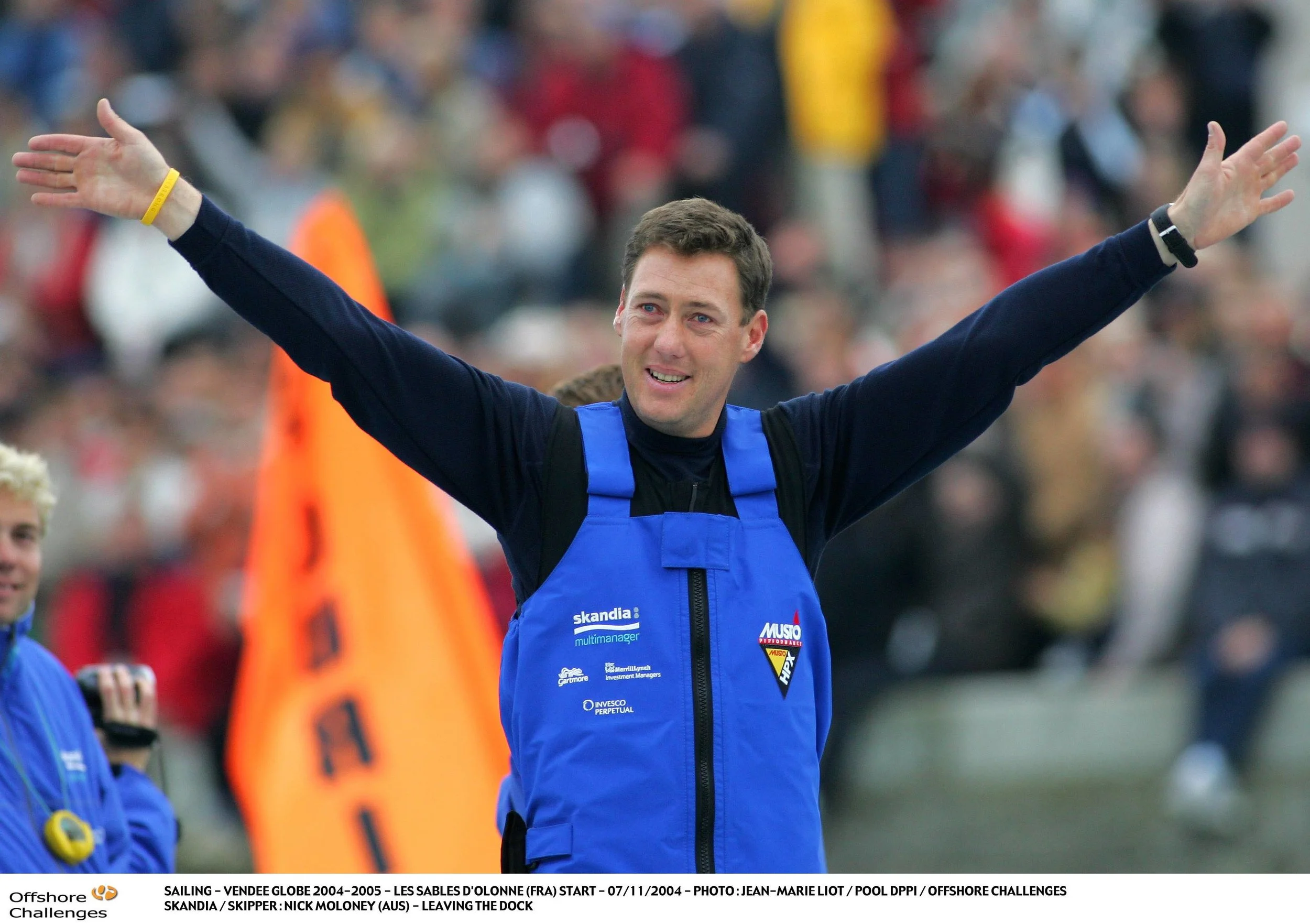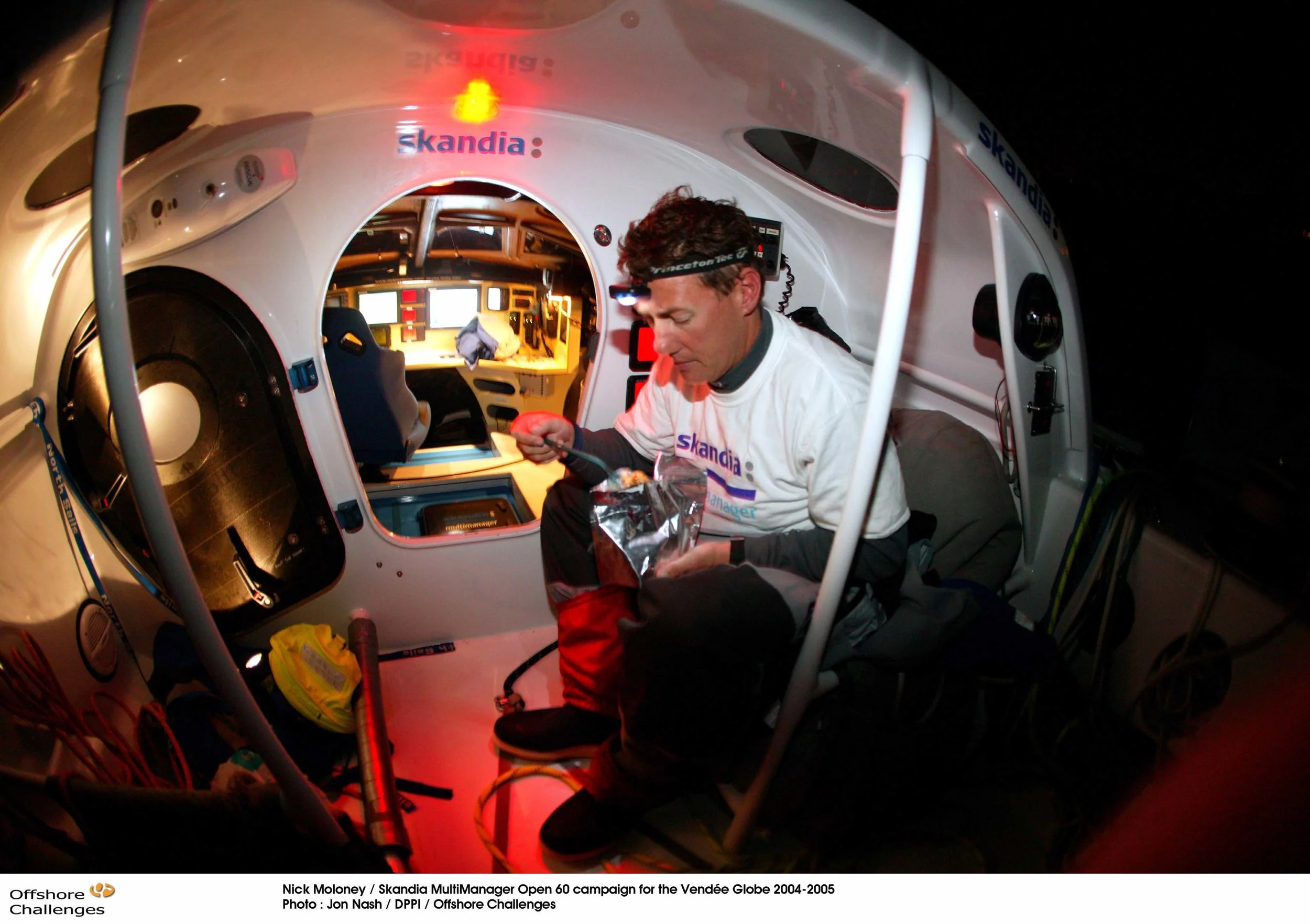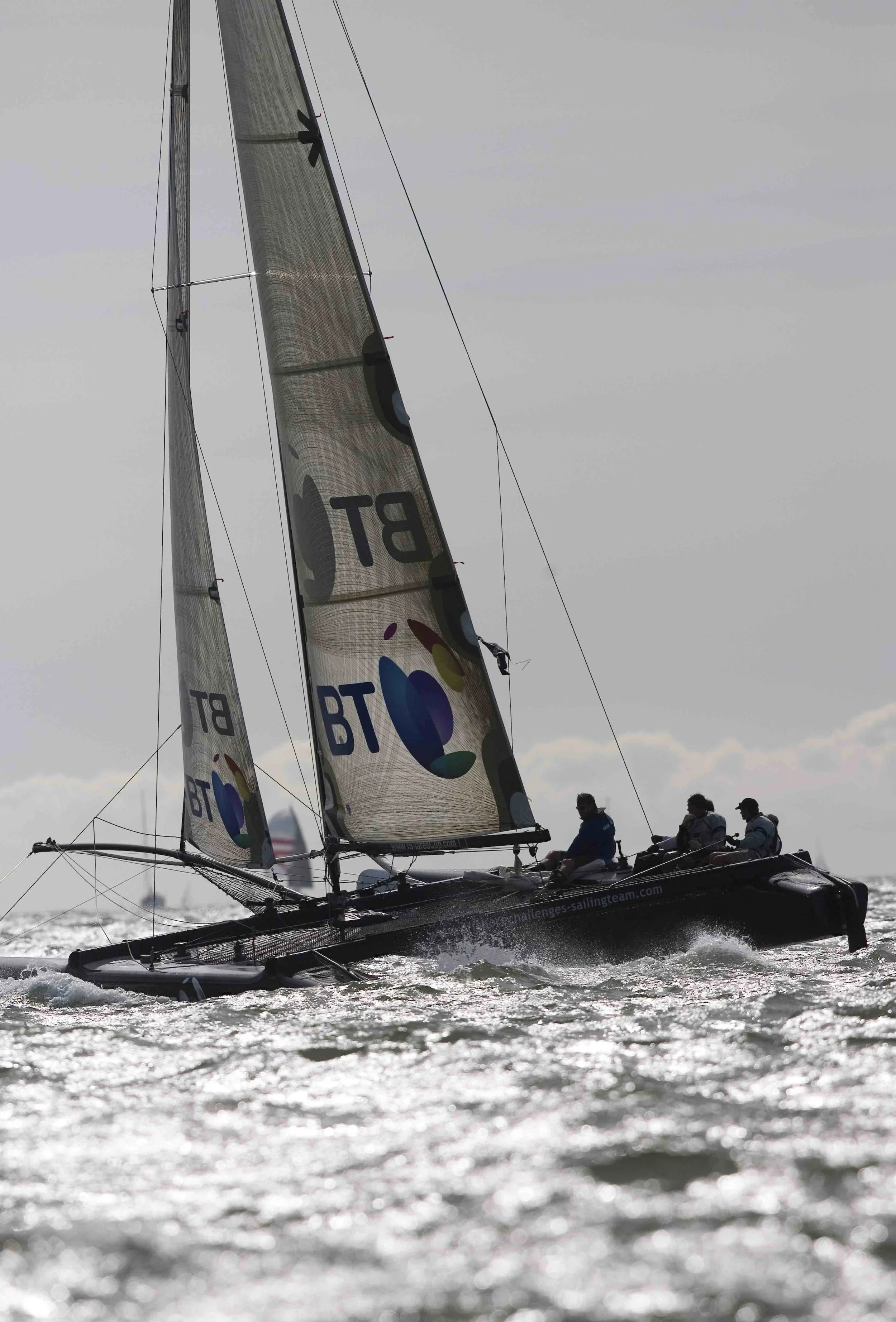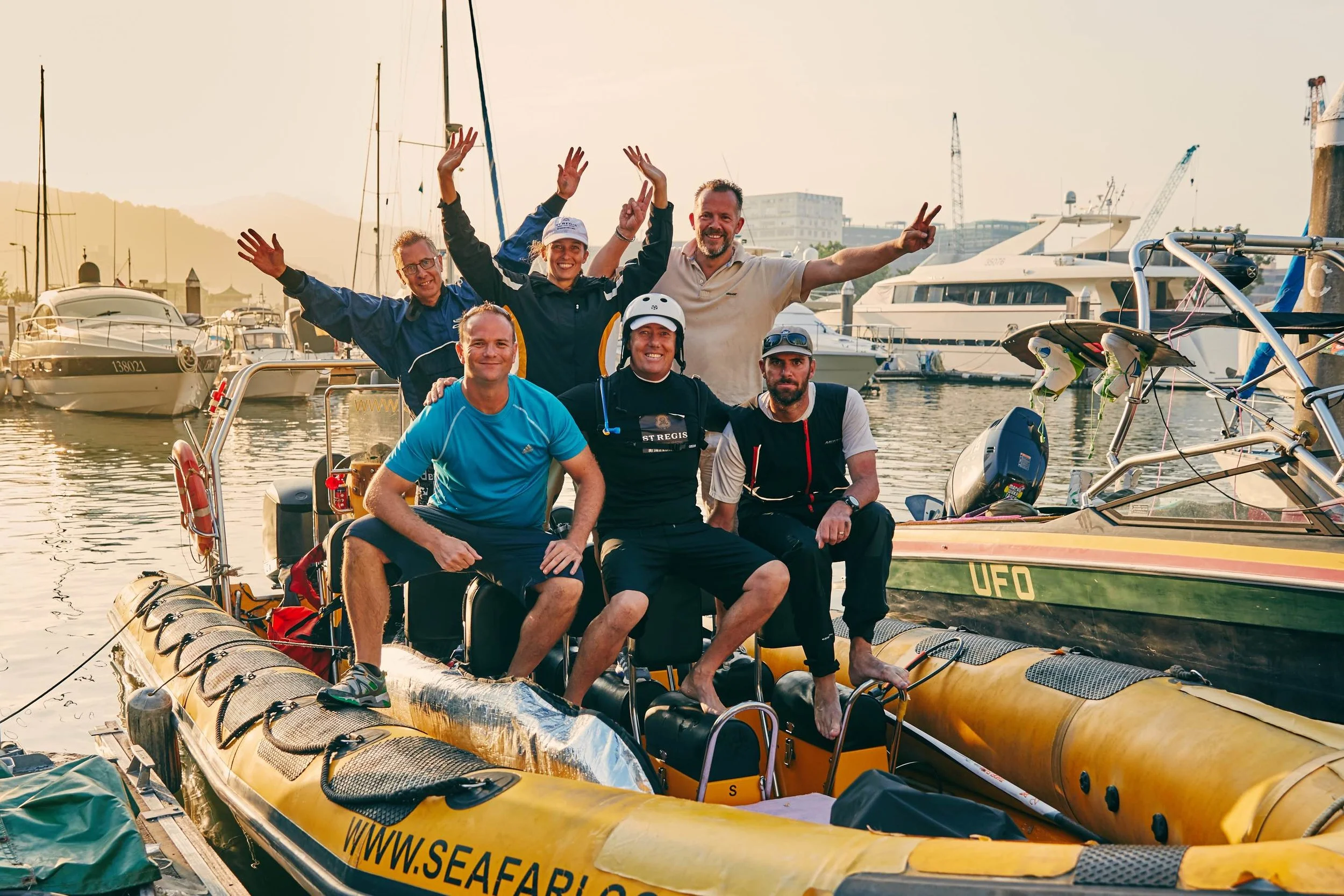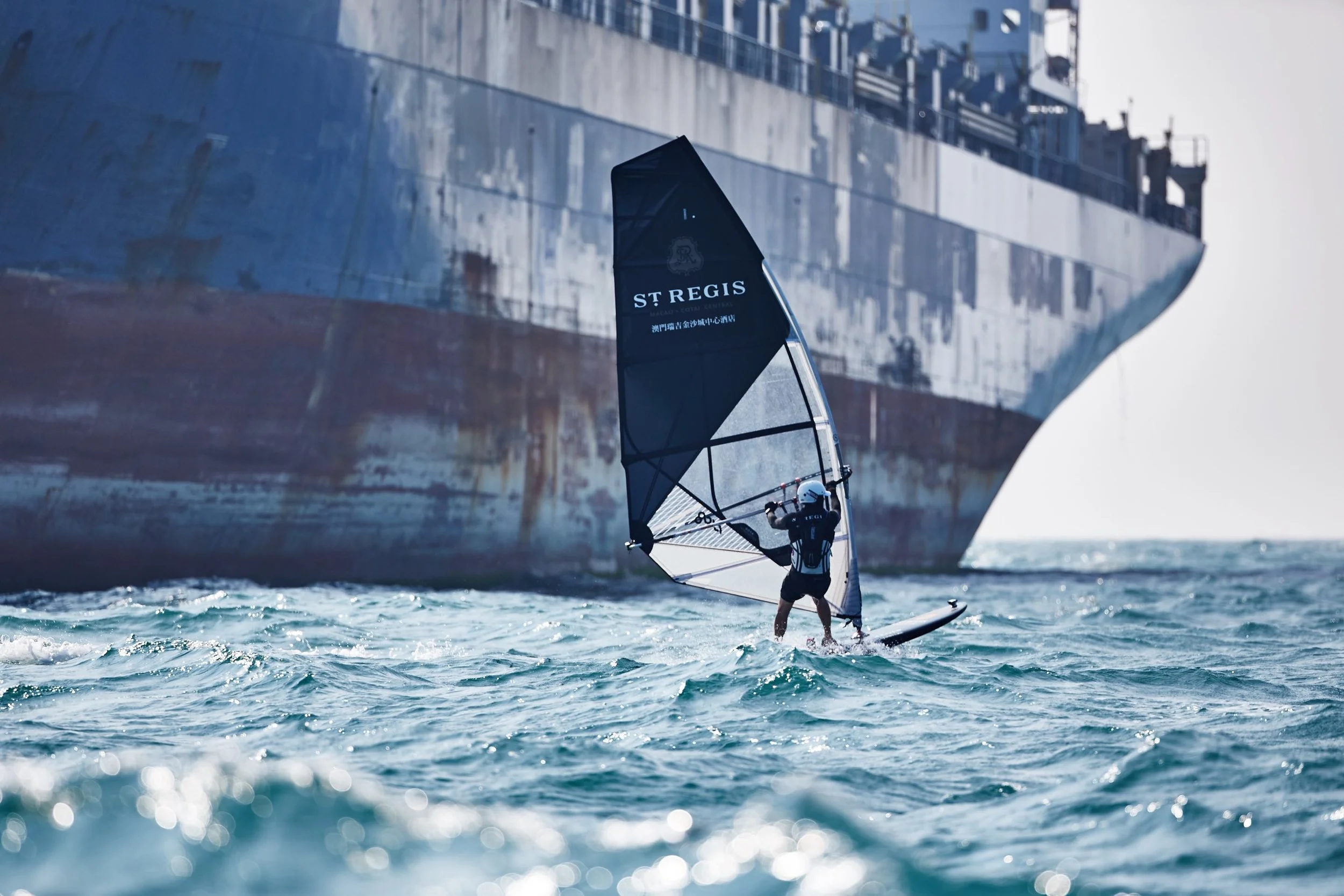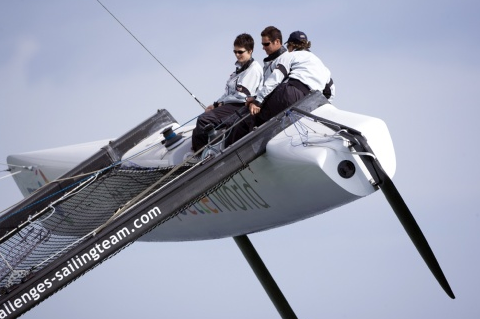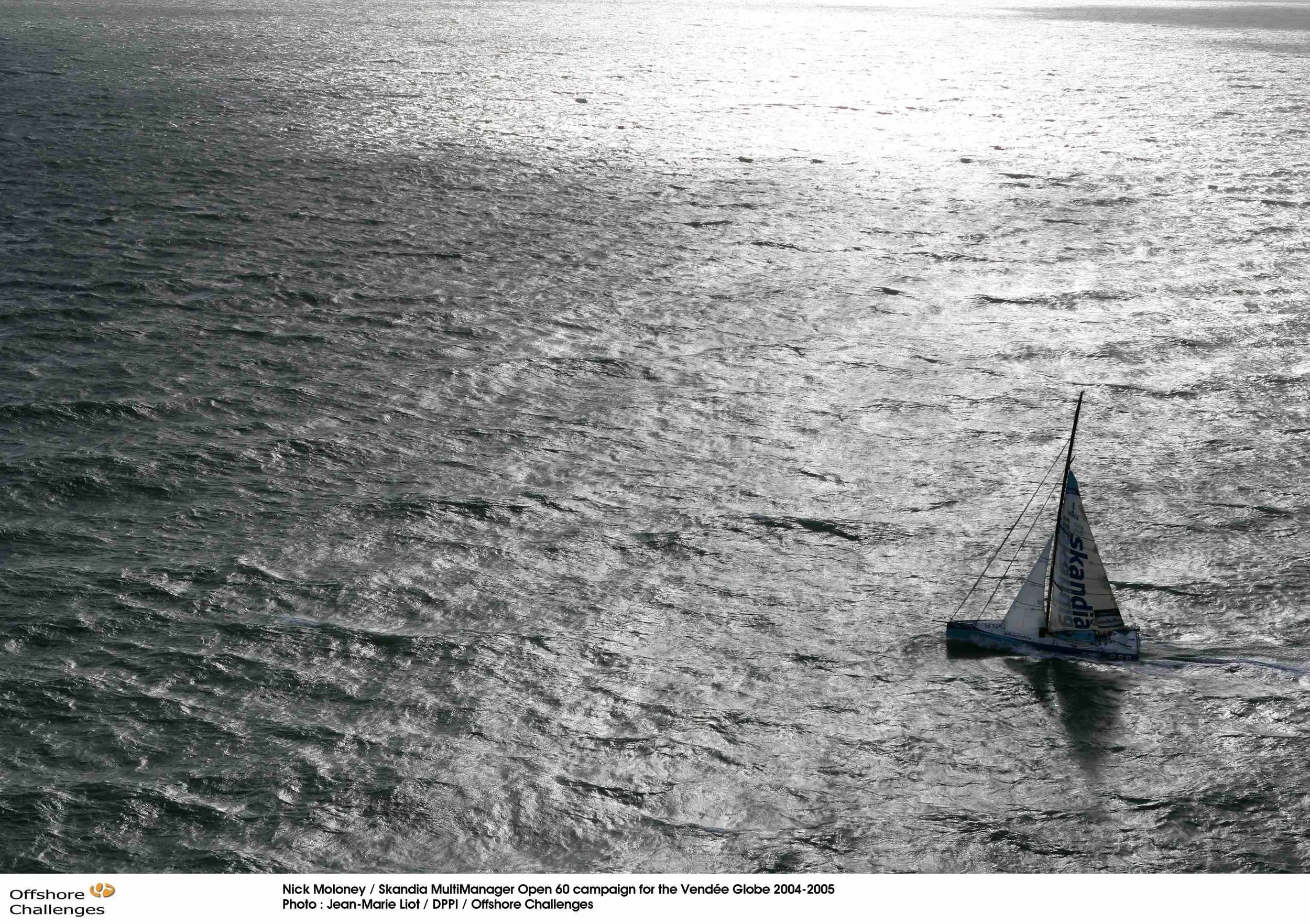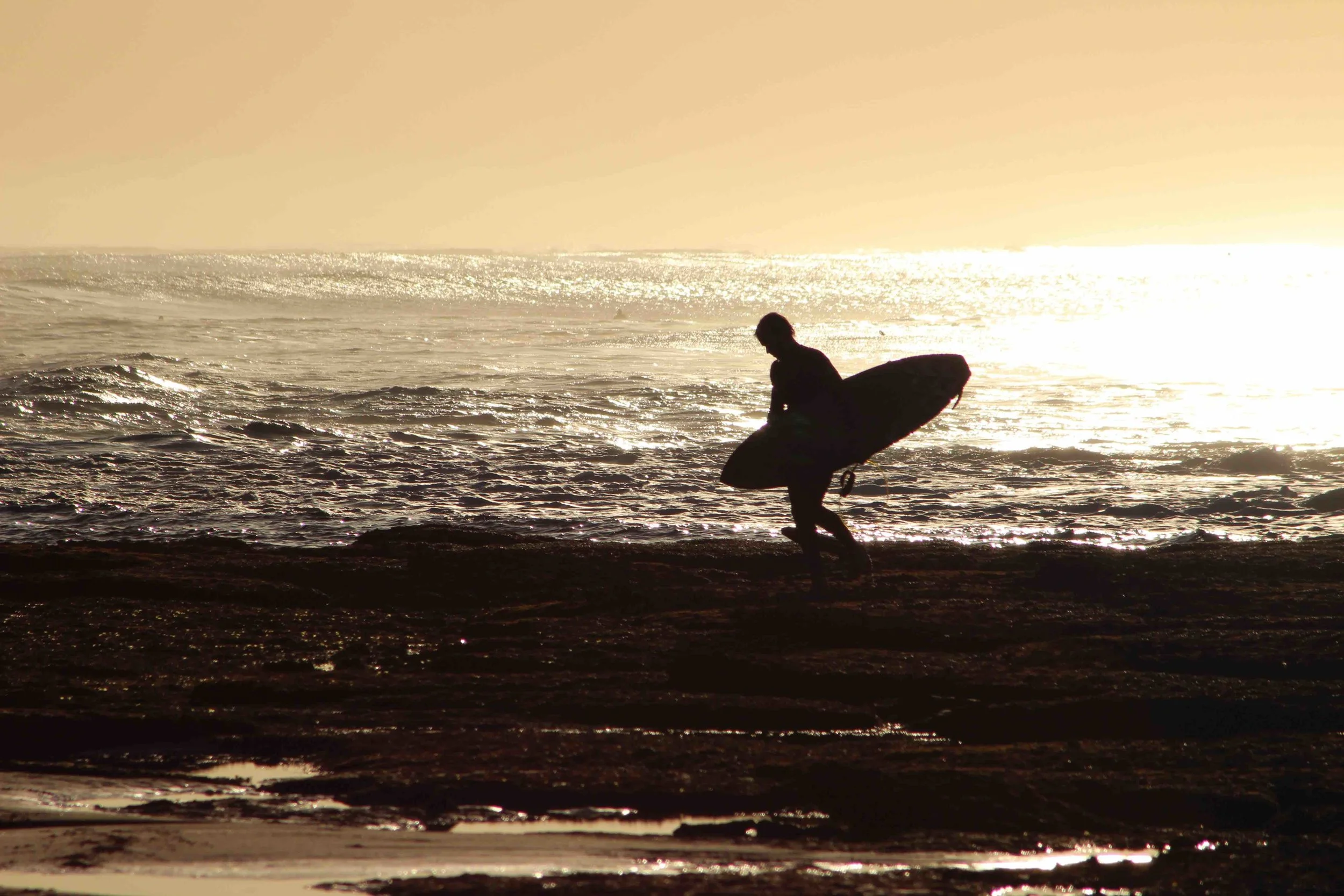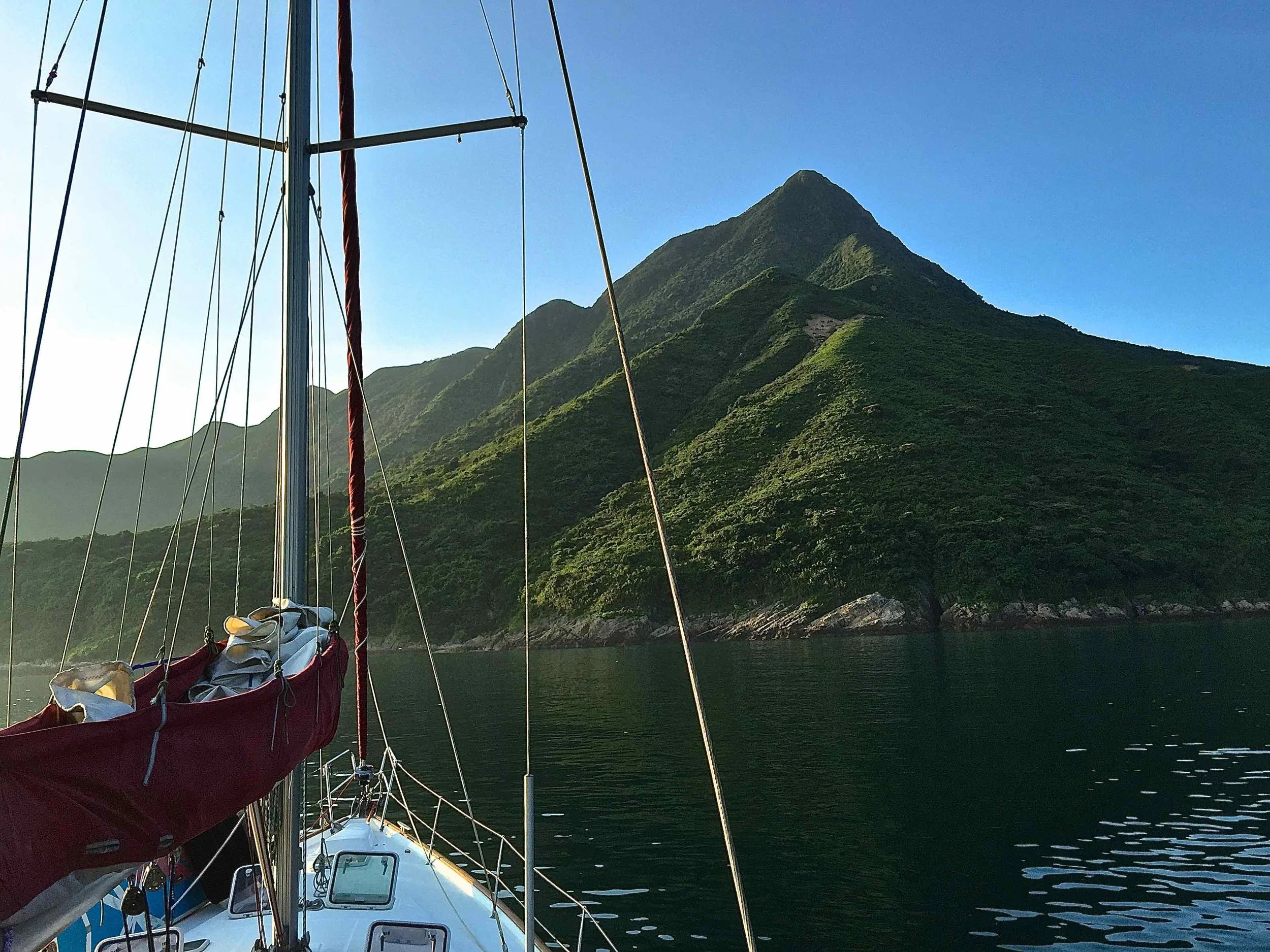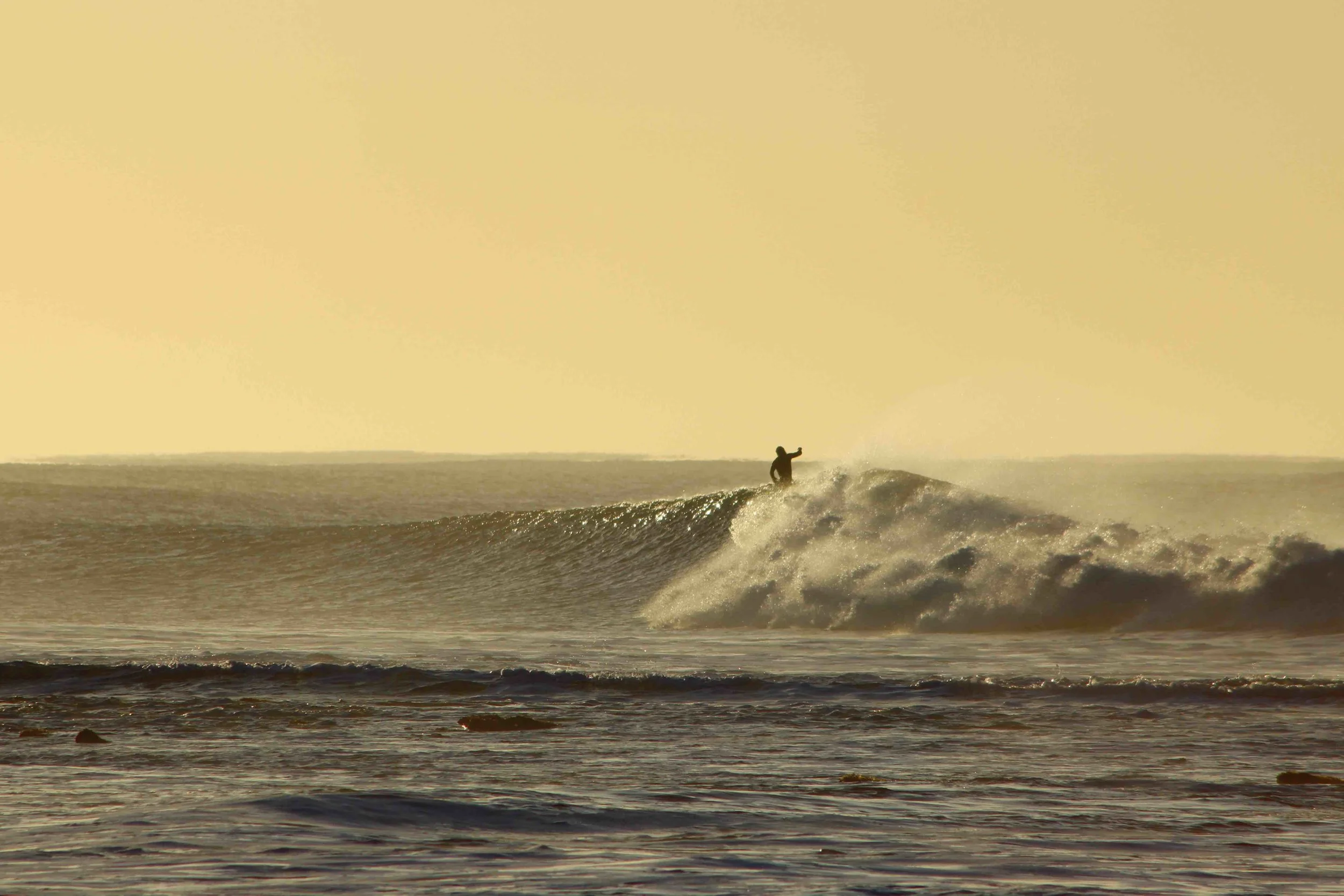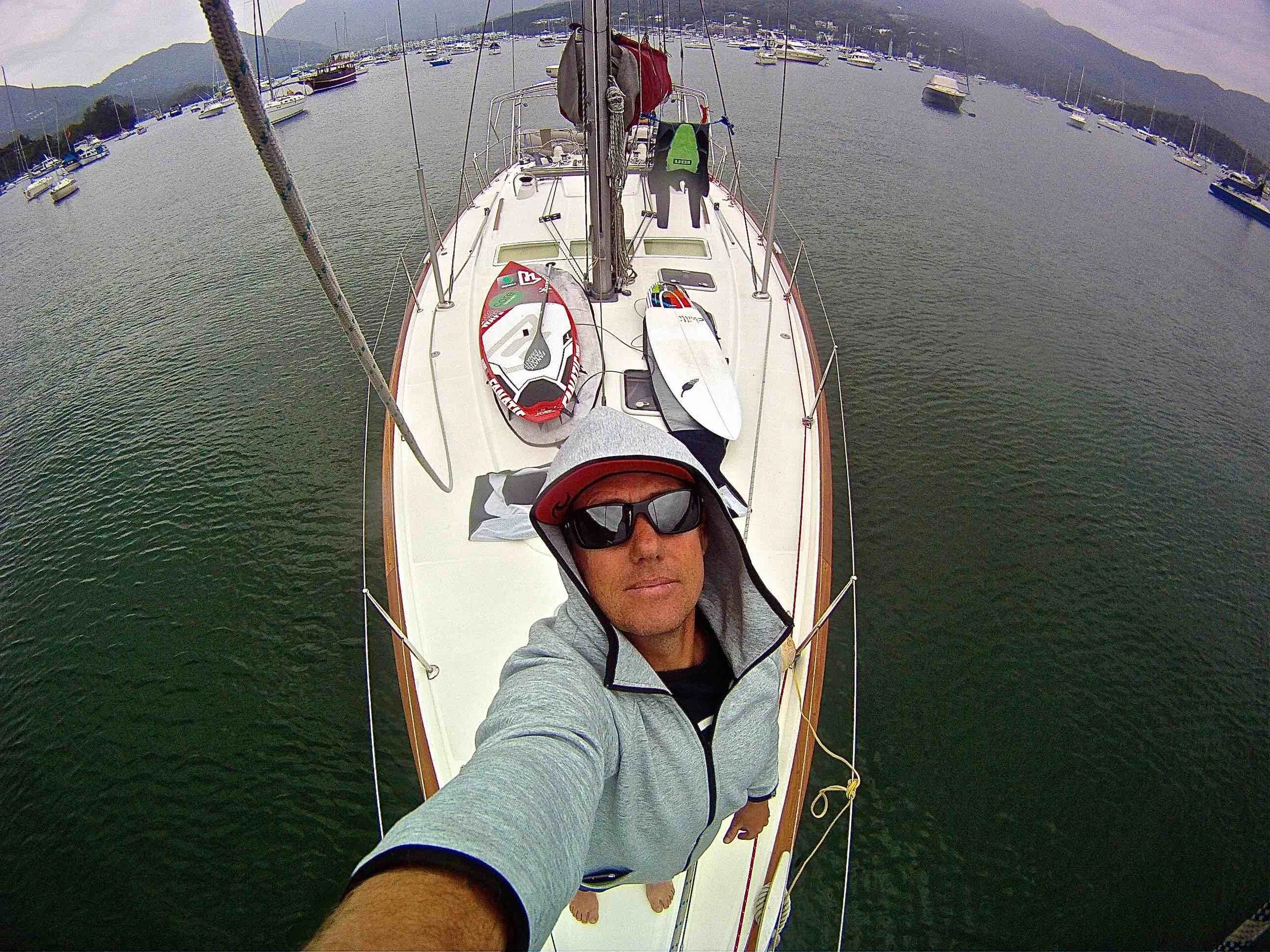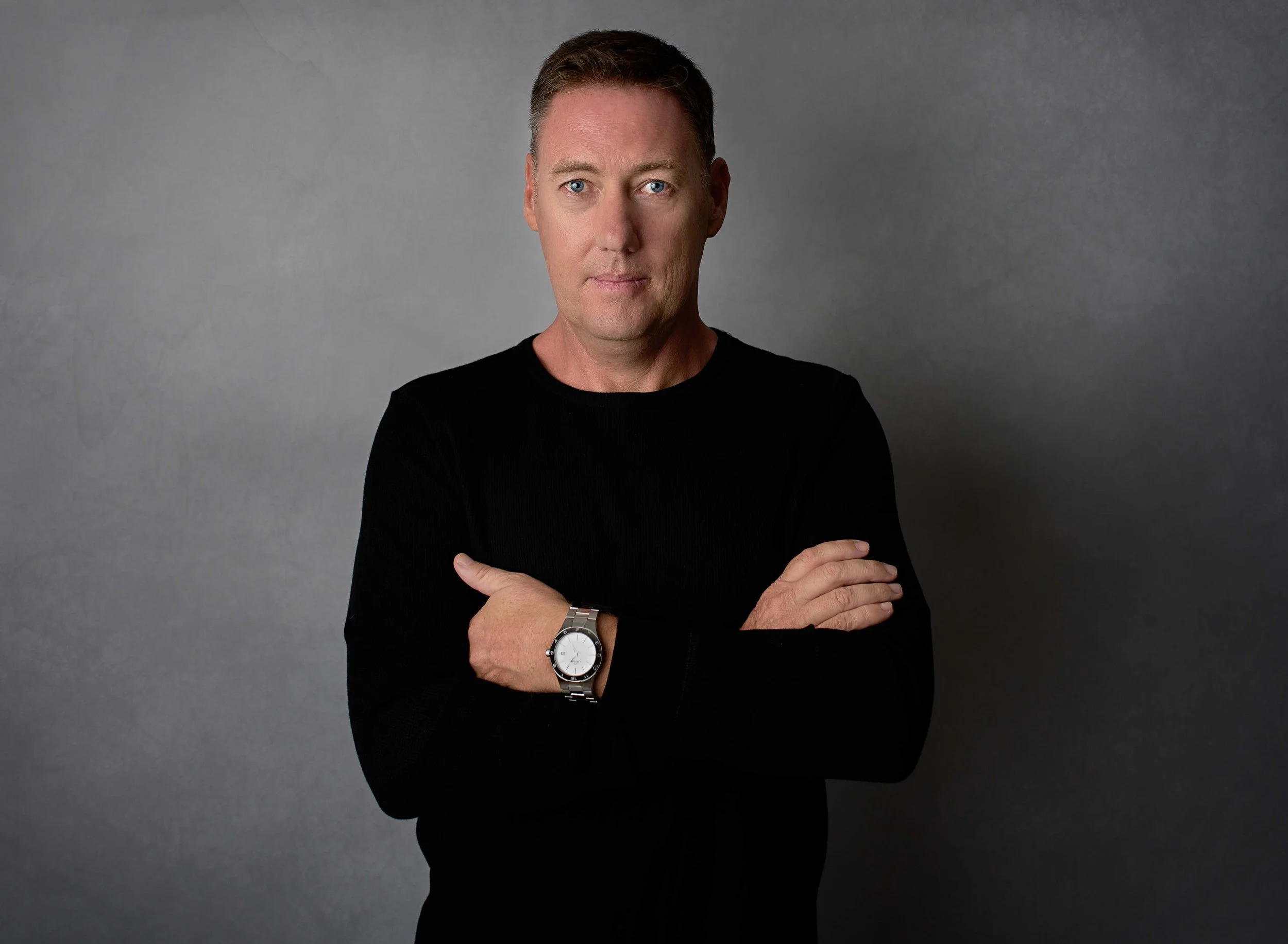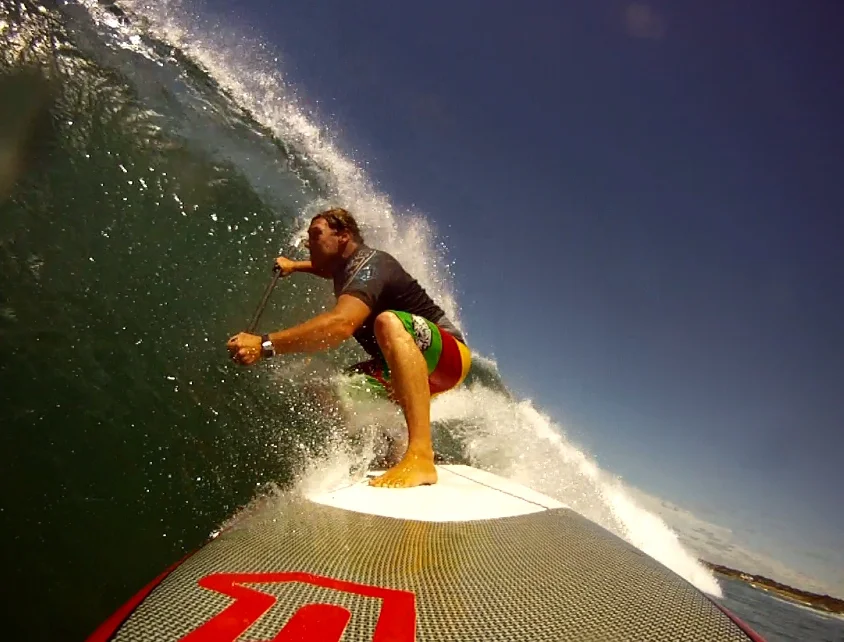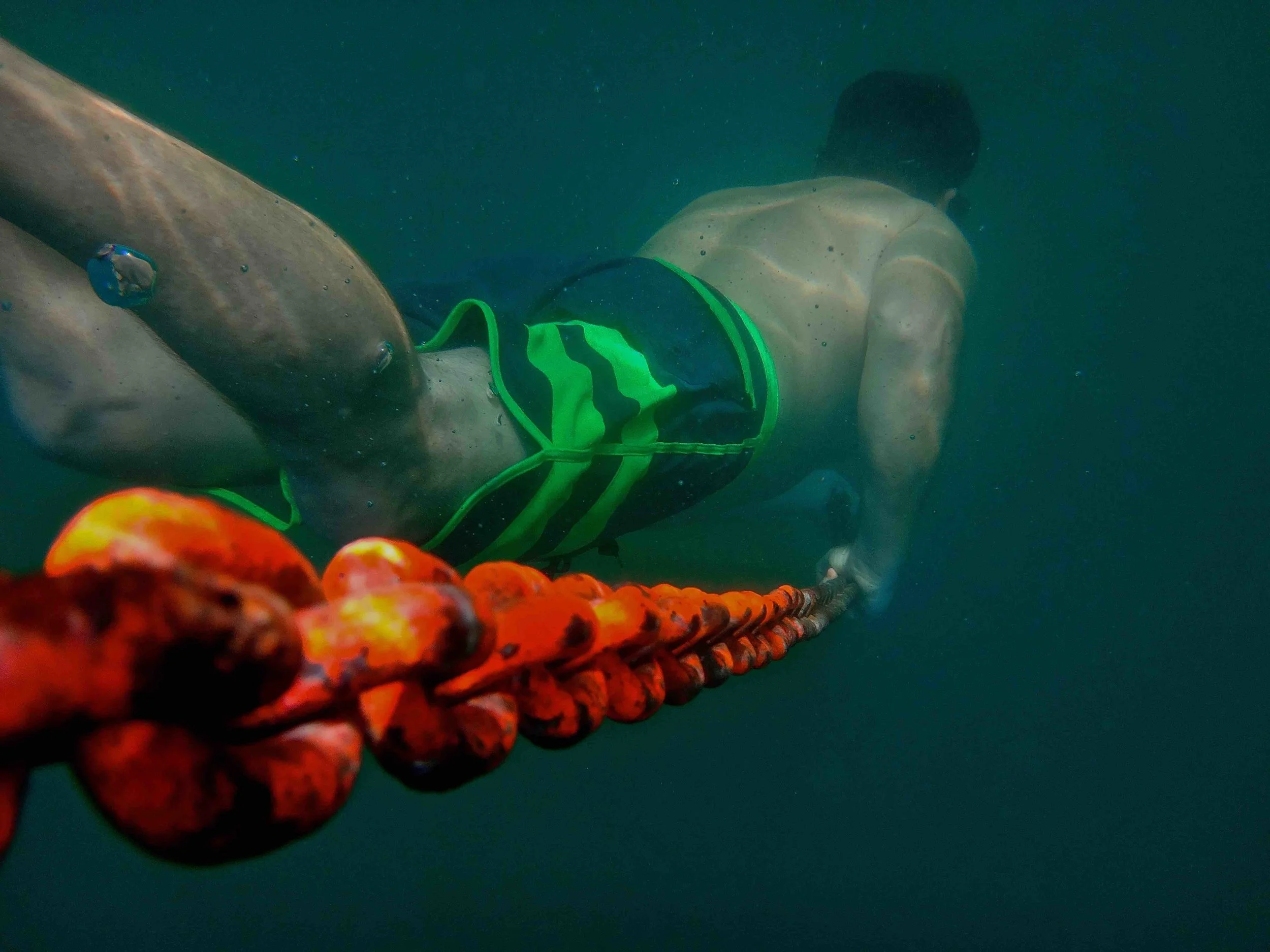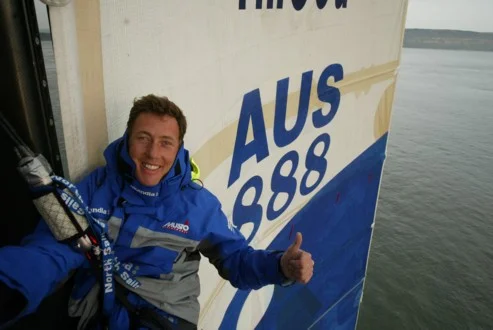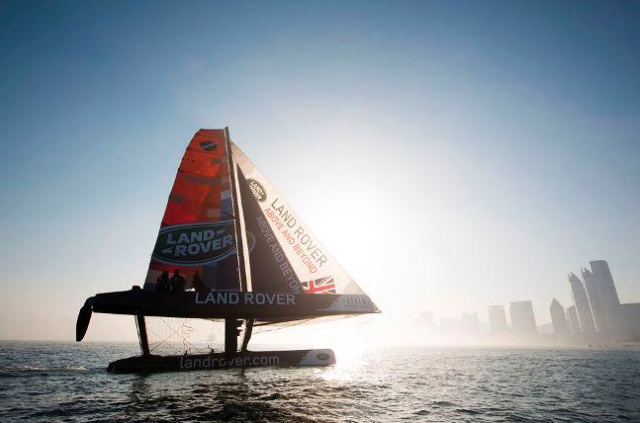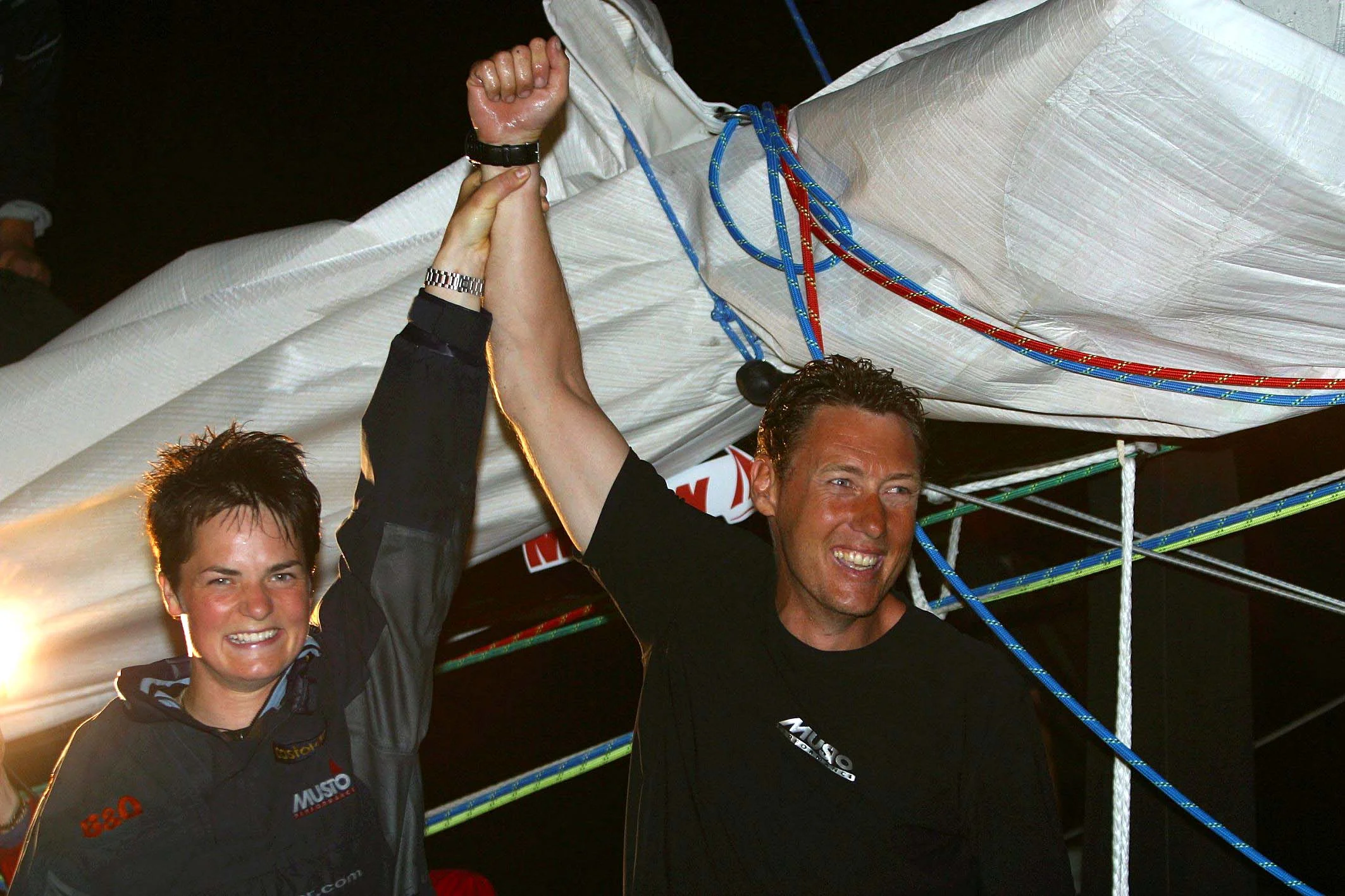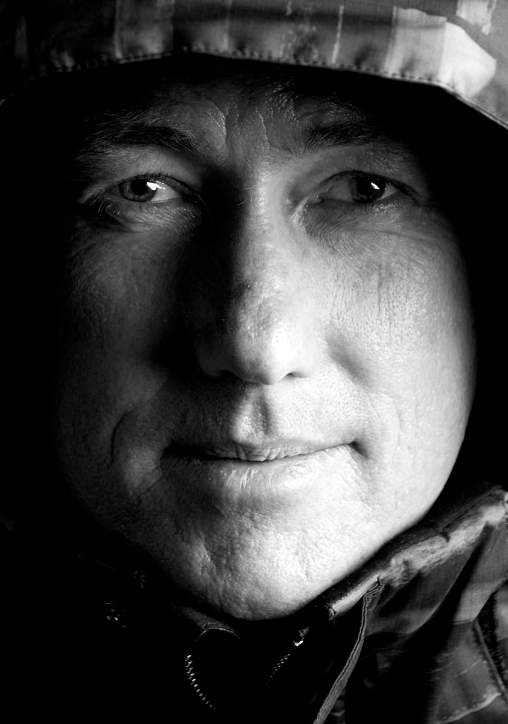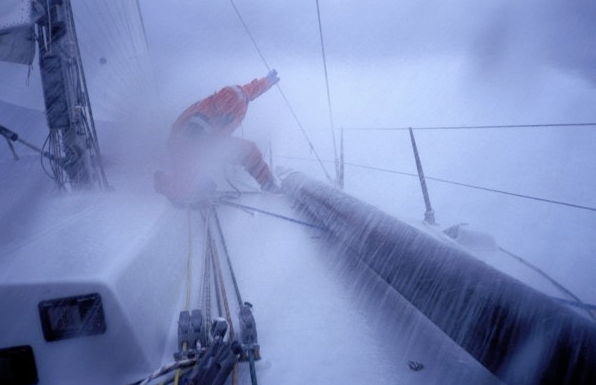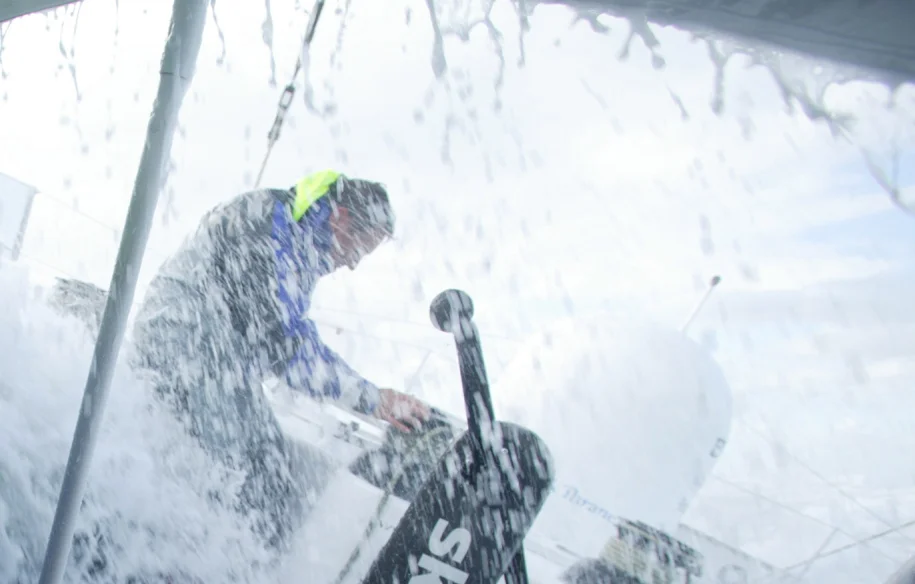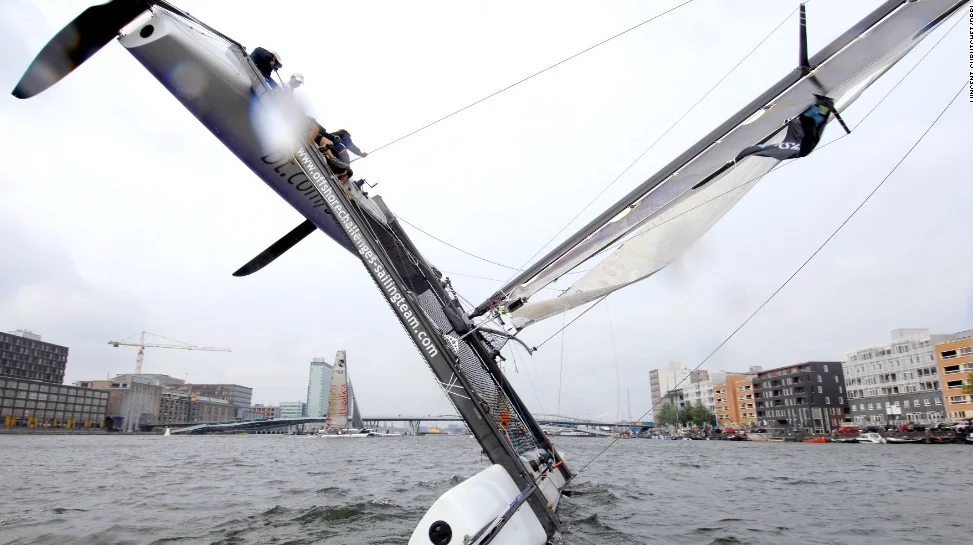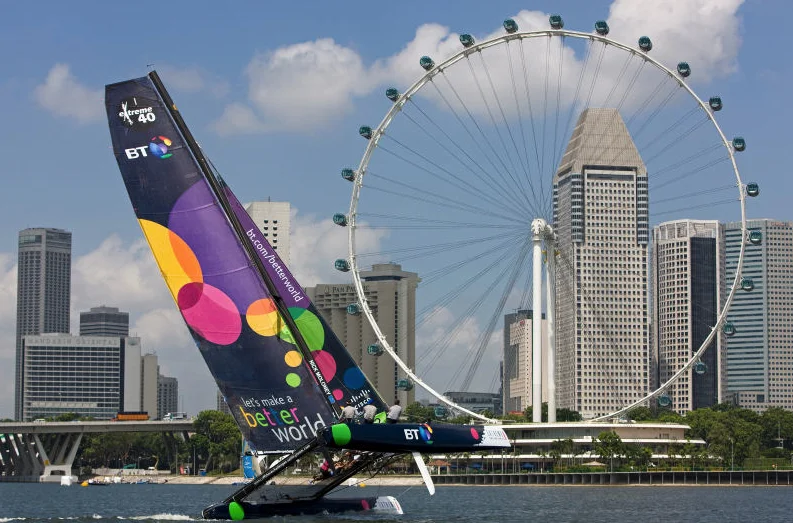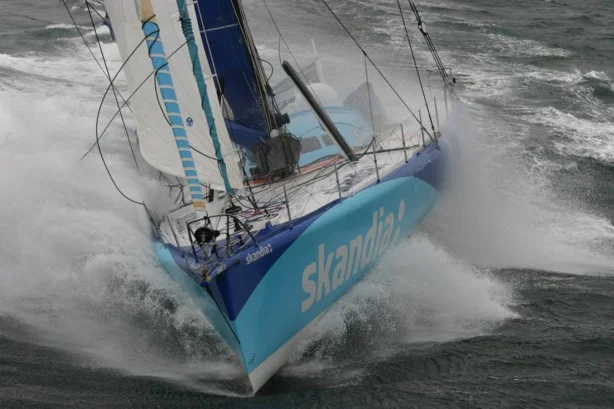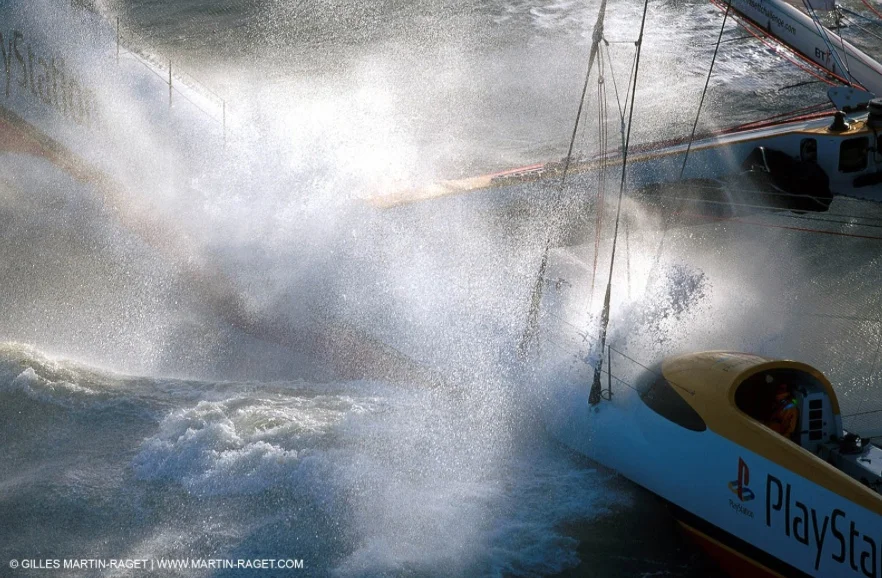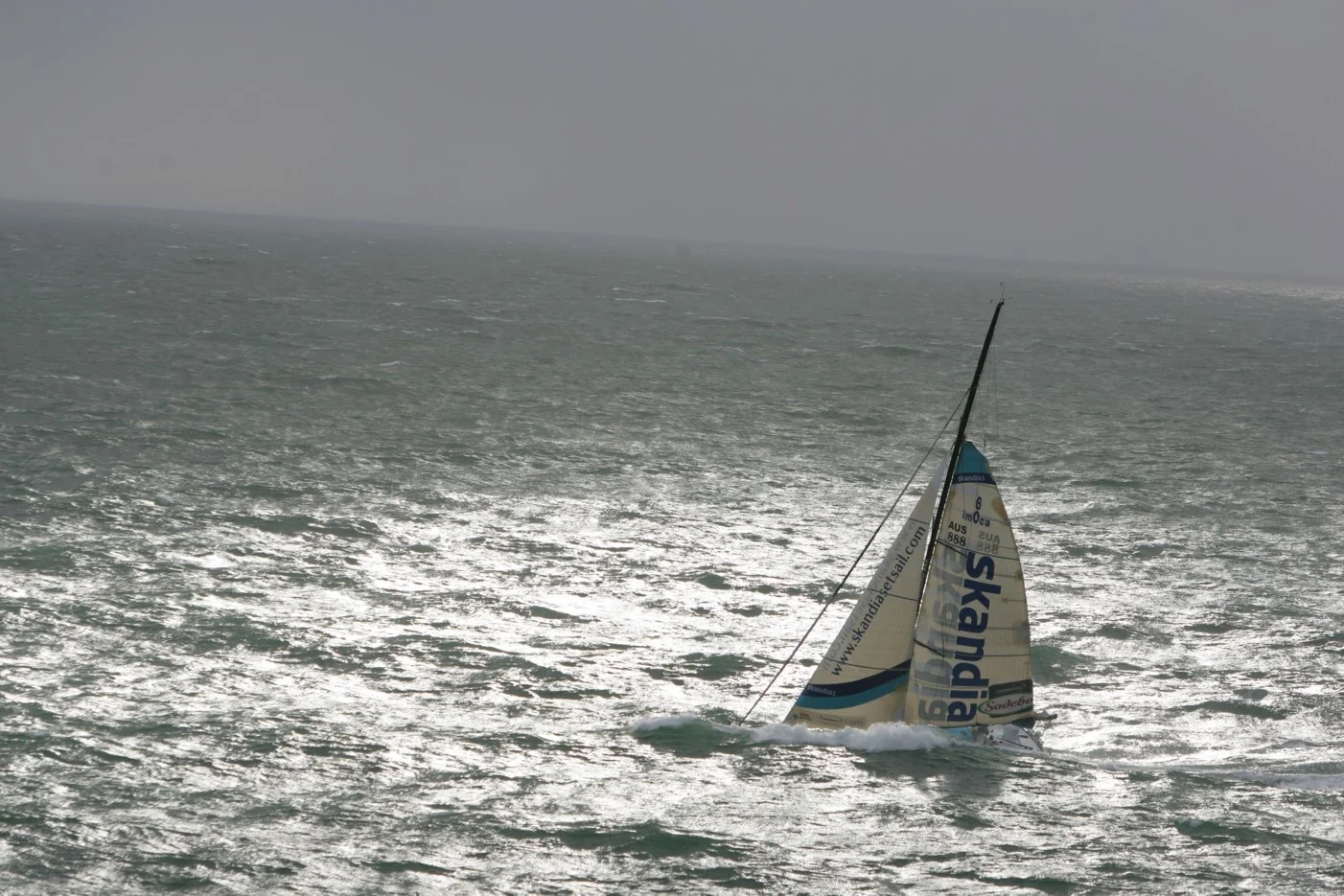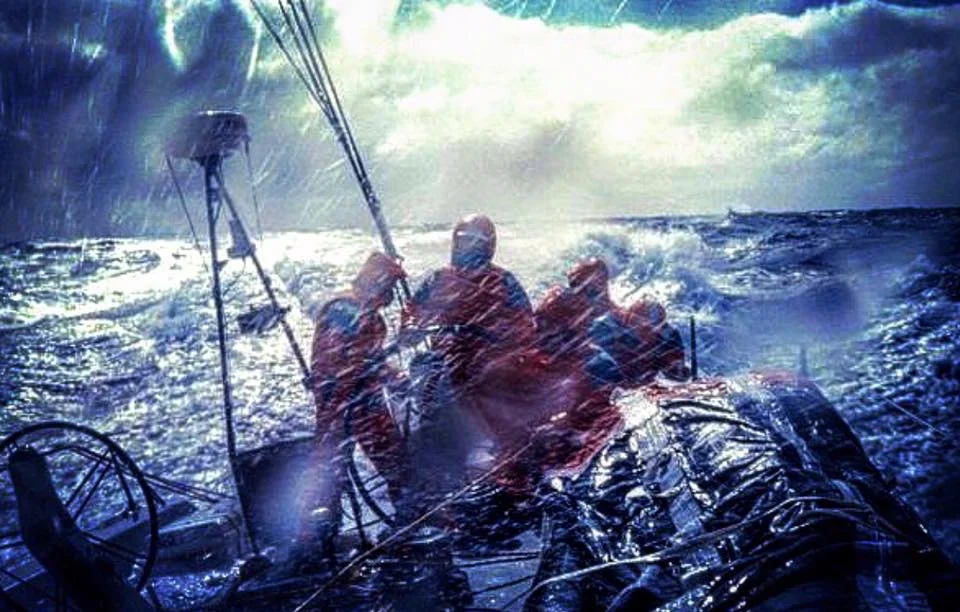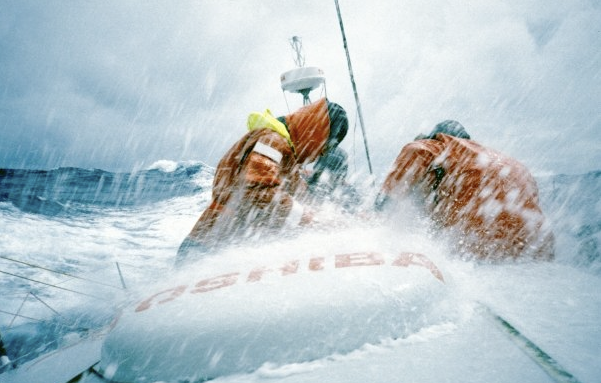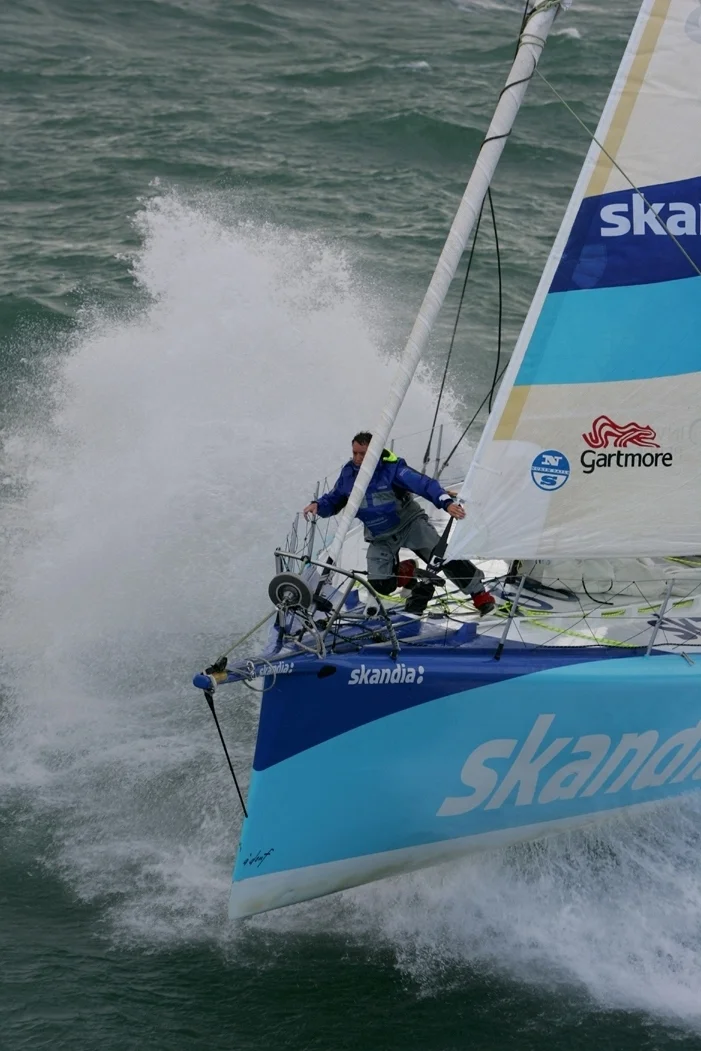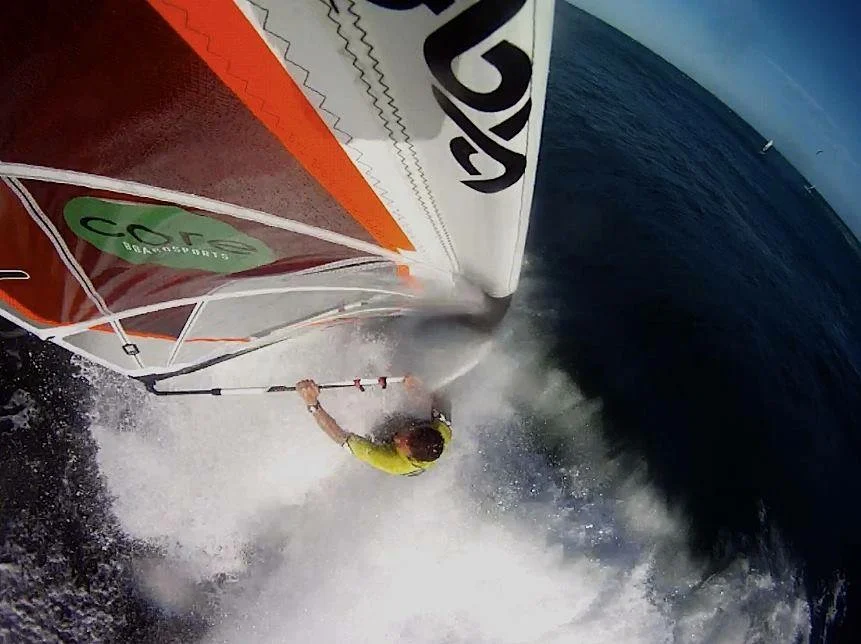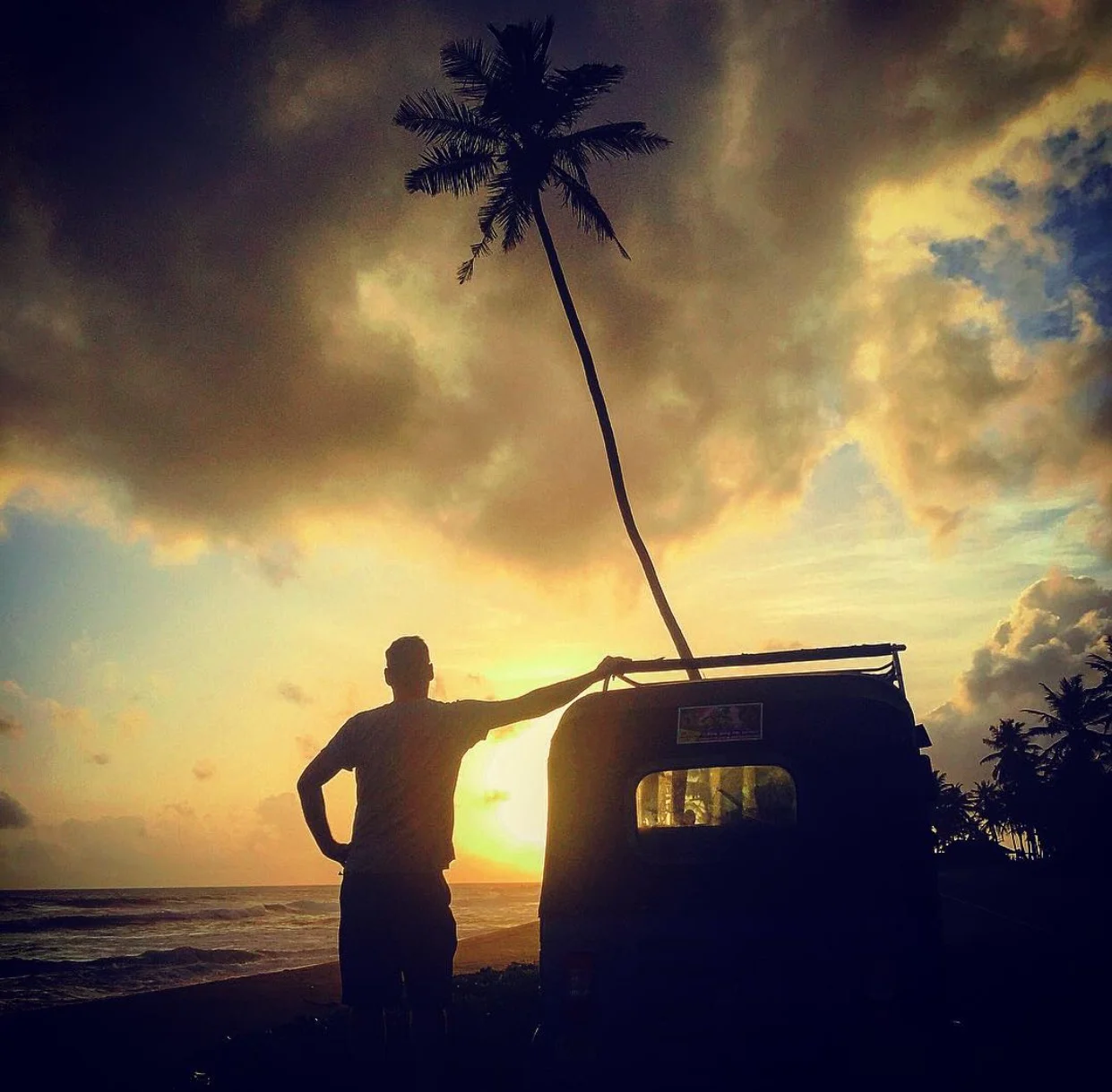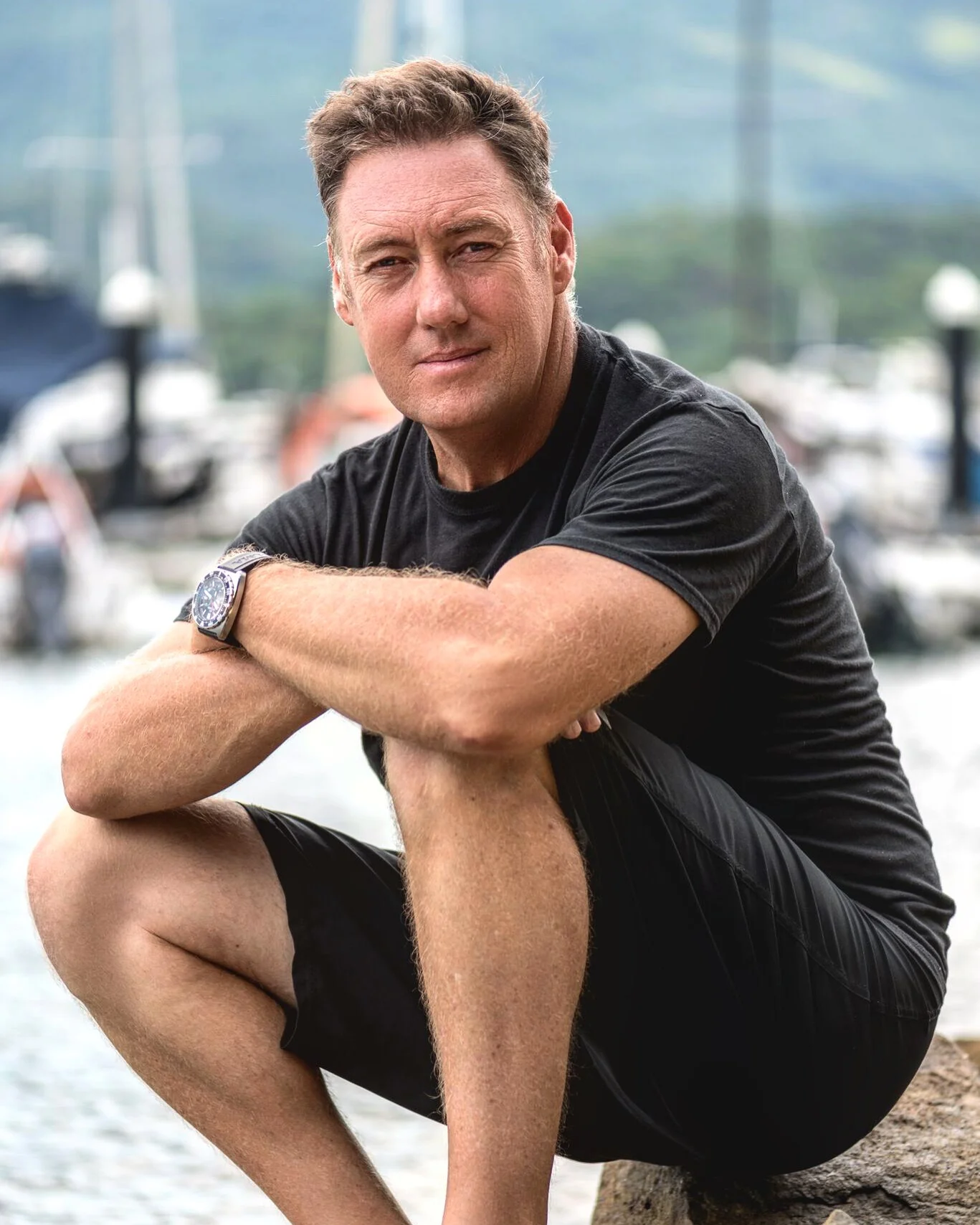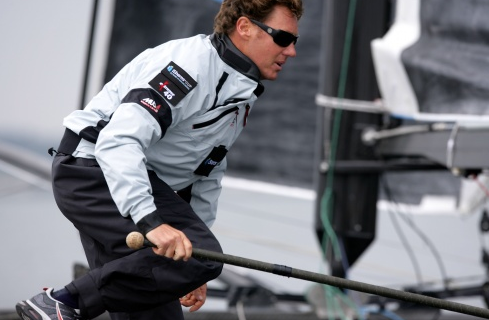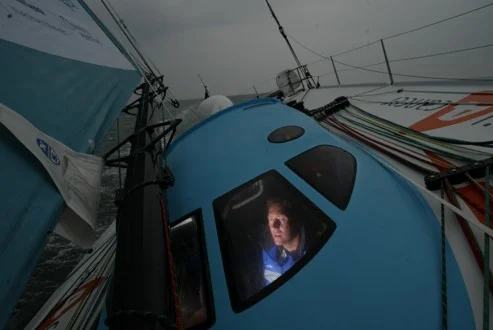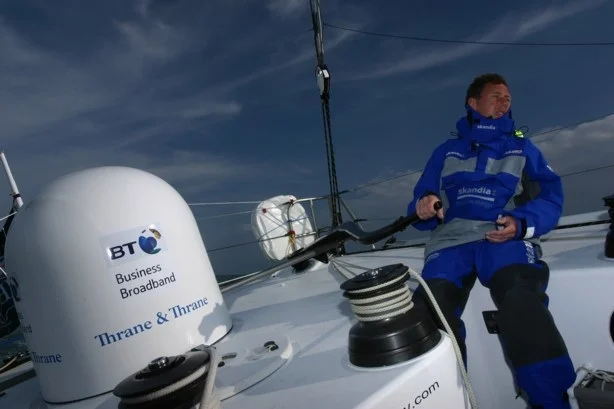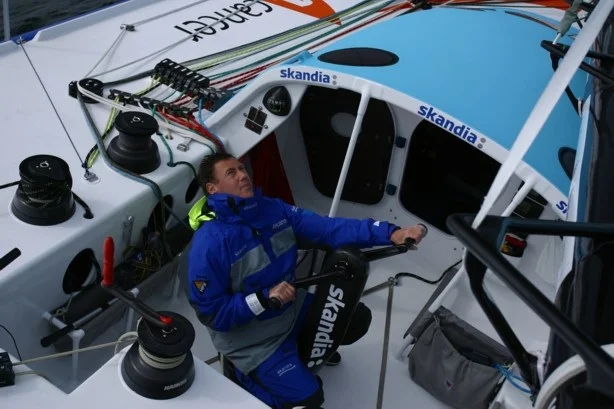Episode 20: Roger "Clouds" Badham Show Notes
Ocean Sailing Podcast: Hi folks, welcome to another Ocean Sailing Podcast episode. Thanks Roger for appearing on the Ocean Sailing Podcast. So I read a bit about your background. So you spent 10 years at university, which is a bloody long time studying meteorology and you did a PhD and you’ve now spent I guess more than 40 years as a meteorologist and most of the time in the marine side of meteorology and you’ve been known for a long time, from what I can gather, as clouds in the yachting world and it’s amazing how your name pops up all over the place.
Now, I haven’t done a lot of racing but even in the short time I’ve been racing, it’s popped up a few times and I read on the New Zealand yachting site, late last year where you were awarded an award for weather forecasting seven system yachting at the Volvo Yachting Excellent awards that you’ve been a forecaster for nine America’s Cups, seven Olympic games, 30 around the world races, Callisto Yacht races and Regattas, 35 Sydney to Hobart races and I’ve read somewhere else, more than 500 Tasman crossings. You’ve got an incredible background in meteorology.
Roger Badham: Yes, yeah, time I’ve got out, isn’t it?
Ocean Sailing Podcast: Yeah, well when you start adding up the numbers, you must be passionate about it because you’ve had an…
Roger Badham: The passion’s wearing out I think. I’m getting tired of it.
Ocean Sailing Podcast: After half a century, it’s a long time.
Roger Badham: Just flat out at the moment just doing Rio with the New Zealand team. That’s taking up all my nights at the moment, from six until 10 o’clock at night just trying to get all those damn courses that have all over the place and they’re all different. So that’s, that’s a challenge.
Ocean Sailing Podcast: And so how’s that going? Like that’s all an online and research base now with your weather forecasting and modelling tools? Is that, right?
Roger Badham: Yeah, yeah. I’ve got some good models for there. It’s, I mean this is the fourth year now. I did four Olympics with Australia, in ’96 until 2000 and now this is the fourth one from New Zealand. I went to a few them and then the last one in England I did from the outside and this one I’m doing up in the galleria and I’m doing a bit of — yeah, I mean, it just gives a team sort of continuity because I do all their forecasting no matter where they sail around the world. So you know, particularly in Europe, you know, they’re there all summer, European summer.
Ocean Sailing Podcast: Yep.
Roger Badham: And no matter where they are, be it in Weymouth or in France or in Spain or Italy or wherever they are, I do their daily forecast so they have the same person doing the forecast or what time and they’ve been in Rio. This will be their fourth year in Rio and so yeah, it’s continuity. They know what they get with me, they know sort of how much to use. Like last night when it was blowing there was a front going through in Rio.
A lot of wind and then rain coming with no wind underneath it. You know, I tell them in the end it’s a nice having a boat day. They can’t rely on the forecast because it’s going to go from everything to nothing and they’ve just, you know, you give them a full background and you’ve given as good a forecast as you can but in the end it’s them and I mean in the Olympics, that’s changed a lot in the Olympic side of it. Eight Olympic games I’ve been involved in where, you’re fooling yourself if you think that you’re winning a medal, you know. All you’re doing is just you’re getting a little bit of psychological comfort and you’re doing the best you can. It should be more an education process than it is, the forecasting process. You’re trying to explain why the win is doing what it’s doing and the A-symmetry of the course, weather sailing and whatever and that’s why it’s difficult in Rio, because it’s just quite a diverse set of courses, well inside to well outside.
The bay breeze, the sea breeze or the ocean breeze and the radiant breezes are all very different across the courses but they’ve been there enough now to understand those things and yeah, you give them a forecast on top of what they understand and what they know. So that’s what it’s about.
Ocean Sailing Podcast: Yeah, I read in the yachting overnight that the conditions are extremely changeable with big wind shifts and clearly wind that’s going to…
Roger Badham: Yeah, yeah, I mean I haven’t gotten any feedback from them yet. They’re just coming in now but I haven’t seen how it was today. I mean I looked at the observations, but the reports are coming over the next day or two. And yeah, it would have been a difficult day on the water today for that sure because the, you know, any day when you got a front coming true with a lot of wind and then a lot of rain with no wind.
Ocean Sailing Podcast: Yeah.
Roger Badham: That’s difficult you know?
Ocean Sailing Podcast: Yeah and if you’re on the wrong side of a big shift, it’s just, it’s all over isn’t it? And they’re racing.
Roger Badham: Yeah and the courses are so short and there’s a lot of pressure to get the races done that they short course racing. It’s not like in the old days they were three-mile feats and you could do well by understanding the weather and you could, you know, get your leverage out to the left or the right or whatever. These new courses that are so short and the races are over so quickly, it’s a different ball game and it’s more about technical ability than sailing a boat and then putting a the weather on top of that. Although, not just the weather, the environment has it’s way in that current. You’ve got to put them all on top of that but the courses are short. Especially if they’re televising one of the course then of course they bang off no matter what they’re doing every course, and it’s just a bit of a dog’s breakfast in here.
Ocean Sailing Podcast: That’s more and more made for television formula isn’t it? At all levels of yachting it seems.
Roger Badham: Well, it’s the same in the cup you know? It’s lost the pure at the maturation you know of the America’s talents is exactly the same; it’s a spectacle now. It’s not necessarily pure sailing; it’s just a spectacle.
Ocean Sailing Podcast: No, well especially when you get some of the race tracks like New York where the cruising distance is just absolutely hopeless for racing.
Roger Badham: Yeah, I was there in New York on the tone. Like no one sails in the Hudson River.
Ocean Sailing Podcast: No, no you land in plain sea right? But you do not sail in those kinds of currents.
Roger Badham: Yeah, well that’s crazy. That’s all those days in the Liberty Cup; they’re not going to sail on the river. They’ll sail right in the corner where the breeze if crazy doing that you know but saw that today. It’s in the Liberty Cup, they were,, open sailing up river. They sail around the court.
Ocean Sailing Podcast: Yeah.
Roger Badham: A little bit of breeze is going mini-prone sailing in the river with the breeze coming north of the buildings. It’s at,, a 150 buildings that are 150, a thousand stories high.
Ocean Sailing Podcast: Yeah.
Roger Badham: And the breeze, breeze is just every which way, you know? It’s just,, be getting gust and props and huge ships and it’s,, and those courses are so short again. You know, once again, it’s become a, it’s a, it’s a spectator sport not a sailing. If you were sailing sport.
Ocean Sailing Podcast: Yeah, well right. If you’re not off the start, cleaning around the first mark cleanly, it’s just, it’s,, harder and harder to play catch up and they see it and there are a lot of situations like New York which doesn’t really give you a you a fore race.
Roger Badham: Yeah, I know over, over to say that the,, that that short course racing that needs, it needs strength audience to some extent and particularly the America’s Cup won., it’s almost random you know and there are some teams that are technically probably notice the boat and need down the bottom but even with the results that the rest of the teams, it’s, it’s almost, almost random. Everyone, has a turn up meeting and everyone of kind of loses because it’s so short and it’s so, surviving to, to just tiny, you know tiny little areas or,, or good luck could magnify into,, into you know, into a,, huge win or huge loss.
Ocean Sailing Podcast: Yeah, well especially the speed differentials. It’s not like its eight and a half knots versus nine knots anymore isn’t it? So, I don’t know.
Roger Badham: No, no exactly.
Ocean Sailing Podcast: So I’m reading your background that you first got involved in sail boat racing in 1977 with Iain Murray and aiding for the skiffs and then it was only six years later that you were, you started providing weather advice to America’s Cup teams. How did all that I guess come about within Iain Murray and how did you, I guess, step so quickly into weather advice at that top level?
Roger Badham: I sailed when I was young too. I sailed skiffs, but I’m an average sailor, not a top level sailor. I was with a colleague, we had a consulting company in the weather and stuff and one of the companies we had, one of the clients we had was with Channel 7 in Sydney and the then boss at the station, Ted Thomas who is still with us, he helped me out. I keep some good contact with Ted. He called me in one day and said that, “I’ve just signed this young guy up to sail skiffs.” And he said, “I don’t know how good he is”.
Because in those days they had four rigs and it was the big rig actually, I think they went to nine knots with it. Then there was a second rig that went to about 14 or 15. The third rig went to the high 10’s and then the small rig was blowing. So I work with Iain the whole time he was in 18 footers and through to the 80’s. But my research work at university, I got my PhD and then I did post-doctoral work, was on low-level wind sheers and the way in which the boundary layer works. In fact, all of my research work was exactly the same sort of stuff but it was about performance, understanding the nature of the wind and the temperature profiles in the first 100 meters of the atmosphere.
So it was about how sailboats have to sail in wind. So it’s very nature if I was involved in any sort of forecasting work, that I’d be involved in that sort of micro scale work and that was exactly what good sail boat racing is all about and the only people that can employ you for long periods of time in that sort of work doing that sort of level of work is America’s Cup. They’ve a long program that’s three year and they’re well funded. So it would be natural that that’s where I ended up really.
Ocean Sailing Podcast: Well in reading some comments from a previous interviews back here, you know, as they said in the early days for you, it was sort of jump between famine and feast in terms of work flows and income and I guess to that point, have you seeing that has what you do has become more mainstream at a grand prix level that your services are now required on retainer for long periods of time with things like the Olympics and with the America’s Cup and with the Volvo Ocean Race teams?
Roger Badham: Oh for sure. I mean, you know it’s changed so much and it’s changed so much because of the professionalism in the sport but it’s also changed because of the improvement in weather forecasting particularly because of the computer models. And, you know, it won’t be impacting ocean racing now in terms of Volvo’s and around the world type racing. The human element is very much going from it. I just lost my lasted world speed record when Kamenshi broke the Atlantic record.
Ocean Sailing Podcast: Right.
Roger Badham: And I was talking to Stan the other day by email about the fact that he’d taken my last record and you know he said the same thing. I said, “The meteorologist is sort of being excused out of a job in terms of that sort of stuff.” And he’d said, “Oh, the navigators going the same way really.”
Ocean Sailing Podcast: Wow.
Roger Badham: You know I mean when I started and certainly back in the sort of people that I worked with, you know Hammond’s and all those sorts of people, the old style navigators, they basically 95% of their time just figuring out where they were and 5% of the time thinking about where they should go to. And now, it’s the other way around and so things have changed hugely because of the improved, and particularly from my point of view, in terms of computer forecasting and that’s very much on a broad scale in the global sense.
And it’s coming now, you know that the meso scale models are getting good but in terms of micro scale, in other words, the difference between the top and bottom of the course and the left and right of the course, the asymmetry of the course, the way in which the ships are moving on the course and they don’t generally go more down wind. They usually move some angle to the breeze. I’ve spent years in Valencia where the big shifts worked their way up the course and in San Francisco they used to come from the side of the course. So there’s still a lot of, you know, real meteorology work to be able to sustain in a short period of forecasting to forecast the next 30 minutes.
And that’s all dominated by the human intervention but those days are, I think they’re probably numbered like all the meteorologists. The computer are just going to get better and better. So yeah, things are changing and they’re changing rapidly and during my forecasting period. I started with no computer forecasting and I’m ending with a huge amount of it.
Ocean Sailing Podcast: Well yes it’s probably, I guess if you’re going to map your career over any 50 year period if you look at the last three centuries is probably been, almost been the idea of timing hasn’t it? In terms of the evolution of what you do and to have been in high demand at this elite level of racing but where it starts to now becomes superseded to some degree by some of the automation and computing power that’s now putting stuff at the fingertips of cruising races in terms of what they can put in their cockpits with chart plotters and downloadable weather and all that kind of stuff.
Roger Badham: That’s right. But I mean if you look at any of the typical ocean racing you know, which is you know a good ocean race around the Caribbean, the Caribbean 600 or the Fast net Race or the Hobart Race, they’re usually the order of five 600 miles long, which is these days you know, two days to three day even for a big boat or a medium size boat. There’s still a lot of human input that can be had there, and if you look at the last race that we just had, the Southport Race…
Ocean Sailing Podcast: Yeah, I was just thinking about that one.
Roger Badham: …which is extremely light as they can be and you’ve got adverse current, but you’ve got the wind which is turning on and off. There’s a lot of manual input that you can do there and generally most of it and I used to have some classes where I’d go through some of the rules with the navigators about the distance between, the difference between sailing one mile, or another and one mile, half a mile off the beach, two miles off the beach, four miles off the beach, six miles, eight miles, 10 miles and the way in which the wind turns on and turns off.
And I haven’t done that for a long time these days but that’s the sort of stuff I did in my PhD and then and it’s fundamental and most sailors just don’t know. So the sailors don’t know and the forecast has got nothing to do with that sort of stuff. The forecast is a blanket forecast and the computer models, yes, they’re getting better and better at that but they’re still probably at least 10 to 20 years away before the computer model is going to be that.
You know when you get models down to a couple of hundred litre resolution then they’ll start showing all sorts of interesting things because it’s a function of the water temperature, which you can vary specially over the distance of hundreds of meters, let alone a kilometre. So yeah there’s still a lot of input that can be had there, but things will change there in the medium term.
Ocean Sailing Podcast: Well I have to say, I mean I use your services for the first time from a racing point of view for the Coffs to Southport Race in January. It was a, you know, 20 hour race and we followed the route and you know, we did extremely well. We followed the route, the weather was as predicted and we got a great result and then the contrast with the Sydney Gold Coast Race last week where you know it turned into a four day race for us. We followed the route for the first 24 hours.
We were leading both of our IRC and IRC divisions. We thought we were heroes, and then we had no ability to adapt to all of the localised issues that were happening with breeze holes and we ended up back of the pack three days later and so, I mean to your point, I mean how, how do you equip your boat and your team with the ability to actually take what happens two days into it and start to adapt the route to the changing conditions at sea?
Roger Badham: Well, you’ve got to carry a meteorologist on board or a clever person that’s up with exactly the nature and how the wind is going or you’ll have the same result that most people have and that’s good luck and bad luck. They have the boat in the right place at the right time or at the wrong place at the wrong time and that’s the nature of yacht racing really. They, if you happen to get good luck, then its never good luck. It’s the skill of the navigator and particularly the helmsman and if you have bad luck then it’s just bad luck, you know, you’re down there.
Ocean Sailing Podcast: Not a lack of skills and a lack of knowledge.
Roger Badham: Yes, so luck is blamed always for loosing but it’s never taken for winning because that’s skill. Funny thing about that When you think about that. That’s sort of the nature I guess.
Ocean Sailing Podcast: Yeah.
Roger Badham: But that’s very true and I mean particularly you know in like if the breeze is solid and particularly if it’s on shore, you know you’re basically on shore and it’s a solid breeze then the models again would be very good. You know 24, 48 maybe 72 in advance and you can rely on them very well. But when it’s a fickle wind and it’s off shore and really soft and turns on and off, almost at the what seems to be random. They can be really random and you can get on a very weak little sea breezes and not so weak, that sort of racing, particularly going north up in New South Wales Coast.
One of the most amazing races in the world, the same thing happens at the start of the Fastnet sometimes. We have to sail along the South Coast of England, and you have to make this decision whether you go into Lion Bay and Start Bay. You know, do you go into the bay; how far into the bay do you go? Or do you go out? Now you’ve got current but you know, then it’s extra distance. It’s, it’s exactly the same situation if you’ve got the light wings in a coastal, basically a coastal situation, there’s a huge amount of weather and understanding to put you know a good race together. And yeah, I mean that was over nine or ten Admiral’s Cups. It was great sailing on the South Coast of England.
But yeah, there were times where January blows your socks off and you don’t have to think much at all, often getting bashed and there are, you know, times there where it’s just like the last Southport Race where it’s the most breeze you’ll ever see is about 10 knots and mostly it’s under that and there’s huge decisions to be made virtually at every head land and every bay, “Where do I go?” And you’re trying to do it, the same strategies in place; you’re trying to race the fleet of course. But at the same time you’re racing the environment.
And you’re trying to say, “Where are my best places to stay in the next three hours given that I want to satisfy my long term six, nine, 12 and 24 hour things?” So you can’t just pick the boat up and suddenly move it 80 knots off shore. Into port. You’ve got to blend them all together and know which is the down time to take, minimise the down time and maximise where you think of the breeze is going to be the best and it’s a difficult thing. I mean you, it’s with you against the environment and the environment is a, it’s a difficult game of chess.
Ocean Sailing Podcast: Yeah, so and along those lines what on board technology or systems are boats using? I’ve read a bit about the expedition software but do you see common solutions off shore racing boats are using to try and blend that evolving weather pattern with their kind of initial weather routing plans and to adapt outside of onward observations.
Roger Badham: No, I mean in any whether it’s an Expedition, which is you know probably the most commonly used routing system at the moment but that’s whether it’s there or some of the other ones the algorithms aren’t much different. It’s then the computer models, you know the forecast, wind models and current models that you put into it. But then it just comes down to the skill and the experience of the navigator and you get good navigators, you know that have a lot of hours under their belt and they have good sound knowledge.
And I mean if you look at the top flight navigators that are used in Volvo Races or the ocean racing, you know the Will Oxley’s and the Wayne Veelers and these guys, they’re very experienced guys. I have worked with those guys over long periods of time and they have good knowledge and they do understand quite a degree of the way in which the environment works and the way in which the wind works.
So they’re good and they’re full time guys, you know they are doing it all the time and they’re doing it all the time for the last 20 and 30 years. Now you can’t do that if you’re just on a boat that does three races a year and the rest of the time you’ve got a job selling cars or working in the bank.
Ocean Sailing Podcast: Yep.
Roger Badham: So you know, it’s you know it’s a totally different situation, you know one’s a hobby and one’s a profession, really.
Ocean Sailing Podcast: Yeah and the more you know, the more you realise you don’t know in terms of what there is to learn. It really is quite vast.
Roger Badham: Exactly. Yeah, yeah and this it’s the same in all the sailing. You know you’ve got whether it’s small boat sailing in the Olympics or whatever but they’re still basically professional sailors because that’s what they have been doing for the last four years or eight years or 12 years.
Ocean Sailing Podcast: It’s that 10,000 hour concept, you know you do anything but 10,000 hours and it becomes intuitive but…
Roger Badham: Well you should become good at it.
Ocean Sailing Podcast: Yeah. You…
Roger Badham: You will but you should if you do it for that amount of time.
Ocean Sailing Podcast: If you do it well. That’s right, keep learning.
Roger Badham: Yeah, yeah exactly. That, that’s so true you know?
Ocean Sailing Podcast: So I read, so I’ve read back in 2003 with Emirates and Team New Zealand, you had a six member weather team that you led and if you look at the work you’ve been doing recently in Bermuda in preparation for the next cup, how is what you’re doing now changed to even sort of 10 or 15 years ago from the America’s Cup point of view?
Roger Badham: It’s back to where we started. It’s a team of one, which is me. If you go back in the Bondi days and it was a team of one and gradually it sort of built up from there. It became a — there was an arms race going on in terms of weather and it culminated probably in Auckland in 2003 where we had some big change on not just our team but in a number of all the top performing teams and you’re trying to cover all, you know, you are trying to really get into it.
We, I mean, it was easy for us with Team New Zealand because I’ve grown local fellas and co-opted some around. But I had a good team, a bunch of guys there, both there and also in Valencia to some extent, young engineers, all good sailors and some good guys right there. [Grant Heft] was New Zealand’s best board catch, great pair of eyes in terms of understanding what’s happening but we used this, I mean in the old days, it would just be me on a little weather boat somewhere on the top of the course, the top mark or whatever and you’ve got to look at it every day.
When you go out, if it’s only me on a racetrack, you’ve got to look at the day that’s in question. Where do I place myself that’s best to report to the guys at the start for how they’re going to get leverage in the best in the first 20 minutes, you know as they work their way up to me? Should you be at the top mark, should you be outside the top mark, should you be inside the course? And that depends on the time of the day.
Whether you should be, you know, all you’re trying to do is understand the asymmetry of the course again, in terms of wind speed, wind direction and how it’s likely to change over that 15 and 30 minute period. Where are my best positions to about to look at that asymmetry, observe it, and report on it and then do a short term forecast on it? And if you’ve got buoys or data around the course that can help, but in the old days, you didn’t have anything and these days there’s not a lot.
So in between times we had a situation in Auckland where there were some buoys on the course and in Valencia there are a lot on the course and we had a number of weather boats, you know I’d be in the middle of the course and then I’d have a going out on the, where I wanted him on the right hand side and a guy out on the left hand side and maybe some way out the weather or whatever so that we can all then pool their information and you’re understanding exactly the symmetry of the course. But they’ve tried to cut down the, you know the arms race.
Ocean Sailing Podcast: Yeah.
Roger Badham: And so the weather teams are now much smaller and the game has changed hugely after the exit of mono hulls where I mean the Valencia was the last mono hull in America’s Cup and you know I had a big input into the race you know? I would call the side and call the way in which they started. You know, “Do you want a wide right? Or do you want to tight [inaudible].
Ocean Sailing Podcast: Yeah.
Roger Badham: And that was a big input in terms of the nature of the race. The racing has now changed with the multi hulls. It’s more a spectacle. It’s a faster race, it’s often a shorter race and particularly shorter in term of the back of the boats are going a thousand miles and hour.
Ocean Sailing Podcast: Yeah.
Roger Badham: You know they’re not just blade minds, they’re looking for 1,000 of a knot difference.
Ocean Sailing Podcast: Yeah.
Roger Badham: Chugging out on start of tech you know trying to get some leverage out of the guy over the next 10 or 15 minutes and the 10 or 15 minutes they’ve gone down to the bottom mark and half way back up to the top mark again. So it’s changed a lot and weather is less important. You’ve still got to understand the race track and you’re still trying to, you know obviously hold better pressure particularly after the offset mark and you’re shooting down to the bottom mark.
You’re trying to hold the best line of pressure, whether you put in you know, one jive or three jives, but it’s a different game and in actual fact, probably the most important forecast that I was doing in San Francisco is actually setting a boat up but the night before for measuring, the tech that’s going to be used and the foils and was the bow sprit on or off for the code zero and all those sorts of things.
Ocean Sailing Podcast: Yeah.
Roger Badham: You know that could win or lose a race.
Ocean Sailing Podcast: Yeah.
Roger Badham: And that will be the same in Bermuda, trying to get the forecast exactly right so that you go out and have the right racing gear on. You know you put the wrong tip on, especially if you’re in a light wind situation that’s only seven knots, you go out and you go out without it tip…
Ocean Sailing Podcast: Yeah.
Roger Badham: …or not. That’ll be a huge cause.
Ocean Sailing Podcast: Yeah but the windage become a factor, doesn’t it on those boats? Particularly in lighter breezes, the windage with what you put on and don’t put on is quite important.
Roger Badham: Yeah. So yeah, the game has changed, and I feel like a dinosaur.
Ocean Sailing Podcast: Well that’s the benefit of looking back in your career isn’t it? As opposed to looking forward. I guess everyone gets that perspective at some point.
Roger Badham: Yeah.
Ocean Sailing Podcast: So with, like with Bermuda, how much of like, you’ve recently been in Bermuda, how much of your research goes into sail planning and foil planning and planning for the boat based on conditions versus you building a, I guess a knowledge based of the winds that they are likely to have come race time in 12 months time and then how they configure the boats from how can they configure them versus the actual design work itself that goes into some of the variations that they do have the ability to vary?
Roger Badham: Yeah I mean we’ve got a wind climate for the place and, and the boat is built around that and that’s pretty much set in concrete. I mean everyone in the design team pretty much understands what they’re designing to do. So it’s more than just understanding the racetrack and then in Bermuda it’s quite different than San Francisco. In San Francisco there’s only one racetrack and there was pretty much only one wind.
But the wind wasn’t coming down the racecourse. It was caught in [inaudible], looking upwind as a result; it wasn’t quite on the hour with the course. So the current was always pretty much the same. With Bermuda there’s not much current but there’s at least seven different racecourses that they can have because the wind comes from…
Ocean Sailing Podcast: Wow.
Roger Badham: …every angle. But it’s predominantly south westerly, but it can also be westerly and northwest and north and northeast and east and south eastern. I mean there’s a lot of different wind angles and have a lot of different racecourses, and there’s certainly quite differences and I spend the two months just trying to understand the differences in the race courses. Clouds can be important there. More so than would seem in quite a number of America’s Cups, we can get cloud lines.
Not on many days but a number of different wind angles. You can get cloud streaks but you know, you’ve enhanced lifting at some points. So yeah there’s a lot to learn there which I’ve sort of got the fundamentals now and you run a good model and yeah it’s just then a matter of calling it on the day but yeah, the biggest call of the night before and when you’re moving the boat really, and then just calling the race.
Ocean Sailing Podcast: And do you feel positive about Bermuda as a venue with the differences to San Francisco?
Roger Badham: Oh yeah, no I think in fact the venue will be pretty good and hopefully, I’m not overall too confident that the race courses will be truly into the breeze. You know in other words, they set them up so that they’re biased on the dock yard side of the course and they always try and finish up with the Friday, where the America’s Cup to base is again with the ability.
So it tends to sort of buy us the course then so that it’s not what you could call pure, you know into the wind to the point that you’d like it. You know, if you had a true windward leeward it would be three miles…
Ocean Sailing Podcast: Yeah.
Roger Badham: …pointing directly up breeze because it’s in the sand and yet, you’re constrained by a bit of geography and a bit strained by whether they want to finish the course and you’re con by the offset mark and yeah there’s a number of limitations here and everywhere that the race committee have to get around but they’ll do it.
Ocean Sailing Podcast: Okay.
Roger Badham: Yeah it’s all, you can’t wish for anything. You work within the limitations that they’ve set you and that’s it. There’s no use belly aching about it.
Ocean Sailing Podcast: No. Well and speaking of limitations and class rules, do you see Bermuda being a, sort of an Even Stevens in terms of reasonably even opportunity for a number of teams to win versus 2013 where in towards the end of the cup, you know where their computer based stabilising system that magically appeared that sort of left a bad taste in a few mouths after pushing the class boundaries a bit far? Are we past that or is that just another typical check on the America’s Cup?
Roger Badham: Yeah but hat’s just where they left off. So I mean therefore everyone gone that way now and it’s a whole new ball game. It’s a, in terms of the class, it’s well and truly out there. But yeah I think the teams that are sailing there all the time, that’s Oracle and Softbank and Artemis, they probably have a slight advantage because if they’ve been sailing there now a long time. Ben Ainsley’s team will be there shortly. I think that does play a little bit but not enough. It’s a first time boat. You know, I mean it’s a new class.
Ocean Sailing Podcast: Yeah.
Roger Badham: And no one is going to have the boat in the water until January next year, although they’ve had sort of, you know, surrogates in the 45’s. So the new class, they’re very, very complex boats with the hydraulics systems. They’re enormously complex. It’s just mind blogging, you know? So I can only presume that someone will have a better boat, you would think? Maybe more reliable because they’re extremely complex, and you’d think that someone would either, by design or by lack, come up with a boat that might be slightly better.
But then that might only be slightly better in certain range of wind speed. So it will be interesting when you do get to true racing. It will come up pretty quickly. It’s not like, you know, you’d have a lot of time. There’s only four months basically between January and the end of April and come May when racing starts. So it’s not a long time. So yeah, it’s certainly going to be an interesting event, but yeah. Well, I’ll leave it at that I guess. We’ll just have to see.
Ocean Sailing Podcast: Yep.
Roger Badham: Someone should have a better boat than someone else and I don’t know whether that will be through speed or reliability but through some factor and, I mean, yeah, the teams are all, there’s not many teams. But the sailors are all good enough, if they have a perfect reliable boat that was perfectly noted of the situation; they’re all good enough to win the event. That’s a bit like the Formula One Motor racing. Any of the top eight drivers would win if they were all driving a Mercedes car.
Ocean Sailing Podcast: Yeah, well that’s right. No skippers can win with a less reliable or slower boat can they? Regardless of how good the skipper is these days.
Roger Badham: Yeah, no it’s generally the case with those boats in America’s Cup.
Ocean Sailing Podcast: Okay and so, I mean I read that, speaking of Formula One, that at one stage you were engaged by Ferrari, Ferrari’s Formula One racing team. You did some work for them.
Roger Badham: I still do. I still do, I’ve done it for the last seven or eight years.
Ocean Sailing Podcast: Wow. So how does that differ from yachting? Because that’s…
Roger Badham: Well, first of all, I don’t know anything about mother racing, so that is easy. I just do the weather. Although I’ve had to learn something over those eight years. But I was at the track for a year and a half with them and then since then after the GFC, the financial crisis, the Ferrari cut back on their things and I put my hand up and said, “Look, I can to most of this from being absent,” and they started their virtual garage in Maranello then so they could reduce the number of the people by the track.
Ocean Sailing Podcast: Yeah.
Roger Badham: And so I do it from off site. There’s a few probably a few races a year I’d like to be on site because you need your eyes, but the rest of the time I just do it with the data on the regular time network with them. So I can see all the data that’s going on in terms of weather data or whatever. So yeah I just do forecasts for them. Basically, looking at wind and wind is important at some situations. Temperature is important, track temperature is important, air temperature is important for the motor and of course rain. I’m trying to forecast the rain, the onset of rain.
And about setting up from the day before, or X number of days out. But during the actual event, you know trying to forecast at 30 minutes in advance and then 20 minutes and trying to give them an actual time down to one or two minutes when the onset of rain will occur.
Ocean Sailing Podcast: Wow and so I mean on one hand it’s great to be able to work from home and not travel as much but on the other hand, that must play havoc with your sleep patterns at times when you are helping provide advice for these northern hemisphere events. How does that all of that work?
Roger Badham: Yeah, it’s a pain. The northern hemisphere, yeah, I mean from here and in Australia, America’s the worst one and like Rio. Yeah well it’s all right for Rio because you’re just setting them up and then they go out on course so that they’re doing it at night here and they go out on the course and sail, and you’re asleep. But the motor racing goes on all the four days.
Ocean Sailing Podcast: Yeah.
Roger Badham: Yeah, but that’s only a three day weekend. So it’s not too bad. The America’s are bad. I mean, when it’s in Europe. It’s only 6 o’clock at night until midnight usually.
Ocean Sailing Podcast: Okay and I read that on your website you provide services to racing, cruising, delivery sailors and working vessels. I mean how does a scope differ for each of those and where would you primarily spend your time?
Roger Badham: Just what’s in front of me. I have a book and I tick off what I have to do every day. So yeah, I mean I’ve got a few vessels that are looked after for many years as they move different places around the world. I do ocean tailored sometimes. I’m trying these days to do less exactly no more. But and people that are assisted, moving a lot of the racing yachts when they have to leave them, I look after them or just you know, bit boats there and sailing boats that move around the world.
Ocean Sailing Podcast: Yeah.
Roger Badham: I do some of those.
Ocean Sailing Podcast: And so how do people find out about your services? If they’re listening to this podcast and they’re think about using your services to help them with a trans Tasman delivery or some weather routing for a multi-day race, what’s the best way for them to find out about your services or contact you?
Roger Badham: I try not to advertise. I try to hide. So yeah, that’s what I do.
Ocean Sailing Podcast: Okay. They have to work really hard to find the details, okay.
Roger Badham: Yeah. It’s just one of those things. I mean I always feel sorry for not the big guys but the small cruising guy. You know that wants to get from here to there, and they want to do it yesterday and they, it’s hard and then you’ve just got to say, “Look, you know, you can’t do it.” I had a guy in a multi hull, that’s when I was in Bermuda I think. And he was going from Brisbane to Nelson in New Zealand.
Ocean Sailing Podcast: Yeah.
Roger Badham: And it just wasn’t appropriate but he had a delivery skipper and the skipper just said, “I’m going to do it,” you know? So I just felt like I really had to send him a lot of information all the time because of he was in a situation that 99 people out of a hundred wouldn’t have done it.
Ocean Sailing Podcast: Yeah, right. Putting him in harm’s way unnecessarily.
Roger Badham: Yeah. Yeah. He’s a tough guy. He did all right. So that was good.
Ocean Sailing Podcast: Well, I mean I first used your services in 2013 with sailing my boat from Auckland to the Gold Coast and a friend of mine, Greg Louis who had worked for Team New Zealand said, “I’ll get Clouds to help you with the weather routing,” and I’d never heard of weather routing and I’d never heard of anyone called Clouds and I think you gave me your e-mail address and I e-mailed you and asked for help and you said, “Yep this is what I’ll do,” and I said, “How do I pay you?” And you said, “Just send me a bag full of money if you make it.”
Roger Badham: That’s right.
Ocean Sailing Podcast: And I thought, “Oh, cash on delivery. I suppose that should give me some confidence other than pay upfront and good luck.”
Roger Badham: Yeah, yeah. No arrival, no pay.
Ocean Sailing Podcast: Yeah and you suggested, you strongly suggested that we wait three days. We were impatient to depart and we did and then we crossed and you routed us 400 nautical miles north of our track to go around on top of the storm and keep us in comfortable weather and it was a great crossing and so, you know, it’s from a technology research routing point of view, I’m recommend anybody use that kind of service or research to get from A to B because there’s no point putting yourselves through hard stuff and damaging your boat and injuring people if you can avoid it.
And the irony is, I had some sleepless nights leading up to that trip. But we had five days of motoring or motor sailing due to lack of wind. It was almost an anticlimax the trip was so good. So there you go.
Roger Badham: Yeah, yeah it’s a fine line but it’s good to balance it out, that’s for sure. It’s hard to get it perfect you know in terms of just getting at 5th but Peter Kurtz, the famous old sailor, though not that long ago, but he always use to, even when he was 80 he used to like to take his boat out and do a quick trip to Lord Howe and back. He’d give me a call and say, “Clouds I want a soldier’s breeze, you know? I want 15 to 18 knots just on the quarter just to get to Lord Howe and then back again.” But it’s not always that simple just to sort of order about, you know?
Ocean Sailing Podcast: Yeah.
Roger Badham: And, and the bugger wouldn’t wait. He’d be very impatient but, yeah.
Ocean Sailing Podcast: Yeah.
Roger Badham: That guy, all those years he was in Admiral’s Cup teams long ago.
Ocean Sailing Podcast: Okay, well I guess just one final question I guess I have for you, Roger. I read and article, it was published a few years ago now but I’ve said, at the time that it was published it said, “In the last 15 years of Hobart Races, Badham has provided forecasting for line honours and or handicap winners in 14 of those races.” I mean it’s, that’s a phenomenal feat. I mean how does it make you feel to see such results given the work you put into forecasting?
Roger Badham: Yeah but that’s not hard in the Hobart because everyone wants a forecast you know? I’m almost guaranteed the winner, because all the top navigators have used me somewhere around the world, you know in the last X number of years or whatever. So when they come in here, they all know to contact me so you tend to find that all the big boats, you know anyone that’s going to do Line Honours and most of the Handicap, not always, but sometimes the race is great and the Handicap is an S & S 34 or something.
Ocean Sailing Podcast: Yeah, yeah.
Roger Badham: But most of it it’s not, you know?
Ocean Sailing Podcast: Yeah.
Roger Badham: Mostly it’s a, you know, it’s a TP 52 or some sort of crap boat you know in the middle of the fleet. Now remember Hobart is as peculiar race and the fact that it’s got the dual at the end and the weather basically dictates who’s going to win on handicap because, you know, you’re so dominated by arriving at Storm Bay at the right time of the day. If you arrive at Storm Bay at 9’clock at night…
Ocean Sailing Podcast: Yeah.
Roger Badham: …then you’ve probably got another six or eight hours to get to Hobart. Whereas if you arrive at 9 o’clock in the morning or 11 o’clock in the morning, you can get there in three hours or four hours. And that’s a huge difference. So the handicap winner is very much determined by the timing and therefore the class can vary quite significantly. It’s not just the passage. It’s the last bit and so that makes it interesting but yeah, that lot in terms of Line Honours, most of the top 15 boats have all had something from me in terms of how to navigate Handicap then yeah, all the performance based boats would probably have something from me.
So it’s a bit unfair but I don’t do as many of the, you know, I used to do a lot of fast knit stuff but I don’t do these, you know, I only do a few boats these days. But in the old days I used to do a lot of fast knits and in the old days there were Cape Town Rio races and you know, Caribbean 600’s and the Newport to Bermuda races and all those things. I just tend to do a bit less these days, which is good.
Ocean Sailing Podcast: Well it’s probably good right?
Roger Badham: Yeah.
Ocean Sailing Podcast: It’s probably good to have a little bit of time to yourself?
Roger Badham: Oh, I don’t get much time for myself really. That’s one. I think this Cup will be my last one. I think I won’t do it anymore.
Ocean Sailing Podcast: Okay. Well, thank you so much for putting aside an hour this morning Roger to talk to me. Thanks for squeezing me in between your Olympics work and your team New Zealand work. I really, really appreciate that. It’s been fascinating and it’s just reinforced to me that as little as I know there’s so much more to learn about weather and the more I do in terms of off shore racing, the more you realise it’s such a factor that if you don’t understand it then you’re just playing lady luck really in terms of your opportunities and your results.
Roger Badham: Yep, yep and that’s why good navigators are, they’re so hard to find you know? Really good top flight navigators and or you know strategists. You know the really good technician or strategist on the boat. You know the — and there’s a few of these guys around. They’re really, they do have a really good understanding of the weather to some degree but if you scratch them hard enough, you’ll find that they don’t understand some things.
Ocean Sailing Podcast: Yeah, right.
Roger Badham: But they, you know, they have a good understanding but also they’ve got a huge amount of experience. You know they’ve been doing it for so long and that’s you know with good skippers you know John Kostecki is a great example you know? He just had great feeling for the breeze. You know he doesn’t understand it in terms of a scientist but he has a huge understanding in terms of the way that the breeze feels. And has a really good feel for how things would go. But that doesn’t mean that he’s very good looking just over the horizon, which is the navigator tactician. You know he’s trying to look just that three to six hours ahead, not just what’s happening now.
Ocean Sailing Podcast: Yeah.
Roger Badham: That’s the difference between a passage race and around the buoys a bit.
Ocean Sailing Podcast: Yeah, yeah absolutely. Okay, well thank you. Thanks for putting aside the time. I’m conscious your time is pretty precious so again thanks for taking the interview and for the Ocean Sailing Podcast site.
Roger Badham: Okay, all right. Great to talk.
Ocean Sailing Podcast: Thank you and make sure you send me an invoice for the Sydney Gold Coast Race.
Roger Badham: All right, will do.
Ocean Sailing Podcast: Okay, thanks Roger. Catch you later.
Interviewer: David Hows
-
July 2020
- 25 Jul 2020 Episode 93: Mark Chew
-
February 2019
- 3 Feb 2019 Episode 68: Vernon Deck
-
January 2019
- 18 Jan 2019 Episode 66: Dennis Webster
-
December 2018
- 26 Dec 2018 Episode 65: Graham Shaw
- 3 Dec 2018 Episode 63: Josh Scarrow
-
November 2018
- 18 Nov 2018 Episode 62: Nick Moloney
-
September 2018
- 16 Sep 2018 Episode 57: David Young
-
June 2018
- 23 Jun 2018 Episode 52: David Smyth email
- May 2018
- December 2016
-
September 2016
- 28 Sep 2016 Episode 23: Lisa Blair Show Notes
- 28 Sep 2016 Episode 22: Hamilton Island Race Week Show Notes
- 28 Sep 2016 Episode 21: Ian MacKenzie Show Notes
- 18 Sep 2016 Episode 20: Roger "Clouds" Badham Show Notes
- 18 Sep 2016 Episode 19: Ocean Gem Crew Show Notes
- 17 Sep 2016 Episode 18: Elise Currey Show Notes
-
August 2016
- 5 Aug 2016 Episode 17: Gerry Fitzgerald Show Notes
-
July 2016
- 20 Jul 2016 Episode 16: Mark Stephenson Show Notes
- 20 Jul 2016 Episode 15: Ian Thomson Show Notes
- 6 Jul 2016 Episode 14: Kym Fleet & David Hanton Show Notes
- 2 Jul 2016 Episode 13: Chuck O'Malley Show Notes
- 2 Jul 2016 Episode 12: Rob White Show Notes
-
June 2016
- 21 Jun 2016 Episode 11: Andy Lamont Show Notes
- 14 Jun 2016 Episode 10: Jessica Watson Show Notes
- 5 Jun 2016 Episode 9: Andrew Randell Show Notes
-
May 2016
- 31 May 2016 Episode 8: Ken Thackeray Show Notes
- 17 May 2016 Episode 6 & 7: Peter Montgomery Show Notes
- 9 May 2016 Episode 5: John Lucas Show Notes
- 8 May 2016 Episode 4: Ray McMahon Show Notes
-
April 2016
- 25 Apr 2016 Episodes 2 & 3: Andy Lamont Show Notes
- 25 Apr 2016 Episode 1: Rob Mundle Show Notes
Episode 6 & 7: Peter Montgomery Show Notes
Peter Montgomery: The Voice of Yachting
If you enjoyed episodes 6 and 7 and want to read more about Peter Montgomery, his book is available with by clicking on the book cover or title below:
Table of Contents:
Peter Montgomery: The Voice of Yachting
1. A Yachting Bolt from the Blue (Plus PJ's Top Ten Sailors)
2. A True Blue Southerner (Plus PJ's ten favourite sports people)
3. Broadcasting Natural (Plus PJ's Best known Sayings)
4. The Three Worst Days of My Life (Plus PJ's ten most memorable Yachting Events)
5. Into the America's Cup Cauldron (Plus PJ on Chris Dickson)
6. The Olympic Dream (Plus PJ's Ten Best Sporting Events)
7. The America's Cup is Now New Zealand's Cup (Plus PJ on Peter Blake)
8. Mixing with the Stars (Plus PJ's Favourite All Blacks)
9. The America's Cup is still New Zealand's Cup (Plus PJ on Russell Coutts)
10. The Grant Dalton Saga
11. (Plus PJ on Dean Barker)
12. Family Man; List of PJ achievements
Peter Montgomery Show Notes
OSP: Hi Peter, welcome along this morning Peter to the Ocean Sailing Podcast and thanks for joining me today. Peter is the voice and personality that’s touched my life many times over the past 30 years, it’s truly a privilege to have the opportunity to talk with you on the Ocean Sailing podcast and a couple of months back now I read your biography, Peter Montgomery the voice of yachting.
Peter Montgomery with Russell Coutts and Grant Dalton
Literally it was one of those scenarios where I picked up your book and it brought back so many memories from earlier in my life and I think I mentioned to you in the email, I was at a technology conference that I’d paid to be at and I started reading your book on the plane from Brisbane to Sydney and I ended up sitting at the conference reading your book all day and not paying attention to the presenters. So I guess as the voice of New Zealand Yachting for over three decades now and you’ve covered all of the major events including nine American Cups, nine Olympic games, and all nine Volvo and Whitbread races.
So I really want to talk to you today on three different topics. Firstly, your broadcasting career and distinguished background. A few questions on some America’s Cup related stuff but nothing controversial and a couple of questions on Peter Montgomery who is another person who has influenced my life tremendously. Jumping straight into broadcasting, where did your appetite for broadcasting come from?
PETER MONTGOMERY: I’ve been fascinated with broadcasters from a very young age and growing up in a Otago in Dunedin. I used to listen to a lot of sports broadcasters, notably rugby and other sports as in when they arrive, whether it was Olympic sports or cricket and even horse racing. Much to the dismay of my mother, I was fascinated particularly with horse race commentators and how they were able to say so much in so little time.
Meaning, the final straight, often races were exciting and how they were able to pull words out of nowhere to match the action in front of them. I thought that was a challenge and an art, well become quite fascinated to the point that when I got into my teams, I really often listened to many sports and particularly Australia race commentators.
Craig Fry, Bill Collins, Cam Howe, the list goes on and there’s some very good ones now too but they were just so colorful, so descriptive and they had a furlong or X number of seconds to say what they were going to or they had to. You had a word picture in those days, a lot of it was still on radio not on television. So I get it that television is to enhance the picture in front of you as opposed to radio is to give you a word picture.
Peter Montgomery with Bruno Trouble
So from a very young age, I was always fascinated with broadcasters and I enjoyed when I came to Auckland when I was about 20 — 19, 20, I came to Auckland for a year which proved to be the longest year in my mother’s life because I never went back to Dunedin and Otago. Through an old school friend that had gone to King’s in Dunedin, Bill McCarthy, had made a full time career in sport broadcasting. I used to see him regularly.
We were good friends when we were at school and then he went broadcasting in Australia and then came back to New Zealand and was transferred to go to Auckland. So we hooked up and we saw a lot of each other and on Friday nights we would go to the Royal International Hotel with a lot of his broadcasting careers and I just loved it to be able to mix with Bob Irvine, the current rugby commentator nationally across New Zealand or Howard Richards, a very prominent cricket commentator, and so the list goes on. From those beginnings of one being fascinated with broadcasting and two, just mixing with these guys, it was through Bill who opened the door that gave me an opportunity really to live the dream.
Peter Montgomery on television in 1973
OSP: Okay, it’s really interesting because you’re one of the few if not the only person I’ve come across where you’ve really developed this unique ability to articulate sailing and really made an art form of your ability to articulate it. But at two different levels because as a sailor, I learned a lot more about sailing as a result of your educational commentary. But then I know so many people who never understood sailing at all but due to the engaging commentary that you delivered, not only learned a lot about sailing as lay people but really became to love it.
It always struck me that so much preparation must have gone in to the delivery of what you delivered as a commentator, the preparation around, and all the Peter Montgomeryisms that you became famous for, it always struck me a lot of work must have gone in the background into preparing to deliver what you delivered over the years and a lot of people will probably take it for granted the preparation and research that goes into it, they probably assume you just turn up on the day and deliver immaculately and on time and have no appreciation. How much preparation did go, or does go into delivering the type of commentary you did and such a colorful and articulate way?
Bill McCarthy New Zealand Commentator and mentor to Peter Montgomery
PETER MONTGOMERY: On the very first day I started broadcasting, Bill McCarthy said to me, “Never ever forget you’re talking to the little old lady with a blue rinse hairdo and white tennis shoes in Riverton. Now some folk may not know where Riverton is but it’s actually further south than Invercargill. It’s a remote seaside village right in the bottom of New Zealand. I never forgot that and I still haven’t forgotten it and to the broadcasting I even do today, that little old lady is still my number one listener.
Because I figured very early on that if I could translate a lot of the gobbledygook on sailing and take people with me. She was my listener rather than the know it all aficionado on the Auckland Waterfront of West Haven, who often couldn’t be told anything anyway. I think that was a very important point and then came other issues right at the start that if I say someone bowled a googly and took us off stump or he’s hitting to covers or to gulley or he chips out of a bunker. The point is, cricket and golf commentators use their jargon all the time whether people, or not, understand it.
Peter out over the ocean in a plane trying to pick up Steinlager 2's Peter Blake on the radio
To a degree, that happens now if you look at a big rugby league game or rugby game and definitely an AFL game, those key commentators are definitely talking about the ruck ball or whatever the phase might be. To me, I spoke to Bill McCarthy about it, we agreed that it was important to stay to the integrity of the sport, but not to be patronising to the little old lady in Riverton and other people who really were only aware of sailing as a passing interest, to the aficionado know it all sailors who know everything.
Peter Montgomery in action at the Auckland Viaduct
So there was a balance to try and blend all that in what we were doing. Then comes the other issue in terms of the expressions. Well yes, I think I was definitely influenced by other broadcasters and would be some from the northern hemisphere, but principally from the people I told you about and the brilliant race horse commentators who were able to say so much and they might have 17 or 18 seconds over the time of furlong. Very close race, it could go to a finish and how do you described all that?
Some of that would be phrases and then comes the question whether or not they were noted, whether or not they had written them down because sometimes when you try and pull those out, then it becomes wooden and heavy. “I’ve got this phrase, ha ha, listen to me.” The question is, when you pull them out and how you do it. So I suppose some of those Peter Montgomeryisms just the way I’ve been speaking with friends for a long time anyway. With hopefully a sense of humour and fun as part of it.
Peter Montgomery has covered the last 12 Americas Cups
OSP: It certainly came across as off the cuff and completely natural in your delivery, it was never wooden so you were right on the money in terms of the way that you delivered it and it really has been incredible. I think a question I have is, when you sit back now and you sit back and you look out over the harbour and you think about the last three to four decades, can you even comprehend the legacy that you’ve actually created personally for both, not just the industry but the country as a whole?
You’ve created legacy that would not be there in the entirety that it is today from the love and following of sailing and I think the way that our sailing industry continues to be held in high regard globally is partly the sailors we have coming through and the people that support those sailors and then the industries that wrap around setting, your contribution’s been significant. So can you comprehend it? Do you think about that at all?
PETER MONTGOMERY: Well I do sit down and think of a legacy or whatever but I am aware of people coming up to me and inevitably they want to tell me something, “I met you somewhere or I heard you somewhere.” Not just with all the key of the entire settings of May 1995 as in the America’s Cup is now the New Zealand’s cup, or other things that we’ve done particularly in the Whitbread races, the Volvo races, and also some Olympic regattas as well.
Chris Bouzaid with Rainbow II in the background
So yes, I am aware that people start talking about that but I was thinking the other day that actually a couple of weeks ago I was cruising in Fiordland that’s as remote as it was when captain Cook first went there and it’s breath taking and beautiful but there’s just nothing, it’s a wilderness. On board the vessel I was cruising was one Chris Bouzaid.
OSP: Right, wow.
PETER MONTGOMERY: Who really changed New Zealand’s sailing a lot. Yes, the New Zealand had had two Olympic gold medals, 1956, Peter Mander and Jack Cropp and then later in 1964, Helmer Pedersen and Earle Wells winning in Tokyo. Mander and Cropp won in Melbourne 1956. In another generation Mander would have been as significant or as impressive as Coutts or Burling or you name whoever you want to name. Mander was special.
But they really never left a legacy, they were small boats in Olympic regattas and while they were significant and well noted, it didn’t have a roll on effect, if you like as opposed to Bouzaid and Rainbow II, that was the first campaign on the other side of the world where one, you had to ship the boat and two, then get all the backup whether getting it was in containers or how it was delivered.
Rainbow II in action on Auckland Harbour
There was much more to sailing than sailing on your bottom from Auckland to Sydney for The Sydney Hobart which they won in 1967 or sailing to Noumea and then back to New Zealand. There had been other New Zealand vessels like the The Davis, Jim Davin taking the line honours in The Sydney Hobart 1966 and so that had been done but not on the other side of the world and Bouzaid had a crack in ’68 and got a very close second and that motivated him and his outstanding crew to go back in ’69 and have a go. They won the One Ton Cup.
In those days, that was the America’s Cup for New Zealand. They defended it in 1971 and although I’d started broadcasting in 1970, you flattered me with only three decades I note. So 1970 October, later weekend, the World OK Dinghy Championships were held. I thought that would be just a one off broadcasting but then I was invited to do the One Ton Cup which included in New Zealand One Ton Cup trials and we were on, we were all on New Zealand Navy Frigates and it was a big deal.
New Zealand printed postage stamps for the One Ton Cup in Auckland in 1971
Because of a few quirks like wet weather across New Zealand and the National Athletics Championship being postponed or canceled because of the awful rain, that meant that there was only almost one event on two radio networks and that was the One Ton Cup, we got an awful lot of more air time than was originally planned. That was the start for me and I, there was a huge reaction from the broadcasting management that about our broadcasting commentaries which was flattering to a point but I think really bluntly, all of a sudden they were getting inquiries from companies that were not in their catchment. Could they start advertising? Like Epiglass marine paint as an example, many marine or maritime activities just weren’t advertising in broadcasting all of a sudden I think it the bosses saw, “Wow, here’s an opening.”
So anyway, things started off for me and then we started broadcasting right through the 70’s and 80’s on events like the One Ton Cup trials, trials for the Southern Cross and then came the Admiral’s Cup leading up to the first Admiral’s Cup Challenge in ‘75. Then came the Dunhill Cup, which was modeled on the Southern Cross Cup or the Kenwood Cups if you like and so we were out over the Hauraki Gulf up to the Bay of Islands down to the Bay of Plenty, weekend after weekend and what I was thinking, this is a very long answer.
OSP: That’s okay.
PETER MONTGOMERY: But what I was thinking was Chris was sitting down and we were chatting and I thought, “God, we’ve done a hell of a lot of stuff,” and much of that didn’t even get a mention or an acknowledgement in the biography Bill Francis wrote and simply because we’ve moved on to quite obviously the prime time events of world sailing, the America’s Cup, the Whitbread, now Volvo and Olympic sailing is the big three things which I’ve been lucky to go to. As you have touched on, what is it? Nine Olympics and 11 America’s Cups and all 12 Whitbread Volvo’s.
Peter Blake's Steinlager 2 in the Whitbread Race, the only boat to ever win every single race leg
Sadly, a lot of the other events where we had a lot of fun, were over looked but I do get the thought probably and people still bring it up that covering all those events I’ve just talked about, One Ton trials, Southern Cross Cup trials and the Dunhill Cup and the Admiral’s Cup trials, they were off shore racing and in those days there was no Twitter or Facebook and it was just radio. Well, there was television of course as well but we were doing regular updates and the broadcasting in those days wasn’t the personality driven radio now where you’ve got to have a host with an opinion to provoke calls and talk back and all of that stuff.
So we were doing regular updates just of broadcasting and commentary and sadly the way things have evolved with technology, social media, and also the way radio is developed now which is modelled on what’s happening in Australia or other parts of the world, there just won’t be another Peter Montgomery. Because the chances I had just don’t exist any longer. That is sad I think but you can’t dwell on it because then you think oh you’re living in the past and it’s not like it used to be and we know all that, and things do change and some things have changed for the better, I love IT and I love technology by the way and I couldn’t live without my apps but it’s amazing in the last 10 years how my life has changed with my iPhone and iPad. But anyway, I am aware but not to the flattering point that you put it.
High tech graphics have dramatically changed yacht racing coverage for spectators
OSP: Okay, it’s interesting. I’m just going to just jump ahead slightly here Peter but you’ve touched on a really neat interesting point which I wanted to raise with you and that is how broadcasting’s changed. We seem to have morphed from technology enhancing broadcasting to almost to the point now where I watch the recent AC 45’s in Oman, almost feels so formulaic now and some of the colour in character’s gone out of the broadcasting because of the scale and window it’s fitting into.
I think we’ve gone backwards. There seems to be a loss of technical expertise in the commentary and there are in the US, I was watching the Oman commentary, three or four occasions, the commentators talked about kilometres per hour and then corrected themselves and jumped back to knots. If you’re a sailor, you never talk in kilometres per hour in terms of both speed and so I kind of feel that we’ve had this crossover point where we see technologies enhanced the experience but now the tradeoff has been the quality and depth of the commentary. Is that a feeling you share at all?
Emirates Team New Zealand in action in Americas Cup foiling catamarans capable of 40+ knots (75 km/h+)
PETER MONTGOMERY: Well with your question, you’re provoking about 10 different issues there. So with America’s Cup racing, now going under 20 minutes, supposedly television driven, which television companies have not been by the product. Just this week I read a note that was on Scuttlebutt, one of the websites, someone saying, “So the America’s Cup doesn’t exist in Spain any longer.” And I was speaking to an Italian journalist a couple of days ago and he was saying that the profile in Italy now is little to nothing.
So this business of sort of having the instant gratification of the McDonalds Society that the people’s attention spans are no longer than 20 minutes is an insult. Yes I agree that racing at Newport, Rhode Island are now at Fremantle, some of the races were three hours or longer and that was too long, far too long. I mean we’re not going to look back at the good old days because some of them were boring processions. I think if you had for about an hour’s duration, whether or not they should be in catamarans or big 90 foot RC44’s on steroids or Volvo inshore boats with swing keels or because you’re still missing so much that when you reflect on the regatta’s from Fremantle and San Diego also in ’95 and then Auckland 2000 to 2003, Valencia ’07, the boats coming in from the starboard or port end of the line and going into the dial up, that was a maritime game of chess.
Team New Zealand in action in the Americas Cup in the monohull era
The mental ability of the after guards, not just the skippers and their crews to outwit each other and then win the start really was something. Then there were often a lot of close races as we evidenced here in Auckland in the America’s Cup of 2000 and 2003. But I think about it now, 50 minutes to an hour would be good, but under 20 minutes, what you’re happening here is the boat’s just high up, wow they’ve started, wang. In the great town of Bermuda, I know Bermuda very well and have commentated there often in the Bermuda’s Gold Cup. It is a wonderful place, there are great people and yes the beaches really salmon pink by the way. But the great sound for these boats after they start, they’ve got to tack about 90 seconds after, at most two minutes.
Well bang, they start, win start, tack, boom, top marks, slam bam thank you ma’am, it’s all over. So you do wonder what they’re saying and one of the things I would note from a man is that the advance in technology has got outstanding audio off the boats but that really has been from about 1995 on and improved every year and it’s brilliant audio and the trick for the broadcasters is to know who is speaking and to expand and enhance. In other words, let the sailors do a lot of the commentary and you need a couple of guys in the commentary booth who are translating and enhancing what they’re saying rather than just for the non-sailors listening to more sailing jargon or so on, you can do that now. I mean the outstanding graphics that have been developed by a group in Dunedin of all places.
Bermuda home of the Americas Cup in 2017
But there’s some really bright, intelligent, nerdy blokes who went to Otago University and they could be working in America for NASA if they wanted to. But they happened to have married girls who want to stay in Otago and do whatever they do in central Otago and their horse riding and so these guys are based in Dunedin and those graphics have also enhanced for the initiated even, let alone the un-initiated because sailing is quite difficult. In the Olympics they’ve had different forms and some Danish system or whatever, there’s a lot of politics in all of that but all I know is these guys who have been involved in the American’s Cup have done an outstanding job and that really has helped a lot.
But yes it comes down to the broadcast and commentary and those commentators now have got a difficult job and it’s got to be different to the cups that I was involved in because you’ve got 20 minutes maximum, probably 18 minutes and you’ve got to talk New York headlines, you’ve got to give a summary try and also get the audio off the boat, what are they talking and translate that as well. So there is not now the opportunity for an expert analyst to start going on and on and on to fill in time as some of the excellent expert analysts that I had over the years with those.
Russell Coutts, the most successful Americas Cup sailor ever: dark horse and genius
Chris Law or Ed Baird and Buddy Melges, I mean we’ve had some brilliant people including Russell Coutts commentated in a couple of races in Valencia in ’07. I had Jimmy Spithill commentating the other races Russell couldn’t do. Both of them are outstanding. Coutts was quite outstanding but those sort of the insight of those excellent sailors now has got to be pruned down and modified a bit because the slam bam thank you nature of the race is under 20 minutes.
OSP: It’s almost like the perfect America’s Cup race used to be like a good movie, you could introduce the characters, you had time to build into the race, you had the challenges and the good versus the bad and then you had the finale and then the ending. That all fitted nicely into 75 minutes or 90 minutes but doesn’t fit into 20, so you just don’t have that kind of space anymore, do you?
PETER MONTGOMERY: Not only that but if I just mentioned Dennis Connor, Tom Blackaller, Buddy Melges and wide eyed young Chris Dickson and Harold Cudmore. I mean in Fremantle we had personalities and then you had the Alan Bonds against Kevin Parry’s and the people in the Bond camp up against the people in the Parry camp with Ian Murray and Peter Gilmore. I mean there was just so much happening with people in personalities that now a lot of that stuff has been knocked out of the mud. I say that because I’ve been in rugby commentary for a very long time as well.
Dennis Conner won the Americas Cup back in 1987 after losing it in 1983
The media prevention officers, some of the great All Black teams 20 years ago or whatever, went around and said you’re over to get coming from top rugby players All Blacks or whoever the visiting teams were, whether it was the Wallabies from Australia or very good teams from South Africa or from the northern hemisphere, and the players would say things.
Now, they’re almost on ropes and to a degree that’s happening in sailing as well. People are just, not scared, but they’re very aware and they don’t say anything. Compared to some of the stuff that Blackaller would drop a bomb and try to fire Dennis Conner up and often he did. I mean they’re all colourful people and I think in the end, if you look at whatever the persuasion might be in terms of if you’re following sport, what persuasion or football whether it’s Rugby League, Rugby Union or AFL or whether it’s football or somewhere else in the world, the key things you follow are people.
In a way, the America’s Cup with now down to six crew all with masks on and you can’t recognise them and some of them dress like the Michelin man and three of them don’t need to be sailors. They could be bodybuilders or rowers or whatever. It’s changed dramatically, really. My preference would be that we had boats that you could still — look, I get it because these boats are dangerous. We saw that in San Francisco 2013 and once the designers and engineers had time to talk about the 62’s proposed, they were going to be far too dangerous. Now we’ve got a boat under 50 feet, between 49 and 50 feet.
Firece Americas Cup rivals Dean Barker and Jimmy Spithill
Even they are going to be dangerous too. But my preference is to have a boat that you could see people’s faces and get people back into the equation. Now of course, you’ve got quite a lot of people who are in the loop. There’s a lot of self-interest as well and as Dennis Connor once said, when you go the races, always backs self interest, it’s always winning. So there are comments that may come out from the defenders or the cup organisers, when so much of it is self-interest as well. It’s just the way it’s gone and that’s what’s going to happen in Bermuda but it is not quite the same.
OSP: No and I guess the holder of the cup to some degree sets the tone and the culture as well if you look at how it’s evolved and particularly last 10 or 15 years.
PETER MONTGOMERY: Well the holder of the cup has always set the culture and I wouldn’t say it’s all been sweetness and light in the past. We haven’t got time now but aficionados would know that the New York Yacht Club definitely were tough people to deal with. They kept it for 132 years. Now part of it was on merit because they had very good sponsors and patrons and then whether it was JP Morgan or Vanderbilt, whoever you want to name and a brilliant designer and in Hereshoff or Olo Steven’s. So there was a lot of good things but also though, some of the people in the New York Yacht Club were very, very difficult and really was couched that the cup stays here and then finally that mould was broken.
The New York Yacht Club held and defended the Americas Cup for 132 years
Probably I think out of Perth, under Dr. Stan Reed, the Aussies were too fair and too nice and too generous and it was a fantastic regatta in Fremantle and transformed Fremantle. It was a grotty running down seaport, which is a beautiful place now. I mean the legacy is great but really Fremantle and Perth deserve one more go at it which Auckland had, and Valencia had although under some controversy.
The whole thing’s changed dramatically and yes there will be change. I mean you go and look at other sports whether it’s motor sport and the vehicles they might have driven in the 50’s or the 60’s to compared to what’s happening now. Of course there is going to be progression but even in formula one, as sterile as that might be, there’s no personalities and you do get the impression that the teammates, Luis Hamilton and his team mate, they don’t get on. I mean it adds to something rather than the sweetness in light you’re getting dished out the America’s Cup.
Peter Montgomery in San Francisco the Americas Cup in 2013 where Oracles comeback shocked everyone
OSP: Yeah, absolutely. Absolutely. One of the things Peter I’ve always found with your commentating style is clearly you’re a New Zealander, but you’ve always been balanced in your approach and I’ve always found it interesting that you’ve been able to communicate openly with opposing teams who often shared all sorts of things with you that historically they wouldn’t with most people. You seem to have this ability to find a balance and to build trust and to not be one sided in your views. Is that something you sort of actively or consciously focused on?
PETER MONTGOMERY: I think it’s just evolved over a period and during the 80’s, thanks to Cameron Lewis and one or two other people, I was invited to commentate on the Ultimate Yacht Race. There were a couple of guys from Fort Worth Texas, the Darden brothers who really had a vision and so the Yacht Race ended up being giant 18 foot skiffs, they were 30 foot boats but for the untrained eye from a distance, they look like 18 foot skiffs on steroids and there were some really, really prominent names there from around world sailing - a lot of the Americans. I was commuting to the US service six weeks to commentate whether it was in Milwaukee or San Francisco or on the East Coast. I got to know a lot of those guys very well and in an event like that, the tribal nationalism was taken out of it really because we’re commentating the over picture and some of those things helped and then from ’91 till about 07 -
’08 I went to Bermuda to commentate the Bermuda Gold Cup, so again I had the opportunity over the years to getting a lot of the competitors as well and then subsequently I commentated the Swedish Match Cup from the mid-90’s for about 10 years and then the Monsoon Cup. So at events like that, you do get to — after the racing, you may end up somewhere whether it’s in a bar or restaurant or something, you just get to know guys. So I think that part of the relationships that you just don’t build up overnight with Peter Pan and Wendy waving wands, quickly, it’s something that it’s slowly built up.
Muhammad Ali with Peter Montgomery after Peter's historic interview with him
Over the years I’ve been — my wife and I become very good friends, a lot of the people like Tom and Betsy Whidden, Tom Whidden sailed in six America’s cups, is the big boss of the north sails organisation but he won three America’s Cups with Dennis Conner. There are many other people as well that we got to know over the years. Then when it comes to commentating at the Olympics and the America’s Cup. Then I’m mindful about where is the broadcast going to? In contrast, I think it was the Olympics in ’04 and ’08 to help fund TV in New Zealand, they would broadcast well over a hundred countries through Asia or through Africa.
Therefore, you couldn’t necessarily be — not biased, and never used the word “we” as it were, but you had to be aware of who your audience were but say take the America’s Cup and many of the America’s Cups, the broadcast was only going to New Zealand. So I was then aware that the audience principally was hometown New Zealand. I still don’t like the idea of we this and so on, you need to be at arm’s length and sometimes you got to even ask the hard questions. I remember Peter Blake once ordered me off Lion New Zealand. He got furious with me talking about the hard bits of Lion that wasn’t up to it.
Lion New Zealand arriving in Hobart after completing Sydney to Hobart Race with Peter Blake, and Peter Montgomery in front from left to right
You’re still going to do that as a broadcast but it’s important to just try and work out where your audience is going to and they could be part of the problem now with the commentary you were talking about in the current AC45, where is it going? Is it generically across the world or who are they trying to talk to and that needs to be defined as well?
OSP: That’s a really good point. Me included, a lot of New Zealanders wouldn’t appreciate how much of our reputation you’ve developed as an international broadcaster and not just a New Zealand broadcaster, so I guess that’s really helped for you to find the balance based on, as you said, the audience you’re delivering to.
Peters early years commentating from an English navy helicopter
PETER MONTGOMERY: No I’ve been lucky. I was sad that the Ultimate Yacht Race failed — the guys who developed it had a brilliant idea but they just overstretched themselves like so many other, regattas around the world where people have got a good idea but where is the money coming because sailing is not a turnstyle sport and not a stadium sport.
I think that is something that also needs to be kept in mind with the evolution of what they’re trying to, these races made for television and whatever, who is doing it? I’m actually old enough to think back that in Fremantle, yes the American had and some really good teams involved. One of them Stars & Stripes, Dennis Conner and Tom Whidden, Billy Krinkle and co, went on to win it.
But there were others with America 2 and so on and Tom Blackhaller, there was quite a lot of interest and do you know at that stage, with some of the races not starting until 11 o’clock or midnight east coast time, it was more civilised on the Californian Pacific Coast starting at either 8 o’clock or 9 o’clock. They had ratings more in the NCA basketball contest at time. SoI think it’s important that you’re not going to compare sailing America’s Cup or Whitbread or whatever with football in that case or American Football, or their other big sports and it’s just nonsense to do that.
Peter Montgomery and Brendan Telfer at their first Olympics Montreal 1976
It’s a niche sport to a smaller market but that market can still be specific for a lot. They’re the sort of people who might be a bit, to use the cliché; “upwardly mobile” and so that’s why you’d see these expensive watches being advertised along side or whatever. In other words they have got the target audience who they have established are sailors, which is not all true because as you and I know, sailing is not all rich, wealthy and elite but in partly the image that can partly help fund those sorts of things.
OSP: That’s exactly right and I was talking to Rob Mundle at the South Yacht Club last week, we both sail out of there and despite the perceptions, 90% of people turn up for relatively little cost at all by sailing on somebody else’s boat and the image there that’s its only for the rich and the elite helps draw attention to it and controversy and everything else.
PETER MONTGOMERY: That’s right, absolutely yeah.
OSP: When you look at your broadcasting career and I guess Keith Quinn and Brendan Telfer, you all had incredible longevity as broadcasters and you’ve all covered close to 10 Olympic Games. Were there common traits amongst the three of you that have helped you achieve this longevity?
At the completion of London 2012, Peter Montgomery, Brendan Telfer and Keith Quinn had covered nine Olympics Games
PETER MONTGOMERY: Well I think probably that our timing was right. That the people knew now that batting's going, things will change in the next 10, 20 years because of technology and other things and media companies merging and becoming digital. Will there be as many print journalists or the traditional broadcasting journalists? So much of the emphasis now to get into broadcasting, the path that I'd follow, it just doesn't exist. You have to go to broadcast school now and in effect, there are young broadcasters that they're news journalists and they just are a factory turning out bulletins hour after hour and if they're lucky an opening might come up in other areas of broadcasting, whether it's hosting a program and/or doing commentary.
But it's not quite as open or, well it's different and so we were lucky. We were there at the right time. Keith and Brendan, and John McBeth. I mean they're all broadcasters of the old fashioned kind, having been brought up with broadcasters of a previous generation. And some of those standards all rubbed off as well. And those standards would apply to well known broadcasters with longevity in Australia or in the UK or America, anywhere. Well in Germany too, it doesn't matter. Whatever the language that those guys - but yeah we've been lucky. We've all been to nine Olympics and I've been lucky also doing other things. I don't know how many Rugby World Cups Keith Quinn's been to and Brendan follows golf closely. I mean they've been to other big events as well.
Peter Montgomery interviews All Black Captain Richie after has final test match
The other prime time events that I've been lucky to be involved with, well I've done every Whitbread and Volvo. I was in Sydney when the fleet arrived from Cape Town in 1973. Then the Whitbread fleet that lost a couple of blokes over board, but they weren't really given a very good welcome in Sydney because I think some of the key traditionalists saw them as a challenge to the beloved Sydney Hobart. So the next race then came to Auckland instead of Sydney, which made sense anyway. And then the Whitbread became the Volvo - so I've been lucky to be around at a lot of these things.
All those America's Cups and, well the first America's Cup I went to was Newport, Rhode Island in 1980 when Australia challenged Freedom and boy it changed dramatically. Well really a bomb went under it when Allan Bond and his team in Australia II won in September '83 and then the Aussies put on an outstanding defence in the Fremantle aided by an incredible place to sail, out on Gauge Roads. I mean it was white caps and wet decks every day. A Fremantle doctor arrived every day at 1 o'clock. I think there was one or two days only when as Buddy Melges put, "Ah the nurse has arrived today, not the doctor."
Peters first Americas Cup: Australia vs Freedom in New York 1980
But it's just a fantastic place to sail and the spectacular coverage of that time. Yes I know they'd be happy, easier now with drones and all technology, but Channel 7 used their race cam that they were starting to use in Bathurst. It's got a lot more sophisticated certainly. Channel 9 had their blimps, but all the Australian broadcasters all merged together to Channel 10 and ABC. They did a fantastic job and then the cup went to San Diego and then coming to Auckland. So it's continued to improve and things have changed but then of course after Oracle came in and took the Cup away and it's gone into multihulls and there really is a bomb under it now.
So we've got the attention span of, assuming the people can't think for longer than 18 minutes or watch something for longer, you know it's got to be instant gratification, slam bam thank you ma'am. I know the sailing community is better than that.
OSP: The public are too I think too, they would go through further evolution. I spoke to someone who recently attended an event in Auckland where Richie McCaw spoke on the attributes of leadership and how that had underpinned the All Blacks' World Cup Success. Sir Michael Fay was at that event and was invited to speak and Sir Michael commented to the audience that if his team knew some of the leadership attributes that Richie spoke of that they probably would have won the America’s Cup back in 1987 when they first challenged.
KZ7 racing in New Zealand's first ever Americas Cup Challenge in Fremantle, Australia 1987
When I spoke to Rob Mundle last week, he talked of the Aussie’s ability to play the psyche game on Dennis Connor in 1983 and get them off guard over covering up their keel and the hype built around that.
Chris Dickson, New Zealand Americas Cup Skipper in 1987
It seems Australians have this natural ability to get under your skin and if you look at how they sledge heavily in cricket as though that's just a normal part of playing the game. My question for you is, how much of coming up short against Stars & Stripes in 1987 was due to team New Zealand's leadership on or off the boat, versus some of the psyche games that were completely new to us and I recall back then we were called cheats for building a fiberglass boat, we had holes drilled in our hull to prove we had not broken the rules and it seemed that too created a big distraction as well. What are your thoughts around that?
Check out the first New Zealand's 1987 Cup Challenge Song here
PETER MONTGOMERY: Well I don’t think that there's any doubt that the mind games got the better of the New Zealand challenge. It wasn’t called Team New Zealand then. Yes the New Zealanders had two Lloyd’s inspectors, following the construction of those boats and they did everything well. Tom Whidden, who I’ve got to know well, about two years ago told me that one day he was driving Dennis Connor through Fremantle and he said, "I’m really worried about those Kiwi's, they got an excellent boat that’s been very well sailed. We’ve got to rattle their cage somehow."
Michael Fay's failed monohull vs. catamaran Cup Challenge in 1988
Dennis was driving and he said, "Okay, yup." And left it at that and the conversation moved on to another subject. The next night at the press conference, Tom Blackaller had made some provocative comment and then Dennis Connor said, "Well there have been 73 aluminum boats built, why would you want to build one in fiberglass unless you wanted to cheat?" And then Blackaller goes, "I don’t think I ever said that." Now, Tom Whidden had sown a seed with Dennis of his concerns, Dennis clearly had thought about it overnight and really came out of left field with a real lefty and put a bomb under it.
What it did was that Dennis was tongue in cheek and Michael Fay was so indignant that his integrity and the New Zealanders integrity had been challenged, they took their eye off the ball. I know for certain that just recently, Ron Holland was here and Ron was saying that the three designers, Bruce Bar, Laurie Davidson and Ron had seriously urged Michael to get a heavier keel on the boat. The problem was that KZ7 had had 38 wins and one loss, so why change a winning formula?
Team New Zealand and Peter Montgomery help create a sailing obessessed nation
Well, the New Zealanders learned a lot from that America’s Cup and the first and most important thing they learned from Dennis Connor was, the America’s Cup is a game of change. So if you may remember, Stars & Stripes squeaked in, struggled to get into the final four, they were nearly eliminated by White Crusader, the British challenge. Anyway, they got to the final four and then they changed. They had a heavier keel that could cope with the heavier conditions. Yes the day after KZ7 was eliminated the wind dropped and the next week, it was tailor made to the configuration the New Zealanders had but it didn’t suit them at the time.
Really, I think the management of the New Zealand challenge was dysfunctional, really that Michael Fay and his management team on shore weren’t really connecting with Chris Dickson and his team and I think it then comes to the sail issues that I think some of the New Zealanders, I know Simon Daubney proposed something to do with sails and as Brad Butterworth said to me not long ago, "Well if they would have listened to Simon Daubney on the development of sails and not Bruce Farr, that would have won.
Team New Zealand wins the Americas Cup in 1995
So the point is, here's a couple of comments from guys really close to Ron Holland and Brad Butterworth all these years later, yes, they could have and should have but they learned and the lesson, the other key thing that they learned from Dennis Conner was, not only is this the America’s Cup a game of change, Dennis was outstanding in leading. It was a big lesson for the New Zealanders, that they took on board and really applied from 1995 on. "Don’t dream about things you haven’t got," meaning, "Oh god, wouldn’t it be great to have another six weeks when you got six days?" And, don’t dream about "wouldn’t it be great if you had another six million dollars and you’ve only got $600,000." What you’ve got is the time you’ve got, to work to and the money you’ve got in the bank to spend and Dennis Connor was just quite brilliant in his campaigns like that.
Dennis may not like it but his legacy was definitely picked up by the New Zealanders and that was a key factor in terms of the brilliant success that they had in 1995, where really Dennis Connor as a sailor - that had a lot of input as well. Before that, there was so many designers and you could go back to old Steven’s and go back to Herreshoff and so many and Sir Tomas Sopwith and the designers he had, I mean, they should have won that cup in what was it 1932? But the end result is that often the designers would ordain the patron backing each challenge with their design and there was no input from the sailors.
Sir Michael Fay got New Zealand into the game
The truth is, a lot of yachties or sailors have got a lot of clues, a lot of practical experience and they hadn’t been listened to you. Dennis Connor dragged that out and that’s exactly what the New Zealanders learned from those lessons. So yes, they could have and should have, I agree with Rob Mundle and he was there ringside to it all as well and yes I'm mad. I mean I know he’s passed away now and I know Allan Bond gets a lot of credit for it. He went to the fourth challenge but the other guy who’s passed away who masterminded that was Warren Jones. Warren Jones was so quick on his feet, he was quite brilliant. There were a lot of other good people behind the scenes but it was Warren Jones that really upset the New York Yacht Club.
OSP: Fascinating. Really, really fascinating and it's almost seemed an evolution of styles as well, with Michael Fay and Chris Dickson, I think one of the catch phrases in the early days in the 1986/87 was Michael Fay’s golden rule was "I’ve got the gold so I rule" and we saw a different leadership style with Michael Fay and with Chris Dickson to what evolved with Sir Peter Blake. I think in the late 90’s I read the book Team Think, Team New Zealand and it was all about developing responsible leaders within the team that owned their area of the boat.
So the sailors drove feedback to the sail makers, to the people laying out the deck on the boat and where the equipment all went. And it’s interesting because if you look at this style of Sir Graham Henry and Steve Hanson, they built an All Blacks team with multiple leaders. I think they had seven within the team that owned their part of what their part of the team did on the field rather than having one coach and one leader.
Peter Blake - one of New Zealand's favourite sons
It’s almost like if you look where we are today with what happened post San Francisco in 2013, I wonder if Team New Zealand’s gone a lot more back to that original style of one leader, one voice and a more, I don’t know if ‘dictatorial’ is the right word but a less democratic style of leadership in terms of how they manage, today versus that cycle they went through from the late 80’s into the mid 90’s under Sir Peter Blake then what's happened since. Do you have any sort of thoughts or observations around that? I'm not trying to put you on the spot either.
PETER MONTGOMERY: You’ve touched a hornet's nest there with so many different threads and strings. Yes Michael Fay was young at the game and he would have done things differently and I think if Dickson had been another 10 years older, he would approach things differently because as he’s got older, he’s got more experience and mellowed as well but there is no doubt that when Blake set it up, they had a certain budget they could work to.
Sir Michael Fays KZ1 - the 130 foot 1988 Americas Cup Challenger
They had specific people in and I know the beautiful deck layout actually came from three to four of the sailors. So much of the advances, the flat top main sail that came from Warwick Fleury and Simon Daubney. The sailors actually have got a few clues if they are listened to and there can be some input. Now I know in 1995 in a meeting of designers, this is after the 1992 challenge, remember with the tandem keel and the bowsprit and the whole disaster. Coutts, who happened to be an engineer, he was the advocate for the sailors and he was in a meeting with the designers, Laurie Davidson and Doug Peterson and Tom Schnackenberg and quite a few of the other designers and the basically thread Coutts said was, "Give is a boat that’s equal and we’ll win."
Now that could sound arrogant but it was really more confident because over the previous five or six years, New Zealand sailors, notably Coutts and Dickson, had been winning world match racing championships and they were dominating. They also had a handle on the sailing big powerful boats, there were a lot of Whitbread sailors back in there and as it happened, we know that NZL32 was a good really lovely beautiful quick boat and they’re able to win just on sailing merit. So things evolved from there.
Yes, I mean, Grant Dalton has taken it up and his leadership and what he does and how he'd done it, perhaps it's a throwback rather than using a lot of the experience and I think it was disappointing after all that Dean Barker had done and how he was treated but anyway, he’s no longer there now and he’s moved on. Peter Burling and Blair Tuke are really outstanding. I would rate Burling at the very, very top level. In the time I’ve been around, I think that New Zealand's had a couple of really X factor genius sailors meaning Peter Mander and Russell Coutts. I would put Burling in that group who could join them. He is special.
Peter Montgomery talks with rising star Peter Burling
But in the end, in the America’s Cup game, he's still young, and he still doesn’t know what he doesn’t know and when it comes to development, the America’s Cup being sailed in May/June 2017 will actually be won in 2016 on the development of the foils that’s going on now. Burling and Tuke are on target for Rio 2016 in the 49er class. Silver medal at London 2012 and they've been unbeaten since from 24 or 25 regattas. Their odds on favourites to win and if they don’t win a gold medal then perhaps they’re taking their eye off the ball because of America’s Cup because it’s very difficult to dance and play in the orchestra at the same time. So yes the current leadership in terms of what’s happening, they’ll need to be aware of that so we’ll see.
OSP: Well it's a wait and see game that's for sure and certainly Peter Burling strikes me as one of a generation and for his youth in terms of what he's achieved to date, he’s got an illustrious career ahead. But that being said, you can be the best sailor but you've got to have a boat that is at least equal, don't you? As we saw in 2013, you can’t make up for boat speed in these cats on foils without at least being equal.
PETER MONTGOMERY: One thing will not change in 2017 in Bermuda, there was the saying, around Cowes of 1851 or whatever happened with Reliance out of 1903 out of New York and all of the races out of Newport, Rhode Island, and subsequently Fremantle, Auckland, San Diego and Valencia. "The fastest boat will win."
Yes, there’s a lot of one design elements now in these multihulls in America’s Cup, coming up in America’s Cup 35 in Bermuda 2017, but there’s still big advances to be made in those foils. Whatever the people are up to, there’s still a lot happening and Oracle’s onto their third boat and none of them can launch their new boats for America’s Cup 2017 until the 1st of January.
The reaching start in the Americas Cup foiling catamarans has replaced the upwind monohull start
Oracle’s allowed two, each challenger is only allowed one and Artemis is doing a lot of development, so are the Brits, I wouldn't underrate them either. So there’s still things going on and whoever does the most development on the foils will win the Cup next year.
OSP: That’s interesting. So in terms of the rules around the foils, I guess they are reasonably tight but there's room for the best developments to drive the outcome in terms of the Cup.
PETER MONTGOMERY: Well with foils, it's quite restricted on what they can develop and how they can go there now. It’s becoming more one design which, you know, we haven’t got time to talk about today and how that can be happening but these surrogate boats they’ve got now, Oracle are onto their third aren’t they. I mean the development they’re doing and what they’re doing, I wouldn’t underestimate.
OSP: Okay, so you’re one of those people that pop up regularly and I know that when we talk about the Americas Cup, my first experience was 1983 on a transistor radio in a classroom in Blenheim at Intermediate school listening to Australia win the Cup for the first time and then '87 came along and '88 and '92 and in '95, I lived in Christchurch, my first daughter has just been born.
Peter Montgomery in the thick of the celebrations after the Americas Cup 1995 final with Russell Coutts (left) and Sir Peter Blake
When you delivered that perfectly timed, now famous finale in the final race where New Zealand crossed the line and you claimed that the “America’s Cup is now New Zealand's Cup”. I’ve often thought over the years that you must have put a lot of preparation into that final 30 seconds in terms of what you were going to say and how you’re going to deliver it, because you delivered it with perfection and literally to the point where your final word came out as the boat crossed the line. Was there a lot of preparation that went to that sort of historical moment?
Russell Coutts and Peter Blake in happier days for Team New Zealand in 1995-2003 when they held the cup
PETER MONTGOMERY: The first thing is in live broadcasting, you can’t really script anything and that means whether you’re the rugby commentator or its rugby league or in my case sailing. On the 13th of May 1995, I woke up quite early and I thought this could be a significant day for New Zealand. I just jotted down a couple of thoughts really on key things that I should try and wrap up that if all went according to plan and the NZL32 was able to win, to then in the final couple of minutes, try and summarise the regatta and also new Zealand’s participation in the America’s Cup.
Russell Coutts steps off the plane onto New Zealand soil, with the Americas Cup in hand in1995
Because I remember the first Cup I went to in 1980 and I thought I’d be supporting Australia forever. One, it was far beyond New Zealand financially. Two, New Zealand did not the expertise sailing these boats and they certainly didn’t have the technology. Then as we know the 80’s were a huge decade of change and so here we were in 1995 and it was all happening. In 1980 I thought New Zealand would get a man on the moon quicker than the challenging for the America’s Cup. It seemed that formidable.
Anyway, I jotted down a couple of notes and as the race went on, it was coming down to the final leg and I started trying to think what was I going to say and note. I was tossing these things around but the problem was, that we were in a 12 and a half metre RIB. And because of the security out on the water, to keep the area clear for the race boats and the US Coast Guard, we had to go further. So my major concern was actually trying to think, "Where is the finish line? Where are we in line with it?" And doing that rather than trying to deliver the words.
In Auckland more than 400,000 turned out for the Team New Zealand Americas Cup Victory Parade in 1995
So it was a whole moving target and what I was trying to do and thinking, "Well this is a one off, you've got one chance here live. There's not chance of a retake to do it later." So to do that I thought, coming down the final leg, I thought if I had the opportunity, again coming back to those race horse commentators and the influence that have had on me and particularly the colourful Australian ones.
Back in the 60’s and so on, the Bert Bryants, Bill Collins and Ken Howard. So that’s when I thought, "Well you've got to try and say something, you haven’t got the story of your life, you haven’t got 12 words or 20 words to do it, what can you do in about a half a dozen words?" So the America’s Cup had to begin and then somehow I was able to pluck out the other words as well.
As much as anything, it was the pausing that, "The America’s Cup... is now... New Zealand’s Cup." Rather than, "The America’s cup is now New Zealand’s cup." If you get my point? If you listen to really good broadcasters and sports broadcasters, it’s their timing and silence sometimes is golden.
Russell giveth and Russell taketh away as he accepts the Cup as Skipper of Alinghi Switzerland 2003
OSP: Okay. So Russell Coutts is clearly one of a kind having sailed for New Zealand for Switzerland and for the US and he’s achieved some remarkable things in his life. What drives Russell Coutts do you think to continue to do what he does at the level that he does? Because it’s a high stress, high pressure, high stakes game but he’s proved to be in a class of his own with what he’s achieved.
PETER MONTGOMERY: Well Russell Coutts is the only sailor in the world who has won an Olympic gold medal and skippered an America’s Cup boat. Now there are some people who would say, "Well Buddy Melges did as well," but actually Bill Koch was skipper and has made it well known that he was the skipper of the America 3 crew in '92. Buddy was the helmsman. So he is close to it as well and an exceptional person as well.
Russell is chillingly determined and focused and his sister tells stories that even when they were going to school, in the school bus there would be a competition amongst the family in their luncheons who has got the most raisins in their pack. I mean Russell is unbelievably competitive. Chillingly competitive to the point, I think it could be a worry. I dunno? That’s just one of those things, but what he has done, and then you think, "Well okay, he moved on from Team New Zealand," I think a different administration, different organisation, where people weren’t talking to each other and we haven’t got time now today, but there was a disconnect in 2000 unfortunately, Russell moved on to Alinghi and then he had his own disconnect with Ernesto Bertarelli.
Team New Zealand comes within 1 degree of capsizing at AC34 in San Francisco 2013
There he is at Oracle and I’ve got no doubt that when Oracle were coming second, a distant second, that it was Coutts who really started working out a lot of the things and basic mathematics that if you widen the angle of the boat and sail quicker. Oracle started with a mast didn’t twist and yet it finished the regatta in the America’s Cup 2013 with a mast that did twist. Yes there were other bright people involved but Coutts was a key factor in a lot of that. Yeah, he’s definitely achieved a lot and it has been significant and he is incredibly, incredibly competitive.
OSP: But not one for the limelight. That’s quite interesting, I think the last time they won the cup he had already exited stage left and headed away elsewhere and he just wants to get the job done.
PETER MONTGOMERY: When they won the Cup, Coutts, wouldn’t go up on the stage, he didn’t want to do that. He wouldn’t do it either but anyway, that’s Russell, he’s got his own ways and he may not be everyone’s favourite with where the Cup has gone and the direction but the short story is, that’s where the Cup has gone and the direction, so we live with it and move on.
Russell Coutts has skippered or led 6 winning Americas Cup Campaigns for 3 different countries since 1995
OSP: I think when we look back in 10, 20, 30 years from now his contribution certainly will be admired and respected for what it’s done for the Cup despite some of the changes that haven't always been everybody’s cup of tea. Team Japan under Dean Barker's leadership appear to have a crew that’s becoming more and more competitive. They seem to be able to hold their own in the start sequence on that first leg. It just seems to be the polish around the track that’s letting them down and obviously more time in the saddle is going to help that. What do you think is possible for them in 2017 when it comes to the America’s Cup?
PETER MONTGOMERY: Yeah, I think they are. They're getting good people around them and involved with them. Many who were very good people including a very good designer called Nick Holroyd who was with Team New Zealand and has now gone with Dean Barker. I think the key point is that, yes these regatta’s you're talking about and the AC45’s in Oman and coming up to New York, Chicago, there is one going to be in Portsmouth in late July.
Peter talking with Dean Barker
Yeah but really the key question is, what is the Japanese challenge let alone Ben Ainslie, the French, definitely Artemis and Team New Zealand, what are they doing with the development of their foils now? Or their development on these surrogate boats and how are they coping?
Meanwhile as I’ve said already, Oracle’s on to their third and Oracle’s allowed two America’s Cup boats and none of them are allowed to launch until 1 January 2017 and how quickly will they come out and what’s the evolution? So just because you’re doing well in these AC45’s does not necessarily translate that you’ll do well on America’s Cup 2017 when the big show comes out. It could all add up but it won’t necessarily automatically transfer over.
OSP: That’s right, we know it’s about timing your run and even if you time your run and you’re 8:3 up, nothing’s guaranteed, right?
PETER MONTGOMERY: No, no, not at all. Well again to the point that Burling and Tuke are just, well they’re unbeaten in 49er Olympic class skiff regattas since London 2012. That does not necessarily mean they’re going to win the gold medal, they should and whether or not they take their eye off the ball because of America’s Cup involvement or as Peter Burling says, it helps them and refreshes them, getting into something else. We know that in the final six months of the Olympic campaigns, there will be people coming out of the woodwork. I mean history tells you that, the same but different applies in the America’s Cup as well. So yep, watch this space.
OSP: With Bermuda Peter, what can we expect there wind-wise? I know after watching the Oman AC45’s, where we had nine knots of breeze and foiling cats going around marks doing three knots and not foiling, what can we expect in Bermuda in terms of average wind conditions?
The only thing constant about the Americas Cup is change
PETER MONTGOMERY: I’m told 8 to 16 knots at that time of year out on the Great Sound and it will be excellent sailing and not a lot of waves either, it will be really, really good but the trouble is these boats still, even though they’ve been pulled back from the 72 to the 62 to now under 50 feet, they’re still big and powerful for the Great Sound if you get the drift.
Rather than a more wide open expansive less restrictive area, if it was out in the Hauraki Gulf or somewhere else. So you’ve still got to be mindful of where it’s going to be sailed, it will be excellent sailing conditions. I mean Bermuda is really a splendid place to sail, just the logistics though, when you land in Bermuda, you can’t rent a car. The only way you get around the island is on your moped.
So there is going to be logistical problems. I mean there’s been no helicopters in Bermuda. So how are they going to get aerial shots? There’s a whole bunch of other factors there that they're working their way through that you've got to look at as well.
OSP: Okay.
PETER MONTGOMERY: It’s all a new challenge.
OSP: Yeah, literally. Moving on, before we wrap up, I just really wanted to touch on Sir Peter Blake. I guess, I’m conscious of your time this morning, but my earliest memories of the Whitbread were when I read Digby Taylor's book, "Outward Bound" and that really got me riveted I guess on what was the Whitbread race back then.
Peter Montgomery in the thick of the action broadcasting onboard
Then I picked up on Peter Blake’s adventures and one of my fondest memories was Peter Blake coming down the Auckland Harbour, racing Grant Dalton and listening to your commentary on the radio and it was just - I lived in Browns Bay then, on the north shore and it was absolutely riveting and I guess Peter Blake, when I think about Peter Blake and I'm thinking about what he’d achieved and he was such an icon and a kind of an Edmond Hilary like figure in New Zealand.
And then when he died, the impact that had on me and so many people I knew was really - it only really paralleled to the death of Princess Diana in terms of stopping a nation in it's footsteps and it was such a tragic loss and you would know that far more than I do, given you had a really unique and special relationship with Sir Peter, which I picked up from your biography. What are some of your fondest memories of Sir Peter Blake?
Peter Montgomery onboard broadcasting boat Northstar with Sir Edmund Hillary in 2003
PETER MONTGOMERY: Well he was a special person in that he had respect for people and treated them well, whatever walk of life or whatever area they were in, not necessarily just journalists or broadcasters, it was literally all sorts of people and he did a lot, yes, it was a tragic loss. Life sadly has to go on. I mean Peter really, I think a key thing was that he was able to put people around him and give them an opportunity and those people, I'm thinking of not just the crews, of Ceramco, Lion New Zealand, Steinlager 2 and then the Jules Vern and in the America’s Cup.
They were able to do things that probably some people didn’t expect of themselves. I’ve got a recording here with Peter after America’s Cup 92 saying “if that’s the American’s Cup, you can stick it” because he was brought in too late in '92 and Bruce Farr had the established management and this is the bow sprit and tandem keel campaign.
Peter Blake coined the phrase "Liquid Himalayas" describing his southern ocean sailing in the Whitbread Race
So Peter was there but he was too little too late. When Allan Sefton was able to talk him into coming back in 1995, it was Peter really on his terms. I think although he did great things, he was more comfortable in the campaigns of a big family and my vision of a big family is about 30 people, rather than north of a hundred people in those America's Cup campaigns.
At the height of the America's Cup campaigns, even back in 95, you’d have up to 140, 150 people. So you knew everybody, not only the number of people who are on Ceramco, Lion New Zealand and Steinlager but then the onshore people who were the backup as well. Peter was very comfortable with those and they were really his. He took an awful lot of flack saying that he sailed the Whitbread four times and never won it, well it’d actually been as a crew without quite the power and influence back in the first race on the Burton Cutter in 1974, on condor in 1977, so yes he had sailed on a couple of boats, Ceramco was a revelation and they broke their mast, which they did a good job of still sailing over 4,000 nautical miles to Cape Town under jury rig and then they overreacted I think and with Lion New Zealand, that was built to stand anything and it did.
Steinlager 2 the only yacht to ever win every leg of the Whitbread or Volvo round the world race
So many of the other boats broke except UBS who won the race and Lion New Zealand got second. Anyway, they got it all together and with the perfect campaign in Steinlager 2, it was just quite outstanding and I think that was the most significant of Blake’s campaigns because that was the watershed to go on and do the Jules Vern and the America’s Cups.
Peter Blake disagreed with me, he thinks his most significant campaign and the one he enjoyed most was the Jules Vern, the second was successful, remember, they nearly flipped it, sank the damn thing off Cape Town on first attempt but anyway, they went around and got the Jules Vern record which in this day and age seems tiddly compared to where it’s got to now with foiling being introduced.
Peter Blake wins the 1988/89 Whitbread round the world race with Steinlager 2
Peter ran fantastic campaigns with what he achieved, but also he was very strong on the environmental issues way back. I’ve got recordings of him here; "We’re 2,000 miles from Cape Town and we just seen an albatross," or he’s concerned about plastic in the Southern Ocean, or the birds caught in plastic or whatever. He was concerned about that as well so he was a special person and he's still missed to this day.
OSP: He was a sailor above all else, he was a sailor and a family man.
PETER MONTGOMERY: And he was a sailor that came from a different background because when you look at all the top sailors, they came through that dinghy, white hot P Class in this day and age, Optimist too, P Class to a degree, Starling or the equivalent around the world and all of those very good sailors, it doesn’t matter who you think of in America’s Cup and Peter had come through differently, more through more a cruising background and putting campaigns together.
Emirates Team New Zealand does a nosedive in the 2013 Louis Vuitton Series
He was different and he just loved those campaigns and he understood, he was not part of that junior sailing in the top 10, if you’re not in the top 10, you’re burned off and you think of the drop-out factor across the world and the number of kids who go optimist sailing and not many continue on into lasers and Olympic Class codes. So Peter came from a different avenue and I think that helped him a lot too.
OSP: Okay and in your biography Allan Sefton appears a lot throughout that and he's been involved and made a contribution to yachting in lots of different ways that probably isn't that well known by most New Zealanders at all. How would you describe the role that he's played in your life?
PETER MONTGOMERY: He’s been key, no, there’s no doubt about it, first we were colleagues in media and really, he’s been a scribbler in the written press, hence his name was Scribbles. He’s a very good writer and a brilliant wordsmith and he wrote books on Peter Blake but also on the America’s Cup out of Fremantle.
Sir Michael Fay with David Barnes
Then he was lured to go to the dark side by Michael Fay meaning into media and management and Alan was a very big influence and he did a great job, but Alan can be a bit stubborn over some things at times and a bit inflexible and I think that some of those things still maybe move on a bit but.
Alan had a very big influence but more importantly when I brought up the name Chris Bouzaid before and all that stuff and hundreds of hours of broadcasting through the seventies on Southern Cross. Alan Sefton was there writing for the Auckland Star in those days and the stuff that he would write and inevitably, the power would be on the back page of the Star and even leading some rugby, football, soccer or cricket pieces and Allan had a very big influence in the rise and rise of New Zealand sailing, no doubt about it.
OSP: Okay, that's fascinating. So just in terms of wrapping up, I've just got some final questions for you Peter. In 1990 you were awarded the New Zealand Yachtsman of the Year, the New Zealand Yachting Federation's highest honour. And yet for many New Zealanders it was really 94-95 onwards that you became more of a household name, largely through America's Cup broadcasting. How much did that award mean to you then and how much does it still mean to you today?
Peter Montgomery with the 1990 New Zealand Yachtsman of the Year Trophy
PETER MONTGOMERY: I was surprised at the time really. That comes back to, yes as you say; the awareness. Certainly through television and the America’s Cups but during the 70’s and 80’s, we had done a hell of a lot and particularly with the Whitbread and we probably haven't got time now, but I went to the start of the second Whitbread and Blake looked after me and introduced me to Claire Francis who was the skipper of ABC Accutrac and she was explaining, she was going to speak to Capital Radio.
Now, in those days, private radio was fledgling in the UK and nowhere near the powerful force it is now. The BBC still ruled in those days. Anyway, we took it on board and when we got back on Condor, Blake explained to the skipper Robin Knox Johnson, now Sir Robin, what Claire had told us and it was Sir Robin Knox Johnson who said, "Why don't a couple of Kiwis speak to each other?”, meaning that if we spoke to Condor, Robin Knox Johnson didn’t think he or his co-skipper Lesley Williams needed to be involved. It was a Blake who was a watch captain and so from those early fitful days in 1977, we developed it a lot more and Peter and I had a lot of input in terms of the broadcasting and how you did it through Ceramco and it became more refined and sophisticated through Lion New Zealand and Steinlager 2.
Bernard Fergusson, New Zealand Governor-General and instigator of the New Zelanad Yachtsman of the Year Award
So a lot of those things in the input that we did really, with Alan Sefton involved as well, They’re just forgotten now. It was all part of the building blocks, if you like, in the rise and rise of New Zealand sailing and there’s no doubt about it.
OSP: Okay, on a personal note I spoke to Rob Mundle last week and he spoke warmly of his friendship with you and the many times your paths have crossed over the years and with the glint in his eye, he did suggest I ask you about the story behind the nickname ‘Splash’ that you ended up with at some point along the way.
The spectacular Organ Pipes all yachts sail past in the Sydney to Hobart Race
PETER MONTGOMERY: You can thank Mundle for nothing. Actually it was Sefton. Well, there we were, we were invited to go to this stud about 60 miles north of Fremantle and the America’s Cup media had been taken up in coaches or buses to this incredible place where they had these beautiful white horses from Spain and did all these fantastic tricks.
Anyway, we were in this place and there was an indoor pool and alongside the pool was the Jacuzzi and we got to the stage of the night where people from various countries were invited up to do something, whether we were going to do the Haka or Pokarekare Ana or whatever, the New Zealand’s were invited up.
I got distracted as I was walking up and I managed to walk straight into the Jacuzzi. Hence Sefton called me Splash and unfortunately Mundle still remembers it. Our family are great fans of Mundle and what he’s done and what he’s written lately, he’s done an outstanding job and he’s being a very good journalist too during his time.
When I think of what Mundle was doing back during the 70’s and 80’s on the Sydney to Hobart, offshore racing and the America’s Cup writing for the Australian and all he did, there's just not those opportunities now and that is disappointing.
The Montgomerys - Johnny, Peter, Claudia and Kate find plenty to smile about
OSP: Yeah, some interesting parallels between the both of you with your contributions to respective countries from a broadcasting view around sailing. So finally Peter, I guess what music do you still have left inside you and what’s next for you?
PETER MONTGOMERY: Well I mean, I’m still involved in broadcasting, they’re talking to me about whether or not I’ll be in Bermuda next year and I may do some commentary even on Olympic sailing this year off tube, but now its the cost of the Olympics that are becoming extortionate and so prohibitive, that so many broadcasters in various countries, they’ll do it off tube from their own country.
Peter Montgomery awarded an MBE by New Zealand Governor General Dame Cath Tizard in 1995
I may do that and or the America’s Cup. I’m very mindful that it gets to the stage in life when it becomes someone else’s turn. I want to do other things while I can or dare I say it, before it’s too late. And spend time with my wife and family and other things and travelling, I’m still involved a hell of a lot doing stuff for various yacht clubs, I'm Patron of a couple of yacht clubs.
One a junior sailing club and another an indigenous, “The Mullet Boats” in Auckland. I’m heavily involved as a life member, the Royal New Zealand Yacht Squadron, doing a lot of functions for them. I’m still doing a lot behind the scenes and trying to give back; one, if various people I think I can and then two, while I can as well.
The Montgomery's, with Peter's mother, Anne, left, Claudia's mother Bonnie Brinsden, second from right and Dame Cath Tizard, centre at Government House with the Americas Cup in 1995
It’s been a very special experience for a long time and I’m mindful the opportunities I had for some, don’t exist today as we discussed because technology or the change in formats and it has been special.
OSP: Okay, it’s interesting hearing you talk about giving back, given you’ve been a great servant that’s given so much, it really does describe your character well I think. Before we wrap up, is there anything else, any other thoughts you want to share with me at all? Anything I haven’t asked you about, you want to comment on before we wrap up today Peter?
Peter in action supporting youth sailing
PETER MONTGOMERY: David, I’m looking here at Skype and we’ve gone for one hour 31 minutes. I think anybody who would want to listen to 1 hour 31 minutes with David Hows talking to Peter Montgomery needs a medal. If there’s anything else, cor-blimey their eyes would have glazed over by now.
OSP: I think you’re being a bit hard on yourself. This is such a good interview, we’ll break it into two episodes and without trying to sound too ‘made for TV’, so we’ll have a couple of 45-50 minute episodes, which will be great. I think you’ll find this is the extremely popular amongst our reasonably new, but growing audience. So Peter, I just want to wrap up by saying, thank you for putting aside your time generously. I emailed you out of the blue and you didn’t hesitate to say you’d make some time available when you could.
Peter Montgomery - sailor and broadcaster for more than 4 decades
It has really been an honour and a privilege to talk to you this morning and in my lifetime, I’m only 45, your impact on New Zealand is unparalleled and certainly you’ve carried us through so many highs and lows over four decades of yachting broadcasting and one thing that stands out for me is I guess is the pride and patriotism you’ve inspired in almost every household across the country during those Cup campaigns. I think when it comes to sailing, its probably a level that’s unlikely to be seen again. So I just want to say, thank you for your contribution and thank you for appearing on the podcast with me today.
PETER MONTGOMERY: Yeah, it’s been a pleasure, good luck and good sailing
Interviewer: David Hows
-
July 2020
- 25 Jul 2020 Episode 93: Mark Chew
-
February 2019
- 3 Feb 2019 Episode 68: Vernon Deck
-
January 2019
- 18 Jan 2019 Episode 66: Dennis Webster
-
December 2018
- 26 Dec 2018 Episode 65: Graham Shaw
- 3 Dec 2018 Episode 63: Josh Scarrow
-
November 2018
- 18 Nov 2018 Episode 62: Nick Moloney
-
September 2018
- 16 Sep 2018 Episode 57: David Young
-
June 2018
- 23 Jun 2018 Episode 52: David Smyth email
- May 2018
- December 2016
-
September 2016
- 28 Sep 2016 Episode 23: Lisa Blair Show Notes
- 28 Sep 2016 Episode 22: Hamilton Island Race Week Show Notes
- 28 Sep 2016 Episode 21: Ian MacKenzie Show Notes
- 18 Sep 2016 Episode 20: Roger "Clouds" Badham Show Notes
- 18 Sep 2016 Episode 19: Ocean Gem Crew Show Notes
- 17 Sep 2016 Episode 18: Elise Currey Show Notes
-
August 2016
- 5 Aug 2016 Episode 17: Gerry Fitzgerald Show Notes
-
July 2016
- 20 Jul 2016 Episode 16: Mark Stephenson Show Notes
- 20 Jul 2016 Episode 15: Ian Thomson Show Notes
- 6 Jul 2016 Episode 14: Kym Fleet & David Hanton Show Notes
- 2 Jul 2016 Episode 13: Chuck O'Malley Show Notes
- 2 Jul 2016 Episode 12: Rob White Show Notes
-
June 2016
- 21 Jun 2016 Episode 11: Andy Lamont Show Notes
- 14 Jun 2016 Episode 10: Jessica Watson Show Notes
- 5 Jun 2016 Episode 9: Andrew Randell Show Notes
-
May 2016
- 31 May 2016 Episode 8: Ken Thackeray Show Notes
- 17 May 2016 Episode 6 & 7: Peter Montgomery Show Notes
- 9 May 2016 Episode 5: John Lucas Show Notes
- 8 May 2016 Episode 4: Ray McMahon Show Notes
-
April 2016
- 25 Apr 2016 Episodes 2 & 3: Andy Lamont Show Notes
- 25 Apr 2016 Episode 1: Rob Mundle Show Notes
If you enjoy the show and find the content valuable, consider the extra benefits of becoming an Ocean Sailing Podcast Patron.
Episode 1: Rob Mundle Show Notes
OSP: So, folks this week we are with Rob Mundel. We are onboard Rob’s catamaran ‘Toucanoes’ down at the Southport yacht club. Welcome along Rob and thanks for joining us on the ocean sailing podcast.
Rob Mundle: Thanks mate great to be here.
Rob Mundle at home at the Southport Yacht Club
OSP: So, Rob has a really fascinating background that goes back probably closer to half a century, than to decades when it comes to sailing, writing, researching, commentating and really quite a fascinating background and they way it fits together explains why you are such an authority on writing and commentating and you do it on such a way that the layman can understand it. When I look back on your history in terms of your early days in journalism, what was the point on the road that the sailing in maritime became a passion for you and what drove that to the writing that you have done and the books that you have written?
Rob Mundle: Well, it was literally in the blood. My great great grandfather was the master of a clipper ship square-rigger, bringing migrants and cargo to Australia. Every other senior member of the generation of George Valentine Mundle, as they have been have all been masters or gone to sea to earn a living. I am the first senior member of the generation not to but I guess it was inevitable that I took this course and a pad and a pen and finished upon the water.
My first boat was a sandpit boat my father built at home when I was about 18 months old. I have photos of it with my brother, made out of a crate and a broomstick for a mast. I set that up in the backyard every time the wind was blowing and I was sailing around the world.
Then a mate of mine who lived for sailing was talking me about sailing. One day he came out of the blue and said do you want to come sailing with us this season; we have a spot in a 12-foot skip? And there we were 4 kids aged 11, 12, 13 and 14 in a 12-foot skiff at Middle Harbor in Sydney and that’s where the sailing side started.
As for the writing side it was never really on the horizon. I guess I just followed fate and that was the way it went. When I was at school we used to do these vocational tests to give you some guidance as to the way that you might go in the future. My number one guide was to become an engineer and that is understandable because my father was a maritime engineer on ships. That didn’t really surprise me, but somewhere there it also came up that I had an ability to write, which I didn’t see and didn’t really get excited about, it something I just did. And the when I left school I was sitting at home not having a clue (having got my leaving certificate) where I was going to go and what I was going to do.
I thought about going to university to study economics and things like that, but fate has always guided my life, I have just gone with the flow and I just said to my mother, “I am going to ring the Daily Mirror and see if they have got a job”. Now the Daily Mirror was the Sydney afternoon newspaper. I used to love going up for some unknown reason and buying it every afternoon, bringing it home and reading the paper, following the news and everything. So I just called them out of the blue and said, “Do you have any jobs?” and I think I was 17 and they said we are interviewing for copy boys, who are like messenger boys and they said “come in for an interview”. So I went for the interview on a Monday and I had this gut feeling this could be the start of where I am going and I went in and they called back the following Friday and said “you have got a job as a copyboy in the daily mirror and we want you to start on Monday on 28 pound a week” and away I went.
OSP: Wow! What a start.
Rob Mundle: So from there as a copyboy, you are messenger boy but it was really exciting in the newsroom. Zel Rayburn was then the editor of the daily mirror, but there was this excitement 24/7 because we are doing 3 or 4 editions in an afternoon and you are running copy around from the sub-editor to the editor and reporters. Then I started doing police rounds, which is monitoring police radios. We don’t say much about that, but we were doing that back then and guiding reporters to activities around the city and that’s midnight till 7am, 5pm until midnight and all sorts of ridiculous hours.
I was also working my hours so I could go sailing down in Middle Harbor every Saturday afternoon. And then Blanche d’Alpuget who is now Bob Hawkes wife was yachting writer for the Sunday Mirror and she came to me one day, when they knew I loved sailing and she said “I am going on holiday” and I was still a copyboy, “do you think you can write the full page yachting column in the Sunday Mirror? And I did it and that really started my journalist career and things just went from there and life just fell into line all the way through.
OSP: What an opportunity.
Rob Mundle: Yes and I am a great believer in fate. You don’t fight issues, it’s amazing if you just go with the flow and the opportunities open up. I have been extremely fortunate in doing that in life and I am very lucky that I have been able to combine my sport with my career and its paid huge dividends. So the things I have done over the years and the opportunities it’s presented to me, has led to so many things. I started the Laser class in Australia because of journalism and I started the J24 class in Australia because of Journalism.
The Laser
I introduced both those classes to Australia because I was in a stage of life where I wanted a break from Journalism, because I looked at all of the journalists around me and said “my God do I want to be an alcoholic or a nervous wreck by the time I am 40? No I don’t”. So I had a bit if a break and again, that was a lucky opportunity for me where the director for the Mirror put me on a retainer to go around the world sailing full time and just doing the occasional report.
While I was in America I met up with Bruce Corby who was a journalist come designer and he said “come and see me, I am on Long Island and I have got this little sail boat you might like”. I was racing 18 footers back then. I went out and jumped on this little sailboat and it blew me away, it was the Laser. And I came straight back on shore and said to him and to Ian Bruce who was the builder out of Montreal; “I want this for Australia”. So, in 1973 I set up Performance Race Craft and started the Laser.
OSP: The laser is such a fundamental part of the stepping sailing from dingy sailing into high performance sailing.
Rob Mundle: Yes, absolutely.
OSP: It’s a great stable item now.
Rob Mundle: Yes. The great thing about the laser, it’s for any level of ability. It’s an Olympic class as we know but if you are a beginner, it’s so simple to sail and you don’t get overwhelmed by anything. It’s just the perfect boat and I saw that and was really excited even having come out of 18 footers and what we were doing. I thought this boat is so exciting and so good and simple to race, it was brilliant.
OSP: Simple to rig up and pack up.
Rob Mundle: Yes. Suited my intelligence.
OSP: You described as our nations maritime biographer and when you look at a book like First Fleet about a convoy of 11 ships that left England in May 1787, where do you go to start about researching the background and a back-story to put a book like that together?
Rob Mundle: Again good fortune and a stroke of luck. I never saw myself as a writer of maritime history. I did a book called Fatal Storm, which has been hugely successful for me internationally, the story of a 1998 Hobart Race and a few other books but then John Ferguson an old publisher guy, who was with Harper Collins “God bless him” said “I want to put some titles on the table for the publisher to consider” and he said “there are so many opportunities on maritime history, we are not really touching these days and I think there is a market there”.
And he said, “the first thing you should do is look at telling the real story of Captain Bligh, he was a great navigator, totally maligned by history and Hollywood. You should look at doing that book and you should get Rob Mundel to write it. Now I never ever thought about writing maritime history as I say and Helen Littleton rung me and said “this is who I am and this is what I am calling about” and I said “no”. And she said “but John Ferguson recommended you,” I said “no, I can’t see myself writing maritime history or biographies and I politely said no, but thank you for considering me, I don’t think I could do it to you or do it to me. I think I might embarrass everyone” and we left it at that and I said to my PA, “well, that was an offer to write maritime history, but I have said no” and she said “well fair enough”.
Anyway they rung back 3 weeks later with a 30% increase in the offer, so I suddenly found myself writing maritime history and it was very interesting. And so what happened there was they were right and I was wrong and I got into it and I absolutely loved it. And so I did Bligh, Flinders and Cook who all went together, because at some stage they would all sail together being involved in that.
And then the First Fleet was my idea and the publishers and I thought this is the glue to put it all together and it’s a big part of European heritage in Australia. So, I was thinking about writing that and coming off the Captain Cook book or my “Cook Book” as a lot of people call it and one day I was in Sydney and I was wandering through The Rocks area very early on a Sunday morning, in fact I was standing alongside a statue of Captain Bligh that I just realised was there.
Captain Cook by Rob Mundle
I heard this big booming voice and it was a tour guide with people following him around with Circular Key. He started telling them about the history of Circular Key and the First Fleet and everything else and I thought to myself, “this guy really knows his stuff”. So I politely cut him out of the pack, when they were walking on and introduced myself and fortunately he knew of my books. His name was Brian MacDonald and long story short I said, “look I think I want to talk to you and you could help me with my research”. And again it was fate, just a total stroke of luck and he said, “Well, come home for dinner next weekend and meet the wife and we will have a chat about it as well” and that is what I did. So we had a lovely dinner and a nice chat about what would be in The First Fleet. He said look come into the office, which was his second bedroom and there were 7,500 books in his private library on early Australian history.
OSP: Wow!
Rob Mundle: It was like striking gold. This guy is just a whiz. Most people aren’t remotely close to what he knows about early Australian history and he was a huge asset and he is currently working on my new book with me which is about the clipper ship era and the early Australian gold rush etcetera. So again that worked out. So that is where The First Fleet came from, but with my research, I go and contact him when I need information I am struggling with and with writing a book a year, its constant research and constant writing to keep it going and keep the flow going and a lot of that is back to my newspaper days as a journalist with The Australian in particular where you learn to write. I am different, I write newsy history, I write what people call readable history. It’s not heavy duty reading. It’s entertaining and factual and I have 5 best sellers in a row now, so I guess that’s is why, so it’s an energy and a form of entertainment, its factual.
OSP: It’s quite a gift to be able to catch a story in a factual way and then make it readable and entertaining without making it too heavy duty, too scientific and too hard to digest.
Rob Mundle: Yes, the big thing I learned in my newspaper days was if you can do that, you can be a journalist. You have got to have the reader interested in the first or second paragraph and if you haven’t got it by then you are going to lose them and it’s the same with the book. The first chapter really has got to be the tease so they say “I want to read this” and Fatal Storm was the classic example that I wrote. I thought I have got to give the book a chance for an international audience and it worked. The first person I introduced was an American and we had Glynn Charles the Englishman, but I wrote about a number of the people that would feature further down and the reader was saying, I like the sound of this guy, I hope he survives. So they want to read on to see what happens. It’s the tease again but it’s a desire to keep reading and I do that with all my books and fortunately it’s working for me.
OSP: It’s like a content marketing.
Rob Mundle: Absolutely, it is, so I love the writing. I am really enjoying it. I don’t know where I will go after this one if I do go anywhere, because I think after this latest book, the sixth, there is not a lot of maritime history left to write.
OSP: It’s a good stage to be at I guess. So, which of your books have had the most impact on you in terms of the creative process you have gone through and the things you have learned and the research you have done? Which has impacted you the most and been your favourite I guess?
Rob Mundle: Well, I would have to say Fatal Storm, because it was a real turning point for me and it put the Rob Mundle brand out there worldwide. The big thing was it was an absolute adrenalin pump and something I will never forget. I knew the book had to be the first out. I knew it had to be factual in every degree and this is where I was fortunate because I have covered 44 Hobart races and now I am in the thick of things. And when it all unfolded I had 30 mates, male and female missing and all their partners and parents ringing me because they couldn’t get information. “What do you know?” “What can you tell us?” And in an instant it was obvious that the story monstrous and it can’t be told in a newspaper, it can’t be told in a magazine, television can’t tell it, it’s a book.
Artists impression of Midnight Rambler in 98 Sydney Hobart
And while I was doing the TV and newspaper work I rung my secretary and said “look, I don’t know where this is going to go, but just grab every bit of information you can, every newspaper or whatever for me because I think there is a book here”. And anyway Harper Collins the publishers had the same idea and with them being part of the News Limited organisation, when I was working for News Limited, we crossed paths.
Anyway they said, “we want to write and book and we want you to do it”, and that became Fatal Storm, but the most exciting thing about it was I could ring people directly involved and they knew of me, I knew of them and we were all on the same page where we could converse properly and the questions weren’t embarrassing and it worked. All of that worked. I did 144 interviews I think, to get all that book together and they were just nonstop and at the same time I wrote 120,000 words in 12 weeks and that was just massive to get the book done to be first out. We were out In July that year.
OSP: Wow, so out 7 months after that fatal race in the previous December.
Rob Mundle: I started writing at the end of January and just went for it and still doing a lot of what I am doing now, research. There were some people who said no to interviews but interestingly enough when they realised what I was trying to do with the book, they actually called me back and said look I want to be part of it because I think it can contribute. One of the great things I think about Fatal Storm is that a lot of people worldwide, not just here treat it as a bible, because that book just shows how quickly and how easily things can go wrong. How if you are not prepared for the worst, then you are not prepared at all for anything. And a lot of people I know have that book onboard their boat and say to newcomers “read this before you go sailing, because I want you to know how bad it can get.” The other thing, which I find quite remarkable with it, is women really love reading it and that really staggers me. I have a huge following. Women have come up to me and said I never thought I would enjoy reading a book like that and I enjoyed that. So, that’s been fantastic.
OSP: Having read more than 100 books on ocean sailing and offshore sailing, Fatal Storm is the only book that I have read that really brings together the power of the ocean and of nature and what can really unfold. Reading it prior to an ocean crossing trip I did a couple of years ago, it gave me a really good appreciation of the fact that you are not going to be deploying your safety gear on a nice sunny day, you are more likely to be upside down, in the middle of the night, in the dark and maybe underwater, where you can’t see or hear anything and it really puts a whole new perspective on what safety is really all about. And if you get yourself into that situation, even with all the safety gear in the world, it’s probably still a 50-50 ball game as to whether you will make it out alive, especially if you have to get into a life raft.
Midnight Rambler going to windward under storm jib in 1998 Sydney to Hobart
Rob Mundle: Absolutely.
OSP: The story of I read about the life raft in Fatal Storm turning upside down and then of a small cut ….
Rob Mundle: Just ripping apart.
OSP: …and all the things that happened that you really didn’t appreciate when you think about the ideal side of yachting.
Rob Mundle: Too true. And you don’t want to be saying, “why didn’t I?” and you shouldn’t be saying why I didn’t die. As part of your preparation, just expect the worst and go from there. So, that book now I think it’s now heading for 250,000 copies, it’s in 6 languages and they have just re-released it worldwide. So it’s been something special for me.
OSP: And hopefully it will never be superseded right?
Rob Mundle: Well no, I don’t want to be doing another book, but I think too where you mentioned the conditions and one of the great advantages for me is in being a sailor and writer, I can translate those conditions, after seeing some really bad weather and force 10 winds as a result of sailing from the Bahamas to Bermuda and it wasn’t pretty through the Bermuda triangle.
You can talk about and explain what the conditions were like so people get the picture, whereas if you have never been there, never been exposed to bad weather or any great deal of sailing, you can’t translate it into something that the sailor and the public can appreciate and I think again that is one of the things where I have been lucky in life is being able to write about the sport. I write about things that are happening but put it into layman’s terms where the yachtie can still appreciate it and the layman understands it.
OSP: I think it’s a very good point because if you have never been in those conditions and they are not normally captured on camera because of how remote you usually are in those conditions. I think when I read the book and you talked about 30 metre seas and I think “that’s 100 feet, that’s a 13 story building”, it’s just puts into another perspective, that you could never ever possibly visualise without that level of granular description and then the howling of winds on top of that which is often the toughest part.
Rob Mundle: Well there are two things in the book that really drive that point home to some degree. There is one photograph we sent to AMSA was taken from 1,000 ft from a light plane; we had a 40 ft yacht in the image and a helicopter. So AMSA could gauge, get the dimensions of what was going on in that image. The wave was going away from the camera and breaking and they estimated that that wave was 25-30 metres high and breaking. Now that’s pretty serious stuff. And the other one we did which put into a perspective the public could understand, was an idea of putting the Sydney Opera house in the picture and putting the wave heights alongside, overlaying the Sydney Opera house. So you get an appreciation and suddenly you realise how bad it was.
OSP: And one of the interesting lessons in the 98 Hobart which was also reinforced in the Fastnet 1979 race, was the yacht Midnight Rambler that lost their cabin top and the crew all abandoned the boat taking to the life rafts. Well that boat was found still floating three days later and it was repaired and is still racing in Australia today and it was a great example of not leaving a boat until you have to.
You should always step up into a liferaft when your boat is actually sinking
Rob Mundle: Always step up into the life raft and never get off the boat until you have to do that.
OSP: At the last possible moment.
Rob Mundle: Absolutely. In Fastnet Force 10, John Rousmaniere’s book about the fatal 1979 Fastnet Race, Harry Cudmore and some mates were onboard in that race (Harry was the world half ton champion etcetera) and they were in an interesting dilemma, as much as it was a seriously bad storm, not as bad as the Hobart Race, but it was right up there and the helicopter was hovering overhead and the message came down to the boat “this is your last chance to get off tonight, we can’t come back tonight, if you want to get off, you get off now, or you stay on the boat overnight.” When there is a helicopter waiting, that is when you may think of getting off, especially if you don’t know if the weather is going to deteriorate further. Otherwise you stay on the boat and don’t get into the life raft until you really have to.
OSP: Life rafts look more like outdoor paddling pools
Rob Mundle: That’s right, kiddy wading pools.
OSP: So in that example it’s one thing to write about history, but how difficult is it to interview families and crew members of sailors who lost their lives in the process. How did you find that?
Rob Mundle: That part was difficult. Again it was surprising how many people wanted to talk to pass on the information. The hardest part was I did an update 10 years later when I went back and interviewed a lot of the people who had featured prominently in the original copy and what that did was really imprint very firmly on my mind, on my life and a lot of other people was how bad that race was still impacted people.
Some of them were still a mess some of them couldn’t work anymore. There is one young guy in there who subsequently committed suicide. It’s just terrible stuff and I have no doubt at all, that its come from those experiences and there are worst cases of sailors you just couldn’t talk to, but their mates were saying “you got to know about Bill” or whoever, “he is not doing it too well and he never has since that day”.
But then there were others who have gone and done 10 or 15, Sydney to Hobart races since and just accepted that as just something extraordinary happened in that race and they have continued on. But I guess it’s just the experience you have had and for a lot of people, you think about family and friends and everything else and why am I exposing myself to this possible danger so they go back to playing golf and lawn bowls instead.
OSP: I couldn’t think of anything worse.
Rob Mundle: Yes.
OSP: Okay, that’s interesting, tell me about how you got involved in the American Cup in the early days, because I guess my first memory is listening to Australia II racing the USA in the final race of the Americas cup in 1983 on a transistor radio at school in the classroom. I never even knew what the America’s Cup was, but the entire class started listening to it in the classroom and suddenly it’s the most important thing and since then the last 30+ years have really been incredible. How did you get involved?
Australia II crosses the finish line to win the Americas Cup in 1983
Rob Mundle: It’s interesting you say that because my first involvement with the Americas Cup was in 1963 when Gretel and Weatherly were racing and Gretel actually won the second race and in 1963 I was 16 or 15 or something 16, anyway I would wake up very early in the morning like 2:30 or 3 o’clock in the morning, lying in bed with a little transistor radio not much bigger than a mobile phone today, listening to the race live on the radio and it was just so exciting.
But when journalism came, my initial involvement was when Gretel and Vim were racing or sailing on the Sydney harbor in the lead up. But my first real media involvement came in 1983 and again I was absolutely blessed. I had done all my journalism and I had run Performance Sail Craft and then I set up a little sail boat marketing business in Sydney called Rob Mundel Sail Boat Centre, down near the Sydney Bridge in Middle Harbour and that was going rather nicely, but once journalism is in your blood you can’t get it out.
And I was still writing for magazines and things and this particular day, Peter Sutton, Kay Cottee’s husband, rang me and said “look (a journalist mate from back in the early days of the daily mirror) he said look “we are starting this sports show on Channel 10 with Ray Warren as our host and we want to be different we want to put sailing on it. Would you be interested in coming and doing stories on sailing?” I said, “I would love to, that will be great.” So I kept the sail boat business going and started doing that as well, but anyway long story short, suddenly the whole media bug was back and firing for me, so I got out of sail boat marketing and life went back to television and newspapers.
The Australian picked me up again and so that was 1982 and in early 83, Channel 10, I was doing more and more work for them and they were liking what I was doing for Good Morning Australia and stuff, t hey came to me and said “now Allan Bond has got this Americas Cup thing happening and we seem to think he might have a chance with this boat called Australia II, so we want to get involved, do you want to go to Newport Island and cover it for us?”
And I couldn’t get there quick enough. I was looking over my shoulder to make sure there was no one behind me they were talking to. Anyway so I went there to cover it for Australia and for Channel 10 and I had 5 months in Newport and that was the real turning point in my life as we now know; Australia II won and I was only live, there was 3 of us there Bob Lobel and a mate out of Boston who was a TV broadcaster for the American market and Dave Vitor who use to own Courageous and myself and we were on air for 8 hours and 10 minutes that day. No one apparently has ever been live on television for 8 hours and 10 minutes and that was the day we won the Americas Cup.
Australia II races Liberty in 1983, Newport Rhode Island for the Americas Cup
And suddenly my whole world exploded in front of me. Here I was, this new boy in television and suddenly I am worldwide and Australia-wide. But we didn’t realise when we were over in the USA, how big it was back here and to come back and start feeling it and I would walk down the street and people were coming up to me and saying, “are you Rob?” How exciting and so my whole television career went from there.
So, I went to Freemantle for 7 months in 1987 and so they were the glory days and they were back in the good days of television, where the budgets were unlimited and a helicopter was my taxi and all those sorts of things. It was a really good period in life and I think that launched me further up the track and that led to the book writing and everything else. Well I think my first real book came out as a consequence of 83 where I wrote a book about learning to sail, a very layman based book on learning to sail and that went pretty well and then my first real book was writing Sir James Hardy’s biography in 1992’ so now this latest book is my 16th.
OSP: Wow that’s a pretty good run rate.
Rob Mundle: Absolutely.
OSP: I read the book ‘Born to Win’ last year by John Bertrand and when you read about that event, they were almost the first sailing team that were semi-professional, where sports psychology was involved and they acted professionally and they went to bed on time. In reading about Australian teams in previous campaigns prior to 83 they turned up as a bunch of lads on a $20 daily allowance and went out late. So it’s like that was the turning point in which sailing started to become professional, when you see how they conducted themselves and that started opening the gate for sailing as a paid sport.
Rob Mundle: No doubt. Absolutely spot on. The big thing in 1983 was we played a psych game and we played it really well. The hiding of the keel was the best thing that could have been done and they played that game all the time. Bondy “God bless him” was just as much a part of it, but the real man was Benny Lexcen and what he did was brilliant. Warren Jones the manager just played the Americans to a break, it was super and I remember one day when it was happening, Bondy wanted to get involved because he was getting excited, so they had a press conference and they sent Bondy out to talk to the media and they said tell them that we are protesting the Americans under rule XYZ21b clause 4 or something.
The Australia II winged keel that was kept secret from the Americans
So he has gone out there with the claim and the Americans fell for it. There was no such rule. It was just feeding them and just making it more and more difficult and just keeping the Americans guessing and the interesting thing was the Americans actually had a chance, an opportunity to go and see the boat when it was being measured and they didn’t turn up. It was their own fault in so many ways. They could have known what the keel looked like and they could have grabbed that opportunity.
OSP: It might have been complacency.
Rob Mundle: I must say it’s really sad now seeing the Dutch again sticking their heads up and saying we designed the keel and we deserved the credit for it. Benny was just a genius and back in those days a lot of people would have contributed but Benny would have been the driving force, I have no doubt whatsoever and it’s just sad that he is not here to say “hang on guys, here is the truth” so they tend to say “we did it” and there is no one there to argue, but we all know Benny made a massive contribution to it and as Jim Hardy says “when it comes to putting coal into a steam engine to blow the whistle we don’t know which bit of coal does it.” But the concept was Benny’s and a lot of other people worked on developing that concept.
OSP: I have been reading about Ben Lexcen, he was quite an interesting character, genius in lots of ways and troubled in other ways.
Rob Mundle: Brilliant story; born in a little house on the banks of Lake Macquarie with a dirt floor, self-educated essentially, he taught himself how to use a computer, just an amazing guy. He was a good friend for a long while. And where his thinking was coming from all the time, you look at 18 footers he did Taipan and Venom he revolutionised 18 footers and he was playing with N plates back then, he had a thing about centre boards and rudders and all those sorts of things and his mind was always out there. The first boat that he designed for Bondy back in 1969 for the first Hobart Race I did, was the wooden Apollo and she was built in Monavale and all the frames were up that Benny had designed and he walked and said “take a little bit of that frame there, just flatten that out a little”. He could feel the water going around the boat and decided just take a little bit off here and a little bit off there and bingo and she was a great boat, fabulous boat.
OSP: He was just really gifted, one of a generation.
Rob Mundle:A bit like Herreshoff. Herroshoff had a similar sort of feel.
OSP: Not many people have ‘out-connored’ Dennis Connor over the years. He has certainly been the master of his game.
Rob Mundle: And again that was a lot of psych there, a lot of psych and Dennis in the end started falling apart. It’s a bit like what Jimmy Spithill did in last Americas Cup, his psych on the Kiwi’s absolutely destroyed them and it was really interesting to watch, because he was telling porkies half the time, but the Kiwis fell for it. “Well we are working on our boat all night and we are modifying stuff” rubbish, it wasn’t happening at all, but they fell for it and then Spithill turned around and said to Barker “they are 8 -1 up, imagine if they lose it” Well Barkers turned around, well it absolutely smashed him and sadly again its all the psych. The Kiwis put the cart before the horse, they had the jet waiting to take cup to New Zealand, had the street parade planned and everything else, they still hadn’t won the cup.
Emirates Team New Zealand 8-1 up, yet go on to lose the 2013 Americas Cup
OSP: After that they opted for a lay day when they could have carried on.
Rob Mundle: Absolutely. Yes, and again pressure and that’s the way to win these days. I hope that Australia gets back into it. I think we will one day and the next generation of boats is going to be really interesting.
OSP: When you think about the Americas Cup, the way its evolved and the way it continues to evolve, how much do you think the evolution of the cup and the deed of gift is around the holders raising the bar to make sure the next challengers find it harder to get a leg up versus the desire to keep Americas Cup yachts at the leading edge of sailing technology, innovation and advancement?
Rob Mundle: Well, it has never been any different since 1851. It’s the oldest trophy in the history of sport. It’s always about raising the bar, dirty tactics and all of that. That is beauty of the Americas Cup, its part of the intrigue. Some people have said to me “these catamarans are not the Americas Cup” but I think it is, that is where the world is going.
The Americas Cup has always been at the forefront of design, technology and equipment. We sailors really get excited about a lee bow situation, where the commentator is saying; “Oh they have gained a metre, they have got a lee bow situation” and we are going wow. Now the poor kids who we want to get excited about our sport and get into our sport don’t understand that terminology so there is nothing exciting about it for them.
That is why I think these catamarans are just sensational and I don’t know where it’s going to go from here, but they have had to bring the size of the boats down this year because it was getting scary as to where the performances was going to go, if they stayed with the same big boats. They would be doing 50+ knots downwind and 30+ knots upwind and people would be killed literally. I know we have had one tragic accident there and they are very dangerous. So they have reined them in and brought them down in size, but it’s still going to be spectacular.
One thing that’s really firmly imprinted in my mind about how good the last Americas Cup was the energy and excitement. I don’t if they have captured that same energy and maintained that towards this next cup. The classic was Thea Williams widow of Keith Williams who was a legend here on the Gold Coast. He founded Hamilton Island, Sea World, was the pioneer of theme parks here on the Gold Coast. I was up having coffee here in Tedder Avenue here in Main Beach one day and Thea said, “Rob, this Americas Cup, what are these boats all about?” I said, “Thea, its where it’s at, its where it’s going to go.” She said, “I have never seen anything more exciting in my life.” She was one who knew nothing about sailing but was getting up at 6am and watching the Americas up.
Oracle successfully defends against Emirates Team New Zealand in the 2013 Americas Cup
OSP: Yes, its interesting because in the end it was the fairy tale finish, because they set out to create this global spectacle that’s made for TV in 45 minute chunks and when it was 8-3, it was not looking like that would be the case, but they couldn’t ask for a better finish to the event and a better way of captivating people, it really was a fairy tale finish.
Rob Mundle: Absolutely, it was really exciting. The Americans, or the Australians really, because it was Australians in all the key positions. AUS or USA, it’s the same letters only turned around a bit. And again you see the talent that we have got involved there, it’s a shame in so many ways we are not involved. The next one is going to be exciting, I am looking forward to it. I just hope they get the right amount of breeze in Bermuda so we see them at their best.
OSP: Yes. Watching the last round of the AC45 fleets in Oman in maybe 7 or 8 knots of breeze, doing 3 knots round the marks was not exactly thrilling.
Rob Mundle: I know that’s like on Toucanoes, they were only just faster than that.
OSP: They need to get up and go.
Rob Mundle: Absolutely.
OSP: So as recently as a couple of weeks ago, there is a talk by Oracle of returning to monohulls if they win the 2017 Americas Cup due to the lack of match racing and tacking ability in catamarans. They have said that now they are in 45 foot Cats they are not exactly unique anymore with the other Extreme Cat Events also operating globally. Is there is future with a hybrid version of a Comanche-style 100-foot foiling monohull? Is that a possibility? What do you think the Americas Cup needs to do next in terms of direction?
Will we see a 100 foot version of this foiling monohull in the Americas Cup one day?
Rob Mundle: Look, it’s a wait and see really. Let’s see how the 45’s go. I think they could be throwing a few dead fish out there as well because Tom Eman’s getting these new monohulls going in California and I think let’s get this one out of the way, but the one thing about sailing is we have got to have events where there is wind. What really made the Americas Cup television worthy was when it was in Freemantle. It was by far the best Americas ever with the monohulls there in windy conditions.
If we are going to make it entertaining we have got to where there is wind. And we had terrible problems in Auckland a few years ago where races were cancelled and when you have got a worldwide television audience and you have got to say “sorry we are not racing today because there is no wind” its not good. You have got to think audience, you have got to think marketing, you have got to think promotion and you have got to think the sport.
So I think it’s a wait and see here and I think who knows, if Oracle does win it, will they go again? They may say “we are not interested in going again”. Larry Ellison might say that’s enough for me. The Americas Cup will never die and I think it will be great to see the right sort of boats like a Comanche-style or whatever and sailing in big breezes, big spinnakers because the public and the sailors love drama. They love drama, they love excitement. You look at motor racing, half the time people watch it just for the crashes, they don’t watch it for the skill and they want to be entertained with the near misses etcetera. They call this concept “a thousand sadistic sports fans”.
OSP: It’s some interesting speeds now reached by 60 foot foiling monohulls with the big wide hulls.
Rob Mundle: The 60 footer around the world boat is unbelievable with what they do and where is it going to go? Who knows but I think I might have been born about 60 years too early.
OSP: So, tell me about your role on the Selection Committee for the Americas Cup Hall of Fame?
Rob Mundle: Wow, it just came out of the blue and yeah I am honored I am the only Australian on the Americas Cup Hall of Fame Selection Committee and it’s a group of people who have had relatively long standing association with the Americas Cup and each year we have a telephone hookup worldwide, we have nominations. We will nominate who we think is worthy of induction into the Hall of Fame.
It’s at the Herreshoff Maritime Museum just outside Newport and we go through a voting process, a discussion process and we did that just 5 or 6 weeks ago and we were on the phone worldwide for an hour and a half to two hours and then finally we have a vote and work out our worthy winners. And that’s the way it happens. When I got involved in the early days Americans were very anti, surprise, surprise, Ben Lexcen being nominated for the Hall of Fame. So we had to drive that one and get him in there and we did. So that really helped the cause there. It’s a very interesting cross section of people and I think of the people they get in each year. This year, there have been a bit politics for one individual who will remain nameless, but he is on the way to being inducted in the Americas Cup Hall of Fame and not sure if it’s happening this year or if it’s happening next year, but it will happen. So, it’s great, it’s an honour.
Herreshoff Marine Museum, home of the Americas Cup Hall of Fame
OSP: Okay, that pretty interesting. Who are some of the most memorable personalities you have met in Americas cup community?
Rob Mundle: Oh wow! Benny Lexcen not hard to say, most intriguing. I love Iain Murray, I have a lot of time for Iain Murray. Tom Blackaller who was the equivalent of Dennis Connor in so many ways died way too young. He was my co-commentator at the Americas Cup in Freo and he and I had a great rapport. I had a huge level or respect for him. There are so many in it because it’s the elite, its the very very best. Heuy Trehan, tactician on Australia II. He and I were great mates, we had a little quarter tonner ‘Waikikamukau’ which was the first Bruce Farr keel boat ever come into Australia and we won Australian JOG championships.
Huey is just an absolute delight to sail with and you learn so much when you are sailing with a guy of that talent and Grant Simmer who was navigator for that final Americas Cup race. When you talk to those guys about what they did for that final downwind leg and how they calculated where to be and what to do, it was just brilliant and no disrespect to John Bertrand but their tactical and navigation contribution to that final leg downwind was just brilliant and they did everything expected of them and well done them. So, look I could go on and on and on Blakey (Sir Peter Blake) was there and the old red socks era out of New Zealand. So, yes there is just so many.
OSP: And it’s probably fair to say almost you are equivalent but not probably quite on the writing level but certainly on the broadcasting level in New Zealand; PJ Montgomery, have you crossed paths with Peter over the years?
Rob Mundle: Oh God yes, everywhere. The Olympics, the Americas Cups and everything, we are good mates and PJ does a fantastic job and he has been duly recognised in New Zealand. His energy and his enthusiasm and I think his contribution is one of the reasons for sailing being such a high profile sport in New Zealand. And I think New Zealand owes that man a lot when it comes to driving this whole Americas Cup, Whitbread and now the Volvo Round The World Race. He’s a good bloke.
OSP: His voice really created a legacy in terms of sailing for the layman and New Zealand has grown an industry off the back of that enthusiasm. I don’t think they would have had the same growth and demand without Peter.
Rob Mundle: Absolutely, no doubt whatsoever.
OSP: He has made sailing more exciting than it is most of the time.
Rob Mundle: Well that’s the talent of a TV commentator.
OSP: Okay, so jumping back to the Sydney to Hobart Race, this is only one of the most revered ocean races on the planet and you have competed in it 3 times.
Rob Mundle: Yes.
OSP: You have been a commentator for decades and you have been media manager for the last 8 years for the super-maxi Wild Oats. So what is it about this race that entrances a nation on Boxing Day as 100 plus boats sail out of Sydney Heads with many crew members that have completed that race many times, sometimes for decades and often well to their 80s from a competitive point of view?
The 100 foot super-maxi 'Wild Oats 11' powers to windward in the Sydney to Hobart Race
Rob Mundle: Two things; timing, it’s the perfect time of the year for the media so it gets a profile and it’s in the holiday season but it’s a big part of the history of the racing as well. There is no race in the world to compare with the Sydney to Hobart. If you are going to tick every box as far as a sailor is being concerned, you haven’t ticked every box until a Hobart race is in there. It came straight off the back of World War 2. We had a very war weary community, an Australian society who were looking for new adventure, new things going on in their life and suddenly up bobbed the Sydney to Hobart Race which was going to be a cruise and Ellingworth turned around and said hey let’s have a race, 9 yachts in that first race and the newspapers promoted it, the public went to the headland, we had drama and as much as Rani disappeared of the face of the earth and suddenly bobbed up and got line honours and handicap honours.
Everything was right about it for the Australian community, so, it went from there. Right from the very first race its future was guaranteed. Where the race is unique is that it’s got so many elements to it and so many unknown qualities. It’s the only race in the world that starts in a harbour and finishes in a river. You have got a coastal element to it going down the New South Wales coast with currents with southerly busters, you go inshore and you go offshore so its very tactical in that respect. Then you have got one of the worst stretches of water in the world, which is Bass Strait, so shallow as we saw in 1998, massive waves, current coming down the coast, being compressed by a storm coming out of the west and just heinous conditions.
And then you have got the Tasmanian Coast where you quite often you get westerlies and you get all sorts of funny breezes down there and then you got a spectacular finish across Storm Bay and up the Derwent River. So there is no race in the world to compare to it, with what it can confront you with and what it offers in terms of excitement and it’s a fabulous way to get from one party to another.
Line honours winner Comanche passing the Organ Pipes along the Tasmanian Coast in 2015 Sydney Hobart Race
OSP: It’s a special place to be.
Rob Mundle: Well, I have sailed in and I think I have covered 44 now, the first time I went down there, the plane had propellers so that tells you something.
OSP: So if someone is listening to this podcast and thinking about either competing in the Sydney to Hobart Race or Hamilton Island Race Week, how would you sum up the experience required?
Rob Mundle: Yes, I am one of the organisers of Hamilton Island Race Week and I think the only person to have been at all of them, its number 33 this year. The best way is like what we are offering here at the Southport Yacht club. Get into sailing through our twilight sailing, then into offshore opportunities and work your way up. To go and jump straight into a Hobart Race is really is dangerous more often than not and you are putting a lot of pressure on the other crew if you don’t have any real experience. So, work your way up, do twilights, do club racing, do weekend racing.
Hamilton island race week around the Whitsundays - there is no better place to sail in Australia or the world for that matter and you get all sorts of conditions, great people, great atmosphere but slowly, slowly, catchy monkey. And again as we discussed earlier when we were talking about Fatal Storm, the Hobart race can be incredibly dangerous and you have got to be really prepared for it. So, it’s not something where like people say “I am going to sail around the world”. There is a guy here on the Gold Coast who bought a yacht to sail around the world, 6 months later he sold the yacht because he suddenly realised how hard it’s going to be. So just work your way up.
OSP: And probably 90% of its in the preparation planning and training especially in the race to the south.
Rob Mundle: Yes and only go with people you know and can trust.
OSP: Yes that’s a good point because you are really going to have to count on them…
Rob Mundle: Absolutely.
OSP: … all sorts of situations.
Rob Mundle: …In any sort of sailing. I wrote Allen Bonds authorised biography and I said, “What is it about ocean racing?” and he said,” I could be sitting on the rail of the boat going windward and the guy next to me can be anything in life, a labourer, an accountant, a millionaire, he can be anything.” But when you are out there in an ocean race you are only as strong as the bloke next to you. It’s a chain of energy, a chain of people and you are only as good as the weakest link. And he said that is the beauty of this sport it’s a leveller and its just a very exciting experience.
OSP: It’s certainly a great leveller and with all the variables; every day is different, every race is different and every year is different.
Rob Mundle: Absolutely.
Bob Oatley, the inspiring leader that gave so much to yachting
OSP: Ok, so Bob Oatley passed away recently and he has is an icon here in Australia in terms of his profile and his contribution obviously on the winery side of his life, but also on the sailing side, how would you sum up his contribution to yachting in Australia?
Rob Mundle: Bob is the greatest man I think I have ever met and very close friend for 40+ years. His contribution to the sport is enormous, (forget the boats), creating opportunities for young people to go sailing. Bob was a great leader and a great believer in people and if he saw talent Bob really encouraged it and presented the opportunities. And he has launched more young people into our sport who are now in the upper echelon I think than anyone. Sure he had a big boat but he went out of his way to provide those opportunities.
He was an absolute inspiration in so many ways and he really will be missed although I think Sandy his son, who is going to run the campaign, the boat is going to keep going, is pretty much a clone and is equally enthusiastic. So hopefully we will see the Wild Oats 11 campaign or if there’s going to be a Wild Oats 12 campaign who knows, will go on for some years to come. But what Bob did with his boats and he was adventurous, he essentially introduced the canting keel to offshore racing at the world grand prix level. He has never missed a beat with keeping ahead of, or up with the latest technology. Everything about what he has done personally has been nothing short of exciting.
OSP: Wow. That’s great summary of a great individual. I think we were cheated a little bit last year with Wild Oats tearing its mainsail having to pull out of the Sydney Hobart and not getting to see the outcome of that new bow section.
Rob Mundle: That would have been and I not saying because I am involved with Wild Oats 11, but I am not going to say if we had gone on, we would have won it, we can’t say that because it’s an ocean race, but it would have been a very interesting finish, I think it’s the best way to put it. And the guys were first to admit it was ‘operator error’ on the boat. They have dealt with countless reefing situations on the boat before but they got caught by a squall, which they couldn’t see in the middle of the night and there was a bit of operator error and ‘bingo’ the race is over. And you get that the mainsail just started shredding and sail makers on board, they got to onto the deck, and the sail makers just said we are going north, we are going home, there is no way we can go on with this.
Wild Oats 11 gets its new 10m long bow section fitted for 2015 Sydney to Hobart Race
OSP: Yes unfortunately and so do you think they will be back this year in the same format with the same hull?
Rob Mundle: Definitely. And I will give you a scoop because I am writing it next week so don’t put this in the podcast, but you probably will; Wild Oats 11 will be at Hamilton Island race week this year.
OSP: Great. Quite a spectacle.
Rob Mundle: So you better bring Ocean Gem.
OSP: I will be there.
Rob Mundle: Fantastic.
OSP: So, Rob I haven’t known you that well. I have been racing at the club for a couple of years. You have been racing here the majority of the time, I think on other boats and more recently on your own and your are doing surprisingly well with 5 wins from…
Rob Mundle: From 7 starts, not bad for a caravan
OSP: You are pretty understated in terms of what you do and honestly if someone was walking past you at the club, they wouldn’t know its you that’s lining the book shelves in the book shop and the voice on TV when it comes to Sydney Hobart and Hamilton Island race week and it appears you have crammed a hell of a lot into your life…
Rob Mundle: Still going, no stopping
OSP: So, what’s next?
Rob Mundle: And that’s the thing ‘fate’, just go with the flow. I have always gone with the flow and I was amazed how opportunities have bobbed up. To be philosophical I think too many people get to where they should be and they don’t stop to enjoy the roses and go with the flow, they have got to fight on and on and on.
If you go with the flow you can only ever have a good life and its stress free. And it’s amazing what bobs up because your subconscious is always looking for the opportunity, you are not driving yourself toward looking for opportunity. And I think thats where I have been very lucky and I will finish this book and I will do the Hamilton race week and I will do the Hobart Race and probably other nice things between now and then who knows what next year will bring, just let it happen.
Audi Hamilton Island Race Week where 200+ yachts gather for Australia's most prestigious regatta each August
As I say, the early days in my television career here, I was the new boy on the block and then within a year because we won the Americas Cup, there I am standing on the lawn of the White House doing live cross for TV back in Australia and I have got all these TV mates saying, “How come you have only been on TV for a year and here you are standing on the lawn of the White House with the President of the United States in front of you and you are doing live crosses?” It’s just the way it’s been, I have been very lucky.
OSP: Well I think you are a great example of; if you are passionate about what you do, you do it well and you can truly only master it, if you are passionate about it and you are really have combined your passion with your career.
Rob Mundle: It’s the old story, do what you know and do it well and don’t try to be something you are not.
OSP: Well, I think that’s a great way to wrap up this conversation and it’s been really fascinating Rob and I am sure there is number of other chapters and opportunities ahead when we could dive deeper into just some of the things you have done given the length and breadth of what you have done. Its certainly been a privilege to spend the last hour talking to you and understanding more about Rob Mundle and it’s been a real privilege to have you on the ocean sailing podcast. I am sure this will be extremely popular with our listeners as it unfolds over the next few months.
Rob Mundle: I really appreciate it and I wish you well with the podcast, I think it’s fantastic what you are doing.
OSP: That’s great, thanks Rob.
Rob Mundle: My pleasure.
Best selling Books by Rob Mundle
Click on cover image to read more or order online today
-
July 2020
- 25 Jul 2020 Episode 93: Mark Chew
-
February 2019
- 3 Feb 2019 Episode 68: Vernon Deck
-
January 2019
- 18 Jan 2019 Episode 66: Dennis Webster
-
December 2018
- 26 Dec 2018 Episode 65: Graham Shaw
- 3 Dec 2018 Episode 63: Josh Scarrow
-
November 2018
- 18 Nov 2018 Episode 62: Nick Moloney
-
September 2018
- 16 Sep 2018 Episode 57: David Young
-
June 2018
- 23 Jun 2018 Episode 52: David Smyth email
- May 2018
- December 2016
-
September 2016
- 28 Sep 2016 Episode 23: Lisa Blair Show Notes
- 28 Sep 2016 Episode 22: Hamilton Island Race Week Show Notes
- 28 Sep 2016 Episode 21: Ian MacKenzie Show Notes
- 18 Sep 2016 Episode 20: Roger "Clouds" Badham Show Notes
- 18 Sep 2016 Episode 19: Ocean Gem Crew Show Notes
- 17 Sep 2016 Episode 18: Elise Currey Show Notes
-
August 2016
- 5 Aug 2016 Episode 17: Gerry Fitzgerald Show Notes
-
July 2016
- 20 Jul 2016 Episode 16: Mark Stephenson Show Notes
- 20 Jul 2016 Episode 15: Ian Thomson Show Notes
- 6 Jul 2016 Episode 14: Kym Fleet & David Hanton Show Notes
- 2 Jul 2016 Episode 13: Chuck O'Malley Show Notes
- 2 Jul 2016 Episode 12: Rob White Show Notes
-
June 2016
- 21 Jun 2016 Episode 11: Andy Lamont Show Notes
- 14 Jun 2016 Episode 10: Jessica Watson Show Notes
- 5 Jun 2016 Episode 9: Andrew Randell Show Notes
-
May 2016
- 31 May 2016 Episode 8: Ken Thackeray Show Notes
- 17 May 2016 Episode 6 & 7: Peter Montgomery Show Notes
- 9 May 2016 Episode 5: John Lucas Show Notes
- 8 May 2016 Episode 4: Ray McMahon Show Notes
-
April 2016
- 25 Apr 2016 Episodes 2 & 3: Andy Lamont Show Notes
- 25 Apr 2016 Episode 1: Rob Mundle Show Notes
If you enjoy the show and find the content valuable, consider the extra benefits of becoming an Ocean Sailing Podcast Patron.

